 Sign in
Sign in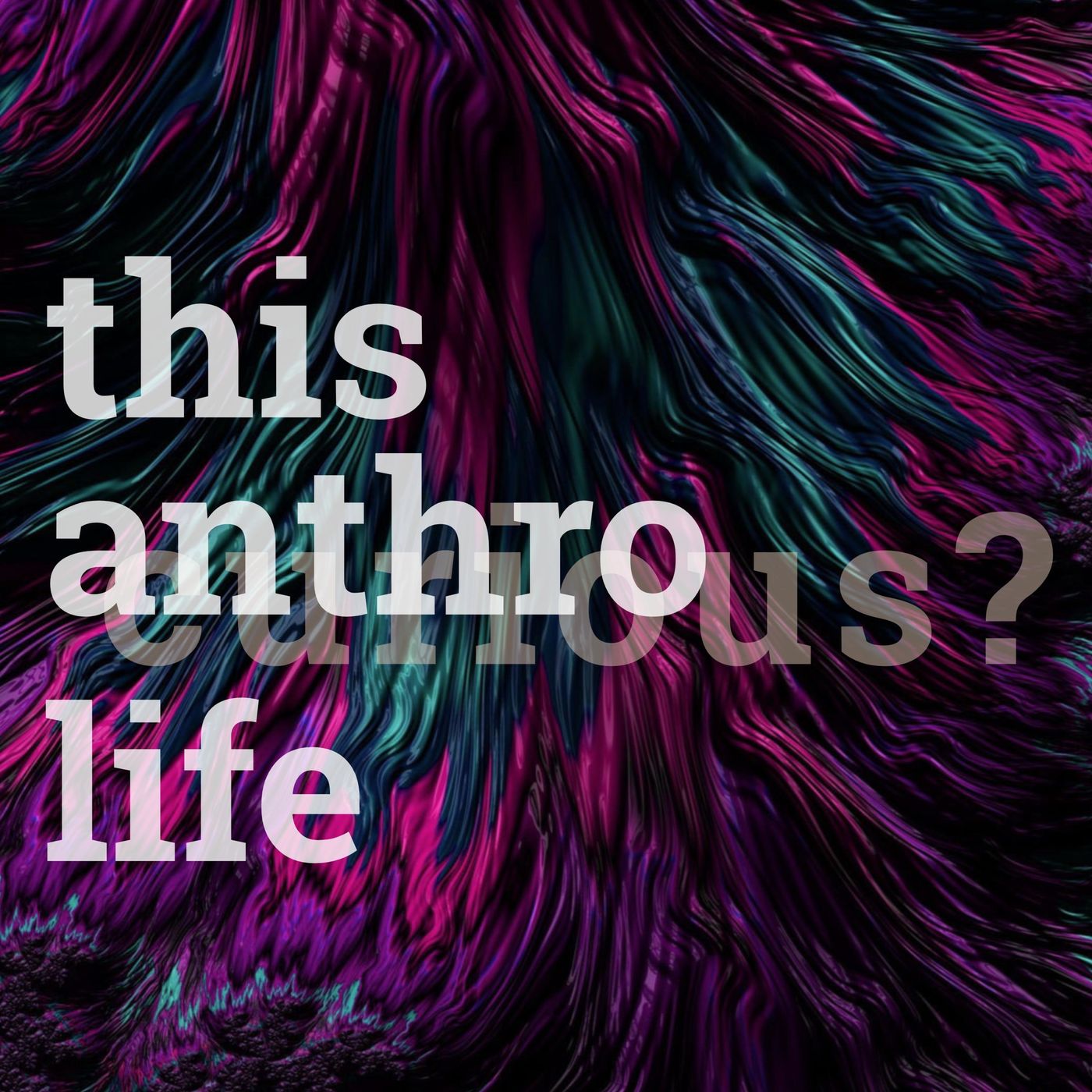
Business
Science
Anthrocurious, LLC
This Anthro Life is the premiere go-to Anthropology Podcast that fuses human insights with cultural storytelling. We equip you with a deep understanding of the human experience to revolutionize your decision-making strategies and social impact. Head over to https://www.thisanthrolife.org to learn more. Spearheaded by acclaimed Anthropologist Dr. Adam Gamwell, This Anthro Life equips leaders, individuals, and organizations to shape a more compassionate future. We aim to broaden perspectives and fortify decision-making skills by fostering a profound understanding of culture coupled with the transformative power of storytelling. With curated conversations and thought-provoking discussions featuring humanity's top makers and minds, prepare to have your perspective transformed. This Anthro Life delves into various facets of human society—from examining the complexities of cultural identity to understanding the influence of technology on our everyday lives.🌍 Change Your PerspectiveExplore the complexities of life in a simple and engaging way. From AI and robotics revolutionizing the nature of work to emojis changing how we communicate, we delve into the forces shaping our world. No topic is off-limits—fossil fuels and their impact on our planet, the race to find alternative energy solutions, and so much more.🎙️ Captivating ConversationsGo beyond surface-level discussions with deep dives into fascinating topics. Dr. Adam Gamwell's interviews are thought-provoking, enlightening, and always entertaining. Carefully crafted questions ensure engaging conversations that are free from jargon, making them accessible to listeners of all backgrounds.✨ Key TakeawaysGain valuable insights from each episode that you can apply to your own life. Discussing wisdom gained from the edges of society, we extract impactful quotes and actionable ideas from our guests. Expand your horizons and develop a fresh perspective on the challenges we face as individuals and as a global community.🔊 Join the Community on SubstackSubscribe to "This Anthro Life" now for a weekly dose of eye-opening conversations. Share the podcast with friends and family who crave intellectual stimulation and diverse discussions. Be a part of the movement to change how we approach design, culture, business, and technology. Beyond offering an engaging outlook on human experiences, This Anthro Life lends its anthropological expertise to businesses, organizations, and individuals. We help them navigate challenges with effective communication techniques and innovative problem-solving strategies rooted in a nuanced understanding of human behavior and social structures. Get in touch.Join us on this captivating voyage of storytelling at the crossroads of culture, design, technology and business. We're excited to collaborate with you in shaping a more compassionate world through an enriched narrative of the human experience. Experience breakthrough perspectives on human experiences and come away equipped to make enriched decisions that contribute positively to your sphere. Join us as we shape a more connected, hopeful narrative - one human story at a time.
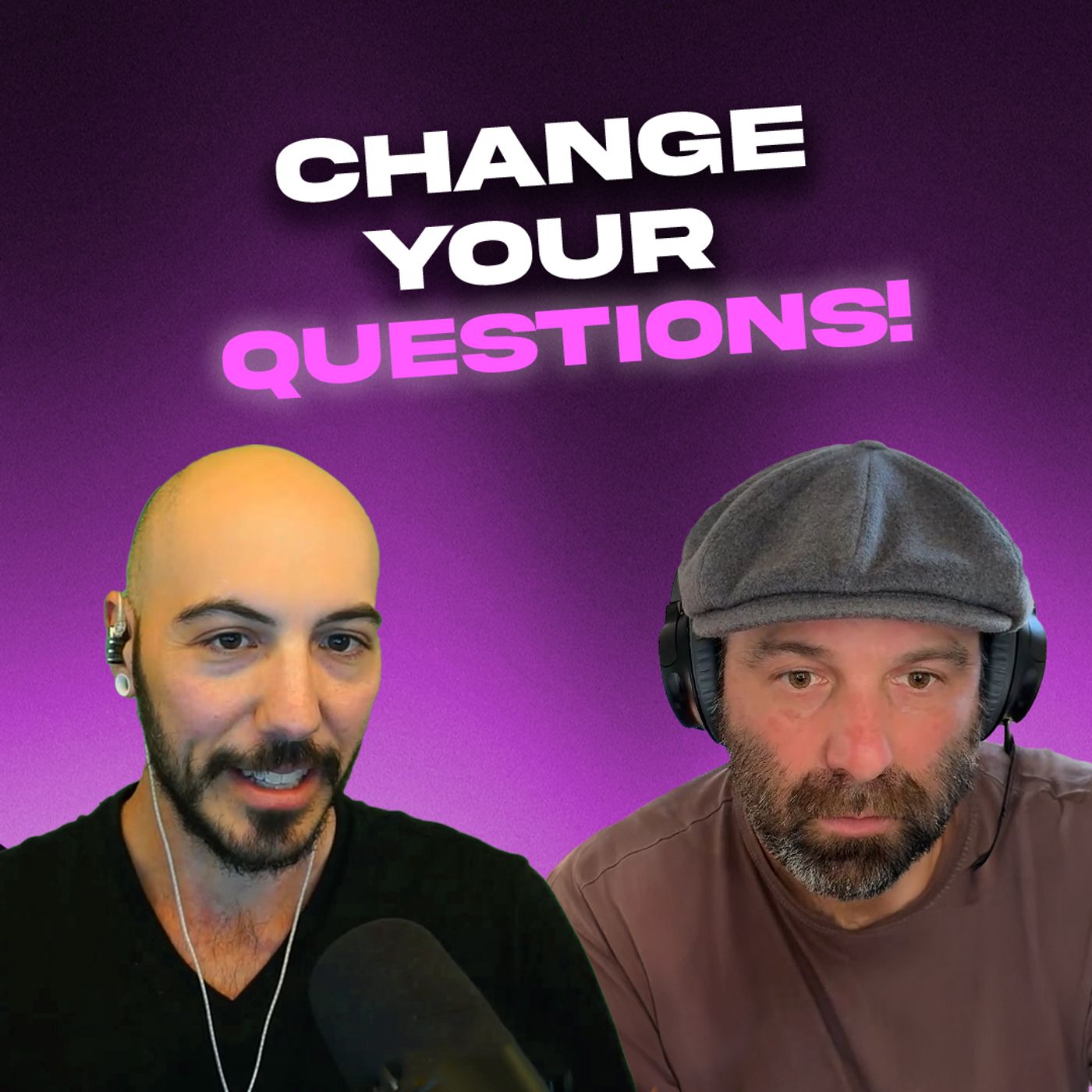
Transform Your Life by Asking Better Questions
Have you ever thought about the power of questions in shaping your relationships? In this episode of This Anthro Life, we explore how Emmy-winning filmmaker Topaz Adizes uses questions to create connection, trust, and clarity in relationships. From reframing daily thoughts to navigating life’s challenges, learn how asking better questions can transform the way you interact with the world.Discover how focusing on the right questions can unlock deeper conversations, foster empathy, and inspire personal growth. Don’t miss this insightful conversation on the transformative power of questions.
01:01:1019/11/2024

Stop Chasing Goals – Do THIS Instead
Hey everyone! In this episode of This Anthro Life, I’m thrilled to sit down with Dr. Anne-Laure Le Cunff, neuroscientist, founder of Nest Labs, and author of Tiny Experiments: How to Live Freely in a Goal-Obsessed World. We dive into why our approach to goals is broken, how procrastination might actually be trying to help us, and the surprising power of tiny experiments to transform your life. It’s a conversation packed with insights on rethinking success, embracing a cyclical mindset, and finding joy in the present.We're back! After some time away, This Anthro Life returns with fresh episodes and engaging conversations. If you enjoy this episode, we’d love your support.
49:4511/11/2024

Design for the Future: Ethics, Evolution, and Anthropology with Michael Leube
In this episode of This Anthro Life, host Adam Gamwell talks with anthropologist and design educator Michael Leube about how design, ethics, and anthropology intersect to shape the future of human behavior and culture. They dive deep into how design influences human decision-making, the role of evolutionary theory in design thinking, and the ethical responsibility of designers to consider sustainability and long-term consequences. Leube shares insights from his book The Future Designer, exploring topics like planned obsolescence, behavioral design, and the power of making sustainability both convenient and desirable.I'm Adam Gamwell, a cultural anthropologist and award-winning media creator, specializing in human-centered storytelling and experience design. With a background spanning startups, nonprofits, and global organizations, I apply anthropological insights to drive sustainable design solutions, ethical innovation, and business success. You can learn more about my work and get in touch for future projects through my website: https://www.anthrocurious.com/.About Michael Leube:Learn more about Michael Leube: https://anthropologylens.com/The Future Designer: https://books.google.com.ar/books/about/The_Future_Designer.html?id=KWIHEQAAQBAJ&source=kp_book_description&redir_esc=yAbout This Anthro Life: This Anthro Life is a thought-provoking podcast that explores the human side of design, culture, and business. Join us as we connect the dots between anthropology, technology, and the creative industries. Tune in to https://thisanthrolife.org and subscribe to our Substack at https://thisanthrolife.substack.com for more captivating episodes and engaging content.Follow This Anthro Life:LinkedIn: https://www.linkedin.com/company/this-anthro-life/Website: https://www.thisanthrolife.org/Substack: https://thisanthrolife.substack.com/Facebook: https://www.facebook.com/thisanthrolifeInstagram: https://www.instagram.com/thisanthrolife/
01:11:1907/10/2024
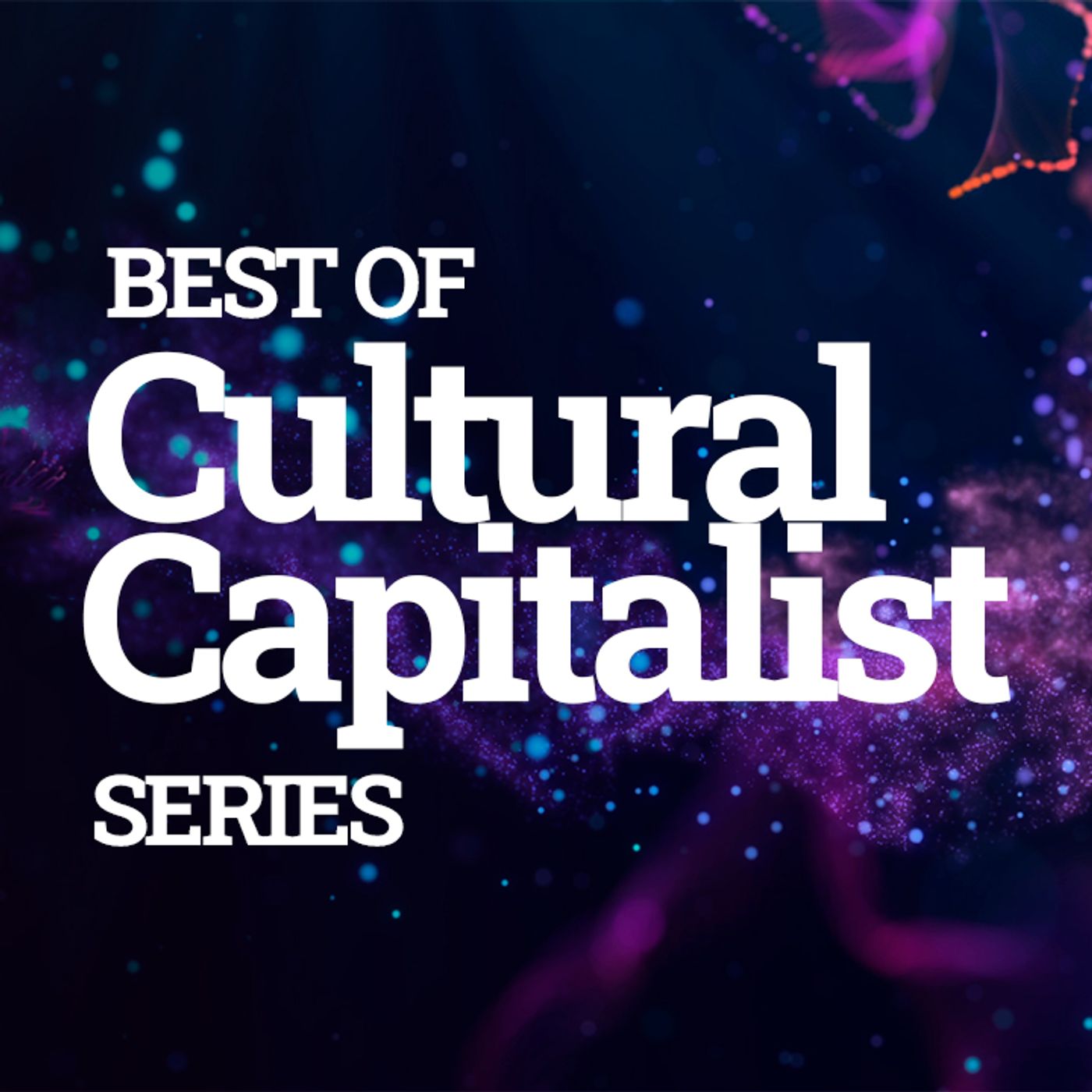
Best of Cultural Capitalist series
Today, we’re excited to bring you something a little different. Recently, we've been sharing a lot of episodes and shorts inspired by the work I’ve been doing alongside my colleague, Phil Searles, for Cultural Capitalist. In this special episode, we’ve compiled a "best of" collection, featuring full episode highlights and impactful quotes that have resonated with our audience and shifted their perspectives.We’ve selected key concepts that stood out to us and brought them together to showcase how these ideas intersect and build on one another. We hope you enjoy this curated episode, highlighting some of our most thought-provoking content.Full Episodes Included:What Makes Apple, Apple? The Michigan Wolverines Cultural Advantage The Value of Anthropology to Tech Investors About This Anthro Life This Anthro Life is a podcast that delves into the human side of technology, culture, and business. We explore captivating stories and connect them to the bigger picture of our lives.For more thought-provoking episodes and content, visit thisanthrolife.org and subscribe to our Substack at thisanthrolife.substack.com. To know more about the work of This Anthro Life host Adam Gamwell, visit anthrocurious.com.Follow This Anthro Life: Website: thisanthrolife.orgSubstack: thisanthrolife.substack.com Twitter: @thisanthrolifeInstagram: @thisanthrolife
08:3428/09/2024
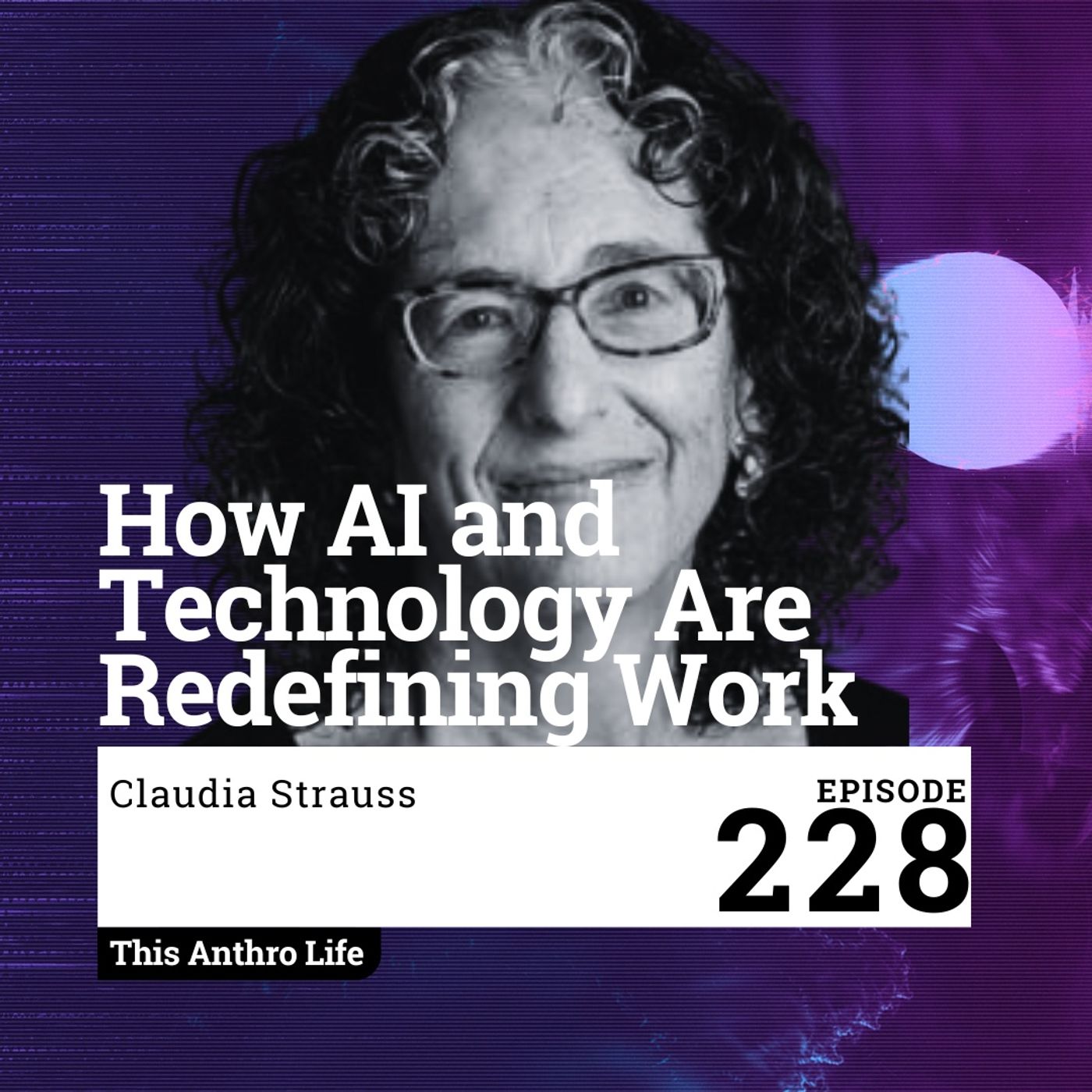
How AI and Technology Are Redefining Work in the Post-Pandemic World with Claudia Strauss
In this episode of This Anthro Life, host Adam Gamwell talks with anthropologist Claudia Strauss about how #AI, #technology, and the #postpandemic world are reshaping the nature of work in America. They explore crucial topics such as the impact of declining birth rates, an aging population, and restrictive immigration policies on labor markets. Drawing from Strauss’s book, What Work Means Beyond the Puritan Work Ethic, they discuss changing worker attitudes, the rise of #remotework and the #gigeconomy, and challenge the conventional narratives around the #workethic. Together, they delve into how anthropology provides unique insights into #workplaceculture, the human side of technology, and the evolving definition of a "good job" in the modern economy.I'm Adam Gamwell as a cultural anthropologist and award-winning media creator, I specialize in storytelling. My diverse background spans startups, nonprofits, cultural organizations, and Fortune 1000 companies, focusing on applied strategy, experience design, and human insights. My approach blends experiential research, like engaging with Peruvian quinoa farmers for climate change initiatives, with cutting-edge tools like AI and trends foresight. By leveraging big data alongside traditional ethnography, I align human needs with business goals, ensuring projects resonate profoundly.About Claudia Strauss:https://www.claudiastrauss.org/ https://www.pitzer.edu/faculty-staff-directory/claudia-strauss https://soundcloud.com/1869thecuppodcast/1869-ep-150-claudia-strauss https://www.linkedin.com/in/claudia-strauss-94723835/ https://btlonline.org/author-asks-do-we-work-to-live-or-live-to-work/ About This Anthro LifeThis Anthro Life is a thought-provoking podcast that explores the human side of technology, culture, and business. We unravel fascinating narratives and connect them to the wider context of our lives. Tune in to https://thisanthrolife.org and subscribe to our Substack at https://thisanthrolife.substack.com for more captivating episodes and engaging content.Follow This Anthro Life:https://www.linkedin.com/company/this-anthro-life/https://www.thisanthrolife.org/ https://thisanthrolife.substack.com/ https://www.facebook.com/thisanthrolife https://www.instagram.com/thisanthrolife/
01:09:2719/09/2024
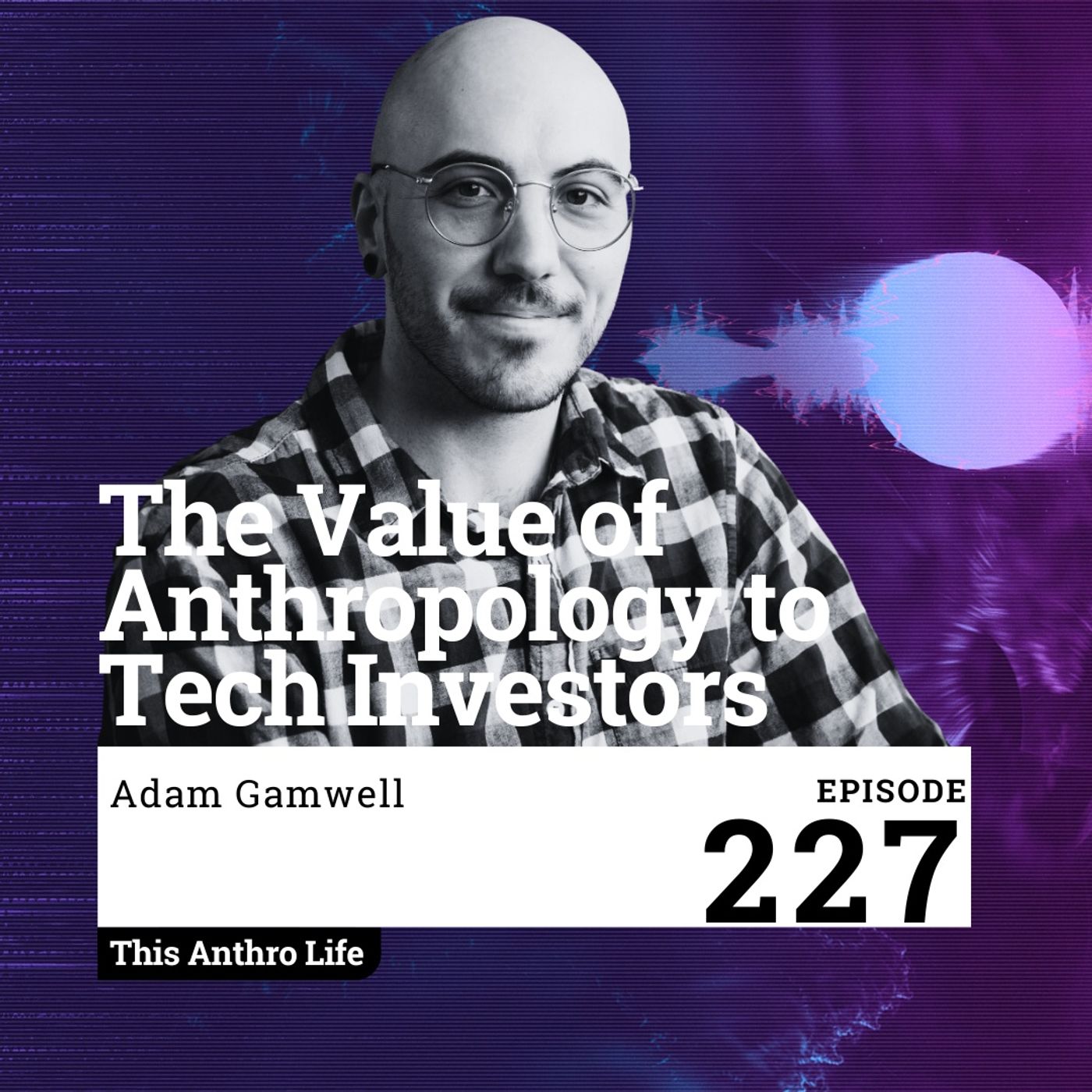
The Value of Anthropology to Tech Investors
In this episode of This Anthro Life, we’ll dive into how anthropology is reshaping tech investment by examining human culture and its influence on innovation. You'll discover how the deep study of culture helps forecast market trends, understand AI (artificial intelligence) and its cultural implications, and inform smarter investment decisions. We’ll explore why private equity firms are hiring anthropologists and why venture capital should follow suit. With insights into consumer behavior, organizational dynamics, and cultural change, this episode delves into how ESG (Environmental, Social, and Governance) strategies are influenced by anthropological intelligence. We also cover the role of business strategy in navigating today’s technological landscape, exploring how cultural anthropology can reveal the symbolic value and market intelligence that form a company’s cultural moat. Featuring renowned anthropologists Genevieve Bell and Gillian Tett, we uncover why cultural intelligence is essential in our fast-evolving world.I'm Adam Gamwell as a cultural anthropologist and award-winning media creator, I specialize in storytelling. My diverse background spans startups, nonprofits, cultural organizations, and Fortune 1000 companies, focusing on applied strategy, experience design, and human insights. My approach blends experiential research, like engaging with Peruvian quinoa farmers for climate change initiatives, with cutting-edge tools like AI and trends foresight. By leveraging big data alongside traditional ethnography, I align human needs with business goals, ensuring projects resonate profoundly.About This Anthro LifeThis Anthro Life is a thought-provoking podcast that explores the human side of technology, culture, and business. We unravel fascinating narratives and connect them to the wider context of our lives. Tune in to https://thisanthrolife.org and subscribe to our Substack at https://thisanthrolife.substack.com for more captivating episodes and engaging content.Follow This Anthro Life:https://www.linkedin.com/company/this-anthro-life/ https://www.thisanthrolife.org/ https://thisanthrolife.substack.com/ https://www.facebook.com/thisanthrolife https://www.instagram.com/thisanthrolife/ Culture Capitalisthttps://culturecapitalist.substack.com/
05:3513/09/2024
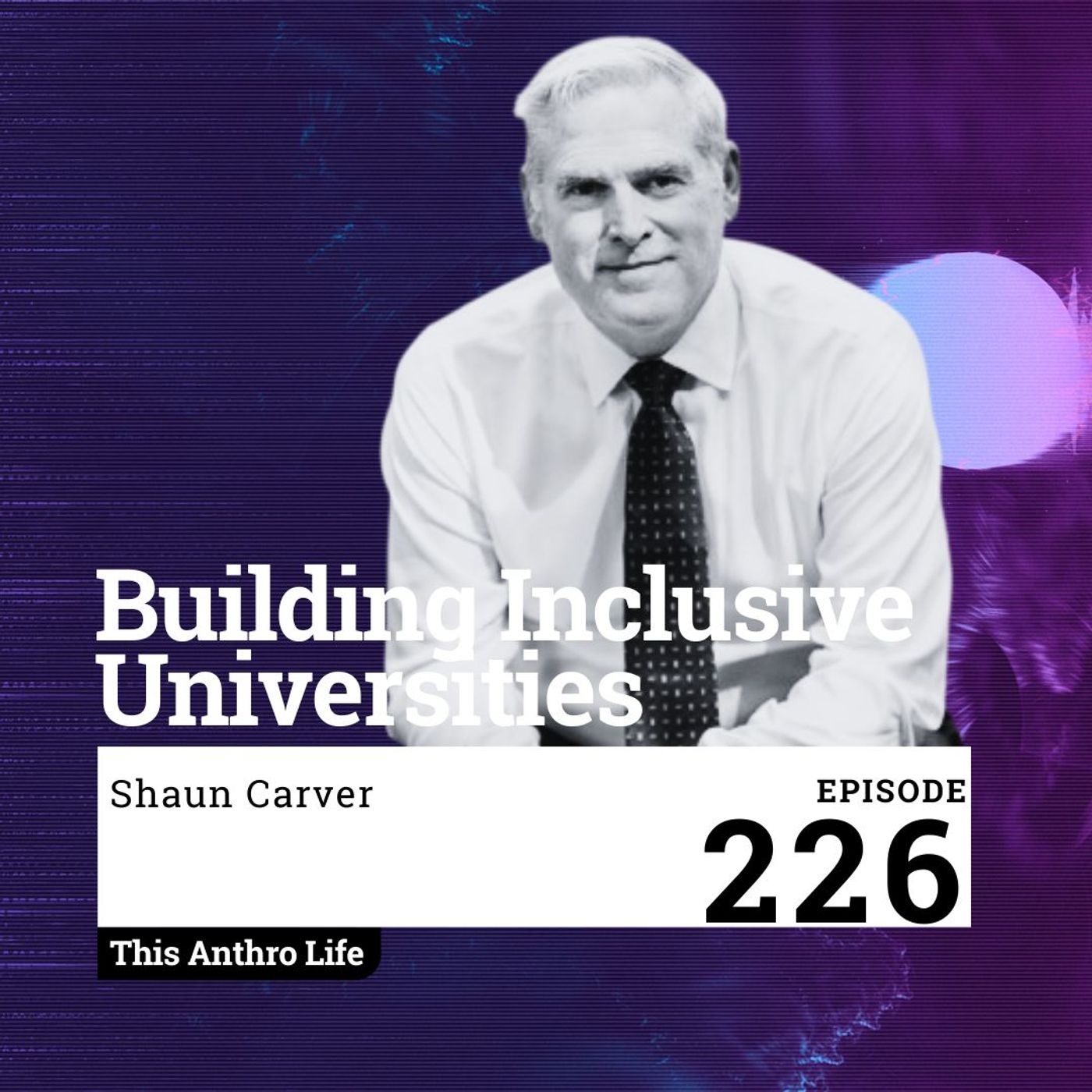
Building Inclusive Universities: Lessons from Shaun Carver
Join us in this dynamic episode of This Anthro Life as we sit down with Shaun Carver, CEO of International House at UC Berkeley, to explore the art of building inclusive and vibrant campus communities. Dive into the rich history and transformative impact of I House, where fostering intercultural connections goes hand in hand with managing cultural diversity and navigating today's politically polarized landscape. Learn how promoting civil discourse, embracing free speech, and implementing inclusive policies can help create a thriving educational environment in a rapidly changing world. I'm Adam Gamwell as a cultural anthropologist and award-winning media creator, I specialize in storytelling. My diverse background spans startups, nonprofits, cultural organizations, and Fortune 1000 companies, focusing on applied strategy, experience design, and human insights. My approach blends experiential research, like engaging with Peruvian quinoa farmers for climate change initiatives, with cutting-edge tools like AI and trends foresight. By leveraging big data alongside traditional ethnography, I align human needs with business goals, ensuring projects resonate profoundly.Keywords: Community, Higher Education, Inclusivity, Diversity, I-House, International Students, Civility, Free Speech, Political Polarization, Conflict Resolution, Cultural Exchange, Nonprofit Organization, Student Housing, Intercultural Understanding, Global Education, Historical Context, Academic Environment, Global Community, Student Protests, Mental Health, Critical Thinking, Social Responsibility, Adaptive Learning, AnthropologyAbout Shaun Carverhttps://ihouse.berkeley.edu/ https://twitter.com/ihouseberkeley https://www.instagram.com/ihouseberkeley/ https://www.linkedin.com/company/international-house-at-uc-berkeley/ About This Anthro LifeThis Anthro Life is a thought-provoking podcast that explores the human side of technology, culture, and business. We unravel fascinating narratives and connect them to the wider context of our lives.Tune in to https://thisanthrolife.org and subscribe to our Substack at https://thisanthrolife.substack.com for more captivating episodes and engaging content. Follow This Anthro Life:https://www.linkedin.com/company/this-anthro-life/ https://www.thisanthrolife.org/ https://thisanthrolife.substack.com/ https://www.facebook.com/thisanthrolife/https://www.instagram.com/thisanthrolife/
01:10:1905/09/2024
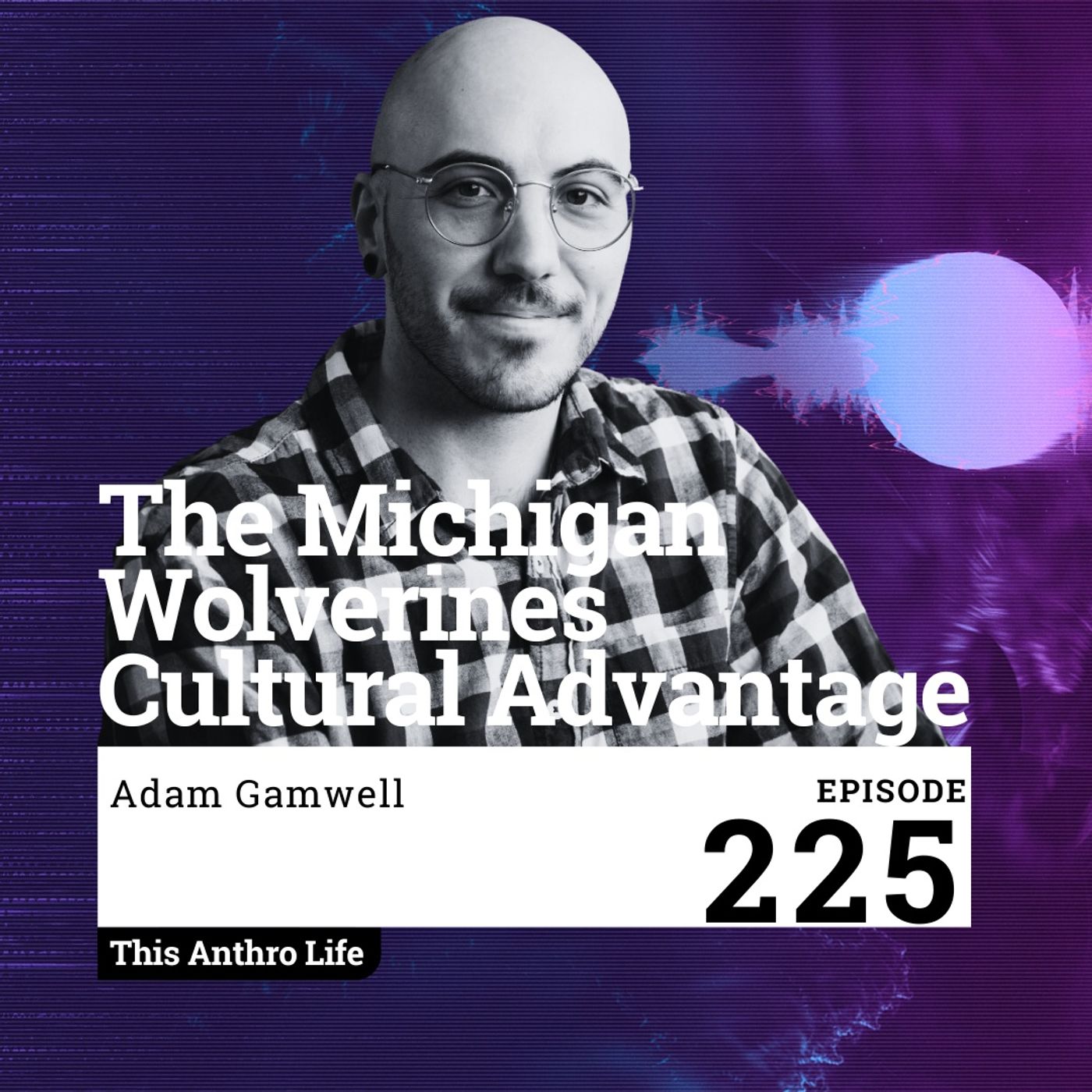
The Michigan Wolverines Cultural Advantage
Discover what sets the Michigan Wolverines apart in college football. In this episode of This Anthro Life, host Adam Gamwell explores the innovative cultural strategies implemented by head coach Jim Harbaugh that led to the Wolverines' 2024 National Championship victory. Learn how a player-led culture, distributed leadership, and sustainable success through cultural strengths created a resilient and dominant team. I'm Adam Gamwell as a cultural anthropologist and award-winning media creator, I specialize in storytelling. My diverse background spans startups, nonprofits, cultural organizations, and Fortune 1000 companies, focusing on applied strategy, experience design, and human insights. My approach blends experiential research, like engaging with Peruvian quinoa farmers for climate change initiatives, with cutting-edge tools like AI and trends foresight. By leveraging big data alongside traditional ethnography, I align human needs with business goals, ensuring projects resonate profoundly.Keywords: Michigan Wolverines, 2024 National Championship, College Football, Cultural Shift, Leadership Transitions, Player-led Culture, Distributed Leadership, Cultural Strategy, Team Culture, Player Empowerment, Sustainable Success, Anthropological Methods, Cultural Strengths, Adaptive Cultural LeadershipAbout This Anthro LifeThis Anthro Life is a thought-provoking podcast that explores the human side of technology, culture, and business. We unravel fascinating narratives and connect them to the wider context of our lives.Tune in to https://thisanthrolife.org and subscribe to our Substack at https://thisanthrolife.substack.com for more captivating episodes and engaging content.Follow This Anthro Life:https://www.linkedin.com/company/this-anthro-life/https://www.thisanthrolife.org/https://thisanthrolife.substack.com/https://www.facebook.com/thisanthrolifehttps://www.instagram.com/thisanthrolife/
05:5830/08/2024
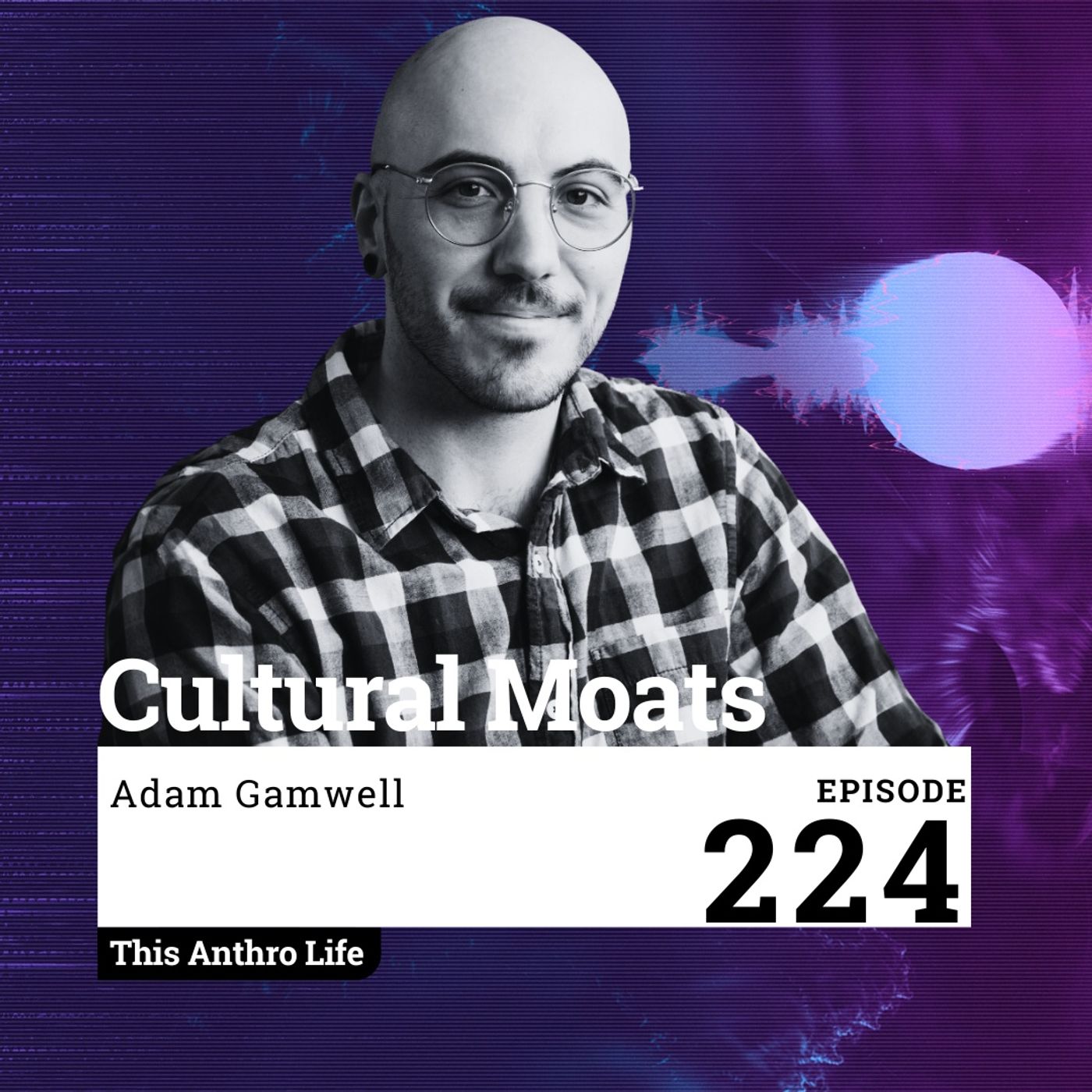
Cultural Moats
In this episode of This AnthroLife, host Adam Gamwell dives deep into the concept of "cultural moats" and how tech giants like Apple leverage design, technology, and cultural influence to cultivate an intensely loyal customer base. Adam examines the subtle yet powerful symbols Apple uses. This strategy preserves Apple's unique cultural identity while sparking a competitive race among tech companies to replicate the blue bubble experience on Android. The episode also introduces semiotics—the study of symbols—and its critical role in business and marketing, illustrating how cultural symbols like Apple's evolve and shape consumer behavior.I'm Adam Gamwell as a cultural anthropologist and award-winning media creator, I specialize in storytelling. My diverse background spans startups, nonprofits, cultural organizations, and Fortune 1000 companies, focusing on applied strategy, experience design, and human insights. My approach blends experiential research, like engaging with Peruvian quinoa farmers for climate change initiatives, with cutting-edge tools like AI and trends foresight. By leveraging big data alongside traditional ethnography, I align human needs with business goals, ensuring projects resonate profoundly.Keywords: Cultural Moat, Apple, Android, User Experience, Symbolic Ecosystem, Integrated Technology, Loyal Customers, Brand Loyalty, Psychology of Branding, Tech Innovation, Apple Ecosystem, Rich Communication Services (RCS), Design Choices, Technology and Culture, Apple Messages, Antitrust Investigation, Semiotics, Symbolic Communication.About This Anthro Life This Anthro Life is a thought-provoking podcast that explores the human side of technology, culture, and business. We unravel fascinating narratives and connect them to the wider context of our lives.Tune in to https://thisanthrolife.org and subscribe to our Substack at https://thisanthrolife.substack.com for more captivating episodes and engaging content.
08:5819/08/2024
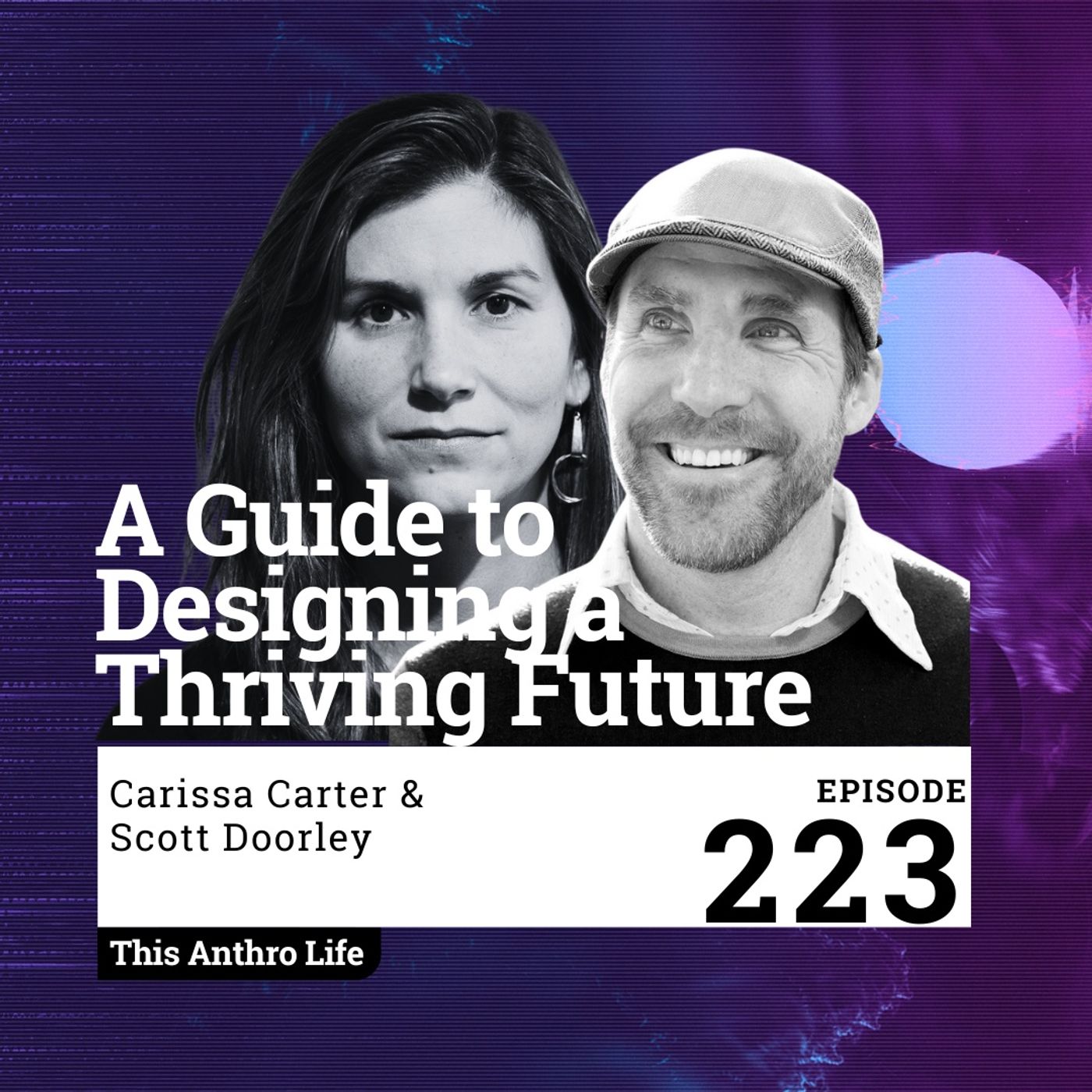
A Guide to Designing a Thriving Future with Carissa Carter & Scott Doorley
In this episode of Anthro Life host Adam engages in a fascinating discussion with Chris Carter, a geoscientist-turned-design-educator, and Scott Dorely, a filmmaker-turned-design-educator. They explore how design and anthropology intersect to shape the future.Key Topics:-Holistic Design & Speculative Fiction: Discover the valuable lessons from speculative stories like "On the Mammoth Step," focusing on the de-extinction of species and future design.-Emotional & Biomic Design: The importance of integrating emotional design and the interconnectedness of ecosystems with technology. Interdisciplinary Approaches: The necessity of combining different disciplines to tackle contemporary challenges. -Diversity in Storytelling: The critical role of diverse perspectives in creating more inclusive and innovative designs.-Emerging Technologies: The discussion covers the real-world implications of AI and algorithms, and the potential unintended consequences they may bring. Chris and Scott highlight the importance of humility and relational understanding in design work.I'm Adam Gamwell as a cultural anthropologist and award-winning media creator, I specialize in storytelling. My diverse background spans startups, nonprofits, cultural organizations, and Fortune 1000 companies, focusing on applied strategy, experience design, and human insights. My approach blends experiential research, like engaging with Peruvian quinoa farmers for climate change initiatives, with cutting-edge tools like AI and trends foresight. By leveraging big data alongside traditional ethnography, I align human needs with business goals, ensuring projects resonate profoundly. Keywords: Design, Anthropology, Speculative Fiction, Future Design, Holistic Design, Interdisciplinary Approaches, Emotional Design, Biomic Design, Emerging Technologies, AI and Algorithms, Diversity in Storytelling, Innovation, Complex Systems, Cross-Cultural Communication, Human-Centered Design, Future of DesignAbout Carissa Carterhttps://www.linkedin.com/in/carissalcarter/https://x.com/snowflyzonehttps://www.snowflyzone.com/About Scott Doorleyhttps://x.com/scottdoorleyhttps://www.linkedin.com/in/scottdoorley/ Follow This Anthro Life:https://www.linkedin.com/company/this-anthro-life/ https://www.thisanthrolife.org/ https://thisanthrolife.substack.com/ https://www.facebook.com/thisanthrolife https://www.instagram.com/thisanthrolife/
58:4127/07/2024
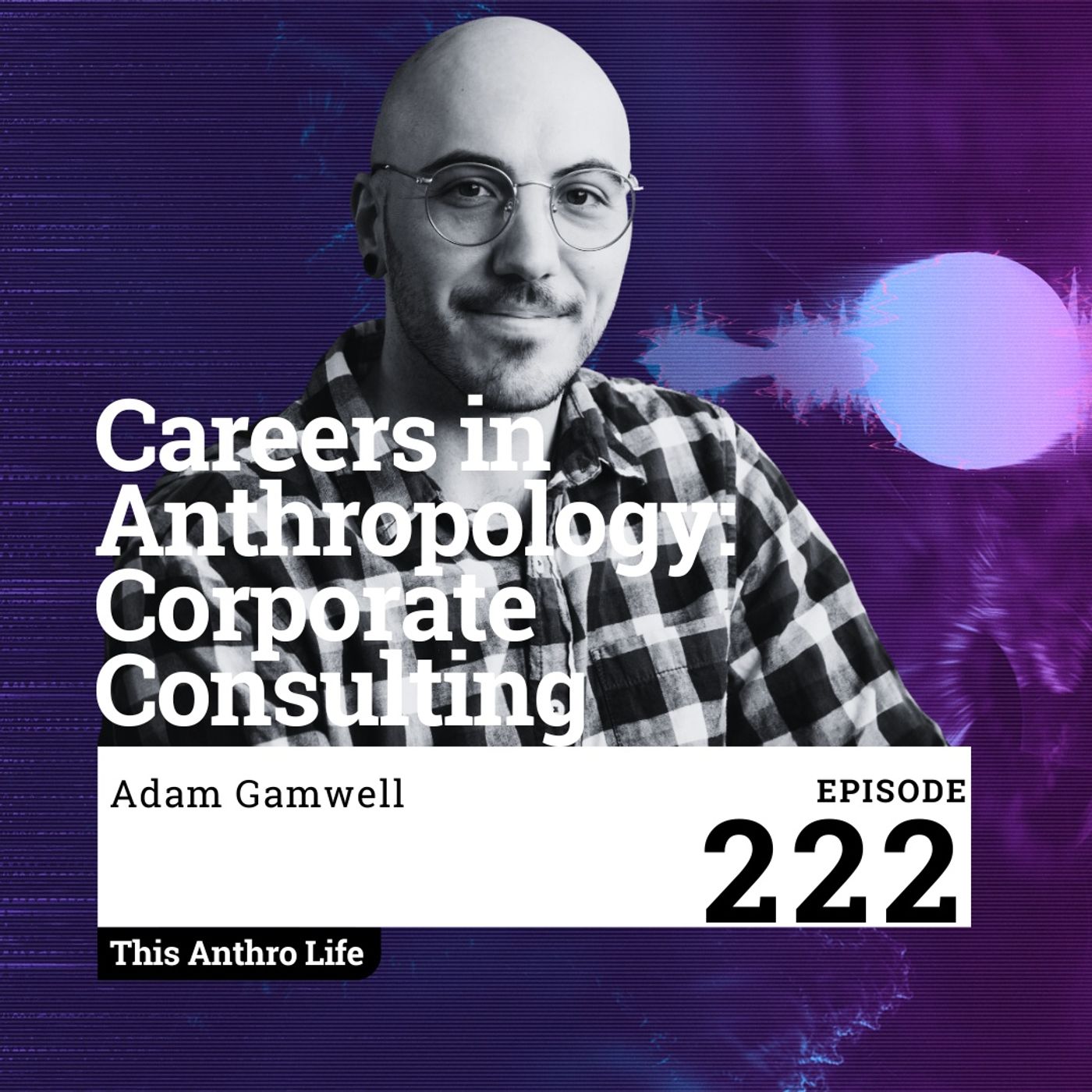
Careers in Anthropology: Corporate Consulting
Join me in a captivating new series on This Anthro Life as I explore the diverse career paths for anthropology graduates, emphasizing the immense value of anthropological skills in consulting roles. In this episode, "Careers in Anthropology: Corporate Consulting," I delve into the unique expertise we anthropologists offer—such as ethnographic research, qualitative data analysis, and cross-cultural communication. I'll examine specific consulting roles, including user research and design, change management, and diversity, equity, and inclusion (DEI).Tune in for actionable tips on developing hard skills, showcasing soft skills, and pursuing internships or projects to kickstart your consulting career. Gain valuable insights and resources to leverage your anthropology degree in the corporate world.I'm Adam Gamwell as a cultural anthropologist and award-winning media creator, I specialize in storytelling. My diverse background spans startups, nonprofits, cultural organizations, and Fortune 1000 companies, focusing on applied strategy, experience design, and human insights. My approach blends experiential research, like engaging with Peruvian quinoa farmers for climate change initiatives, with cutting-edge tools like AI and trends foresight. By leveraging big data alongside traditional ethnography, I align human needs with business goals, ensuring projects resonate profoundly.Keywords: Anthropology careers, Corporate consulting, Anthropological skills, Ethnographic research, Qualitative data analysis, Cross-cultural communication, User research and design, Change management, Diversity, Launching a consulting career, Anthropology degree, Consulting roles for anthropologists, Hard skills for consultants, Soft skills for consultants, Anthropology graduates, Career tips for anthropologists, Anthropology consultingAbout This Anthro Life This Anthro Life is a thought-provoking podcast that explores the human side of technology, culture, and business. We unravel fascinating narratives and connect them to the wider context of our lives. Tune in to https://thisanthrolife.org and subscribe to our Substack at https://thisanthrolife.substack.com for more captivating episodes and engaging content.Follow This Anthro Life:https://www.linkedin.com/company/this-anthro-life/ https://www.thisanthrolife.org/ https://thisanthrolife.substack.com/ https://www.facebook.com/thisanthrolife https://www.instagram.com/thisanthrolife/
07:4211/07/2024
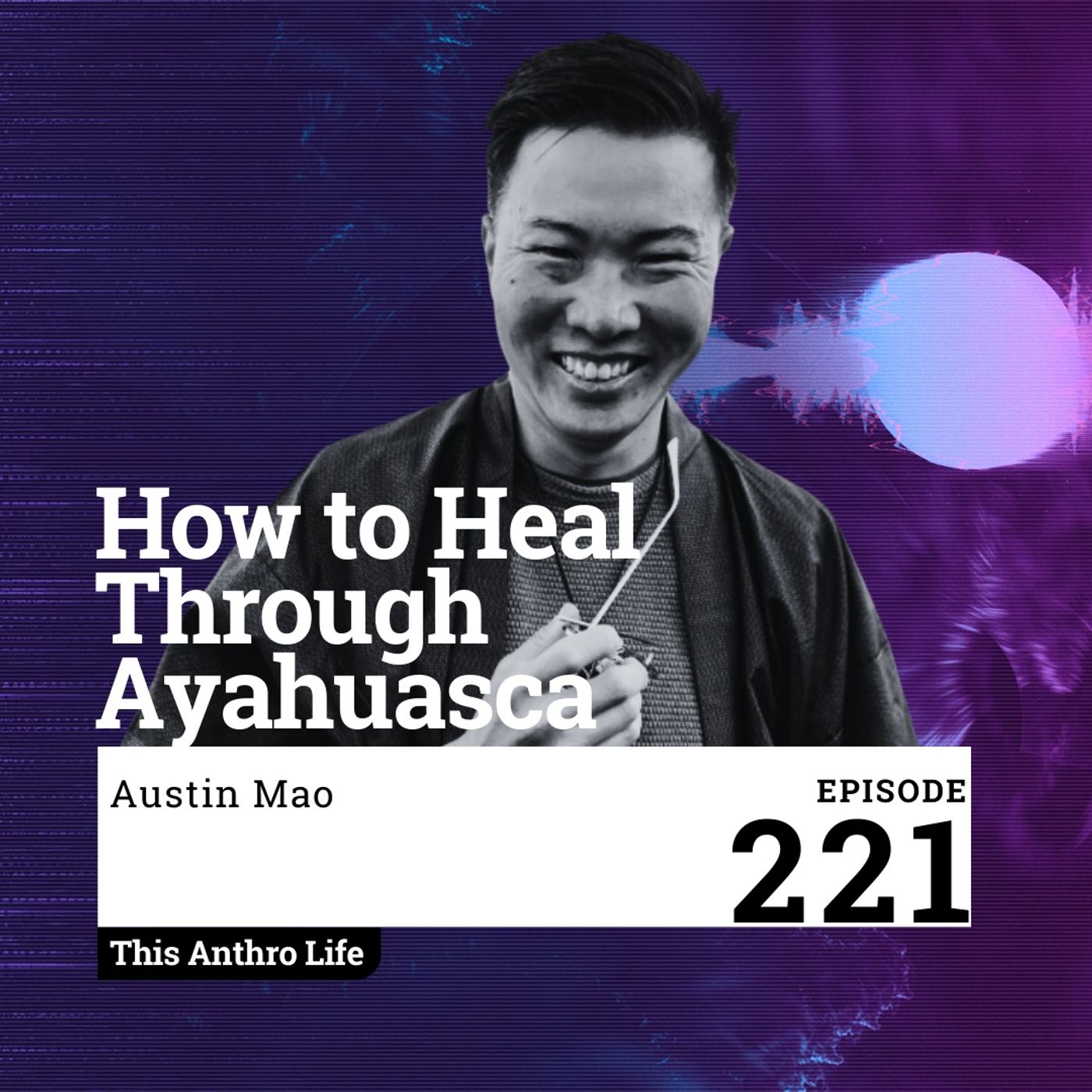
How to Heal Through Ayahuasca with Austin Mao
Join us on "This Anthro Life" podcast for an enlightening episode titled "How to Heal Through Ayahuasca" with special guest Austin Mao, co-founder of Ceremonia and entrepreneur. Dive into the resurgence of psychedelic therapies and modern spiritual practices as Austin shares his journey from tech entrepreneurship to founding an entheogenic church. Explore the history and transformative impact of ayahuasca therapy on mental health and personal growth, and learn about the powerful healing potential of psychedelics. Discover the importance of connection and the process of achieving wholeness, nothingness, and oneness as Austin delves into the convergence of ancient wisdom and contemporary science. Don't miss this thought-provoking discussion that bridges science and spirituality, revealing modern pathways to enlightenment.I'm Adam Gamwell as a cultural anthropologist and award-winning media creator, I specialize in storytelling. My diverse background spans startups, nonprofits, cultural organizations, and Fortune 1000 companies, focusing on applied strategy, experience design, and human insights. My approach blends experiential research, like engaging with Peruvian quinoa farmers for climate change initiatives, with cutting-edge tools like AI and trends foresight. By leveraging big data alongside traditional ethnography, I align human needs with business goals, ensuring projects resonate profoundly.Keywords: entrepreneur, psychedelic, therapies, modern spiritual practices, tech entrepreneurship, entheogenic church, ayahuasca therapy, mental health, personal growth, healing potential of psychedelics, connection, wholeness, nothingness, oneness, ancient wisdom, contemporary science, science and spirituality, pathways to enlightenment, healing, enlightenment, Burning Man, connection and ceremony, vulnerability, healthy expression of anger, spiritual spacesAbout This Anthro LifeThis Anthro Life is a thought-provoking podcast that explores the human side of technology, culture, and business. We unravel fascinating narratives and connect them to the wider context of our lives. Tune in to https://thisanthrolife.org and subscribe to our Substack at https://thisanthrolife.substack.com for more captivating episodes and engaging content.Follow Austin Maohttps://www.ceremoniacircle.org/https://www.instagram.com/ceremoniacircle/https://www.facebook.com/ceremoniacirclehttps://www.youtube.com/@ceremoniacircleFollow This Anthro Life:https://www.linkedin.com/company/this-anthro-life/https://www.thisanthrolife.org/https://thisanthrolife.substack.com/https://www.facebook.com/thisanthrolifehttps://www.instagram.com/thisanthrolife/
01:01:3004/07/2024
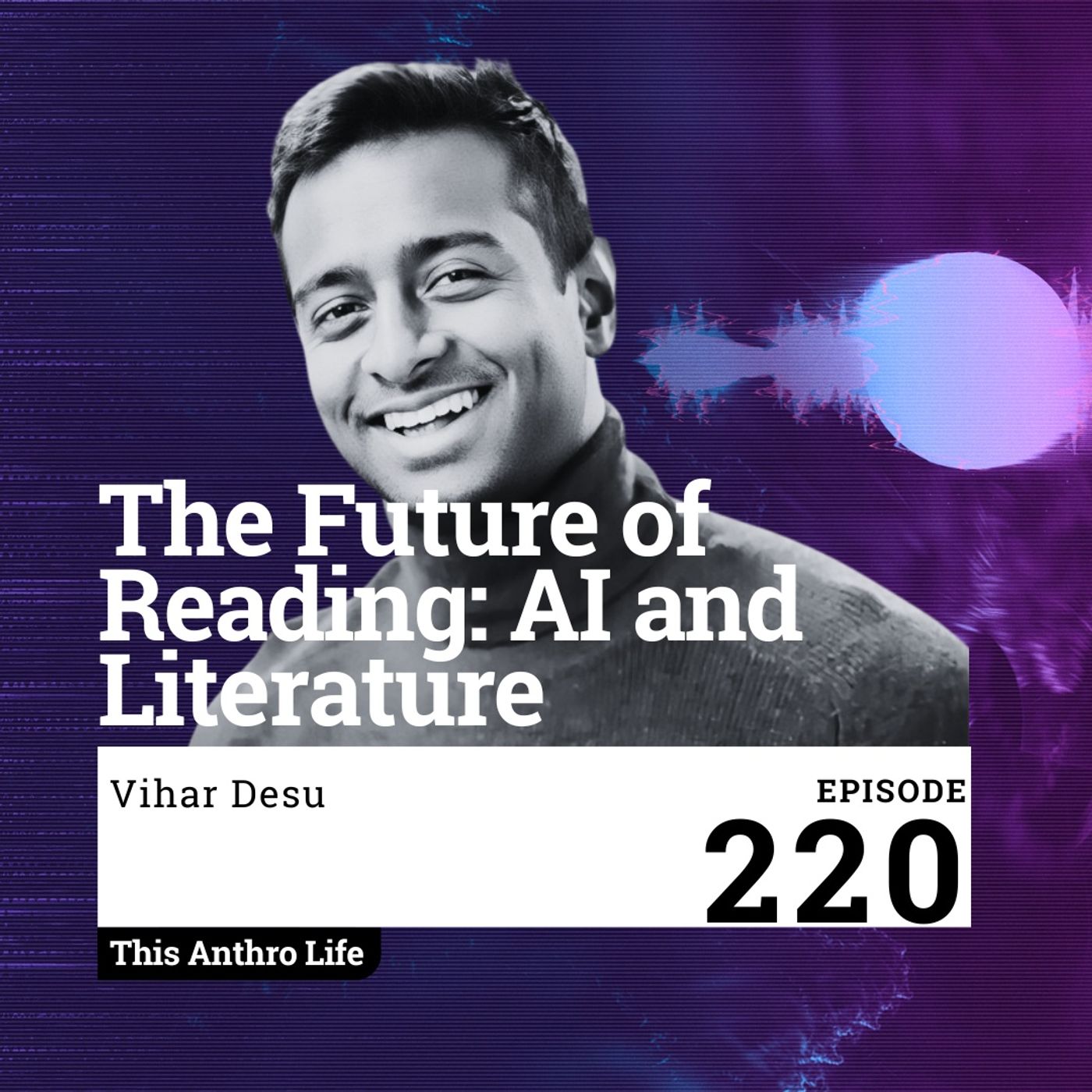
The Future of Reading: AI and Literature with Vihar Desu
Join us on This Anthro Life podcast for an engaging discussion on The Future of Reading: AI and Literature with Vihar Desu, an entrepreneur and engineer at Tempus and the creator of summaries.co. Vihar shares his expertise in cancer genomics and AI, revealing the technical intricacies of developing accurate summaries and the challenges and opportunities this presents. We delve into the cultural shifts emerging from new technologies and discuss the potential implications for authors and researchers.Discover how AI is transforming content consumption, enhancing research capabilities, and shaping the future of AI-search. Join us on This Anthro Life for a deeper understanding of the evolving landscape of literature and the exciting advancements at the intersection of technology and reading.About This Anthro LifeThis Anthro Life is a thought-provoking podcast that explores the human side of technology, culture, and business. We unravel fascinating narratives and connect them to the wider context of our lives. Tune in to https://thisanthrolife.org and subscribe to our Substack at https://thisanthrolife.substack.com for more captivating episodes and engaging content.Follow Vihar Desu https://www.linkedin.com/in/vihar-desuhttps://x.com/vihardesuhttps://www.summaries.co/https://www.tempus.com/Follow This Anthro Life:https://www.linkedin.com/company/this-anthro-life/https://www.thisanthrolife.org/https://thisanthrolife.substack.com/https://www.facebook.com/thisanthrolifehttps://www.instagram.com/thisanthrolife/
44:1927/06/2024
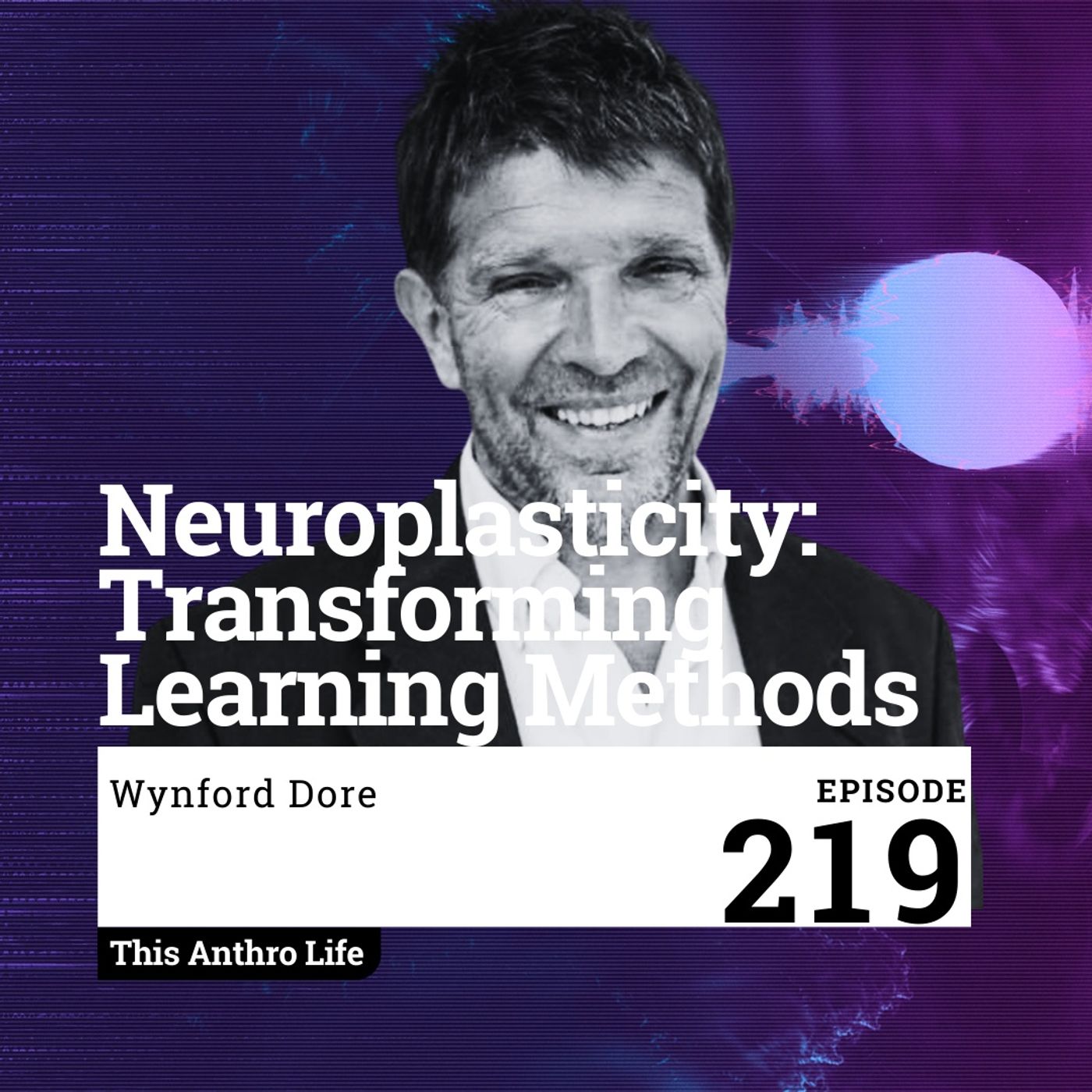
Neuroplasticity: Transforming Learning Methods with Wynford Dore
Join us on This Anthro Life podcast for an enlightening conversation with Wynford Dore, a pioneering researcher in neuroplasticity. I'm Adam, your host, and in this episode, we explore Wynford's transformative journey, driven by a personal family tragedy that sparked his mission to understand and enhance brain function.Discover the remarkable power of neuroplasticity, especially for individuals with learning challenges like dyslexia and ADHD. Winfred shares insights on the intersection of culture, technology, and the human brain, revealing how new research could revolutionize education, mental health, and human potential.Learn how we can all improve our cognitive abilities, resilience, and emotional strength at any age. This episode offers a deep dive into the future of learning, bridging gaps, and expanding minds to redefine education and support neurodiversity.Keywords: Neuroplasticity, dyslexia, ADHD, cognitive abilities, resilience, emotional strength, culture, technology, human brain, transformative journey, education, mental health, human potential, learning challenges, future of learning, bridging gaps, expanding minds, neurodiversity, anthropologyAbout This Anthro LifeThis Anthro Life is a thought-provoking podcast that explores the human side of technology, culture, and business. We unravel fascinating narratives and connect them to the wider context of our lives. Tune in to https://thisanthrolife.org and subscribe to our Substack at https://thisanthrolife.substack.com for more captivating episodes and engaging content.Contact Wyndford Dore:https://www.zingperformance.com/https://www.instagram.com/wynforddore/https://www.facebook.com/wynforddore/?locale=en_GBhttps://www.youtube.com/channel/UCYxZPxGNuyY1oM4YaIQo8Nghttps://www.linkedin.com/in/braindevelopment/Follow This Anthro Life:https://www.linkedin.com/company/this-anthro-life/https://www.thisanthrolife.org/https://thisanthrolife.substack.com/https://www.facebook.com/thisanthrolifehttps://www.instagram.com/thisanthrolife/
55:1520/06/2024
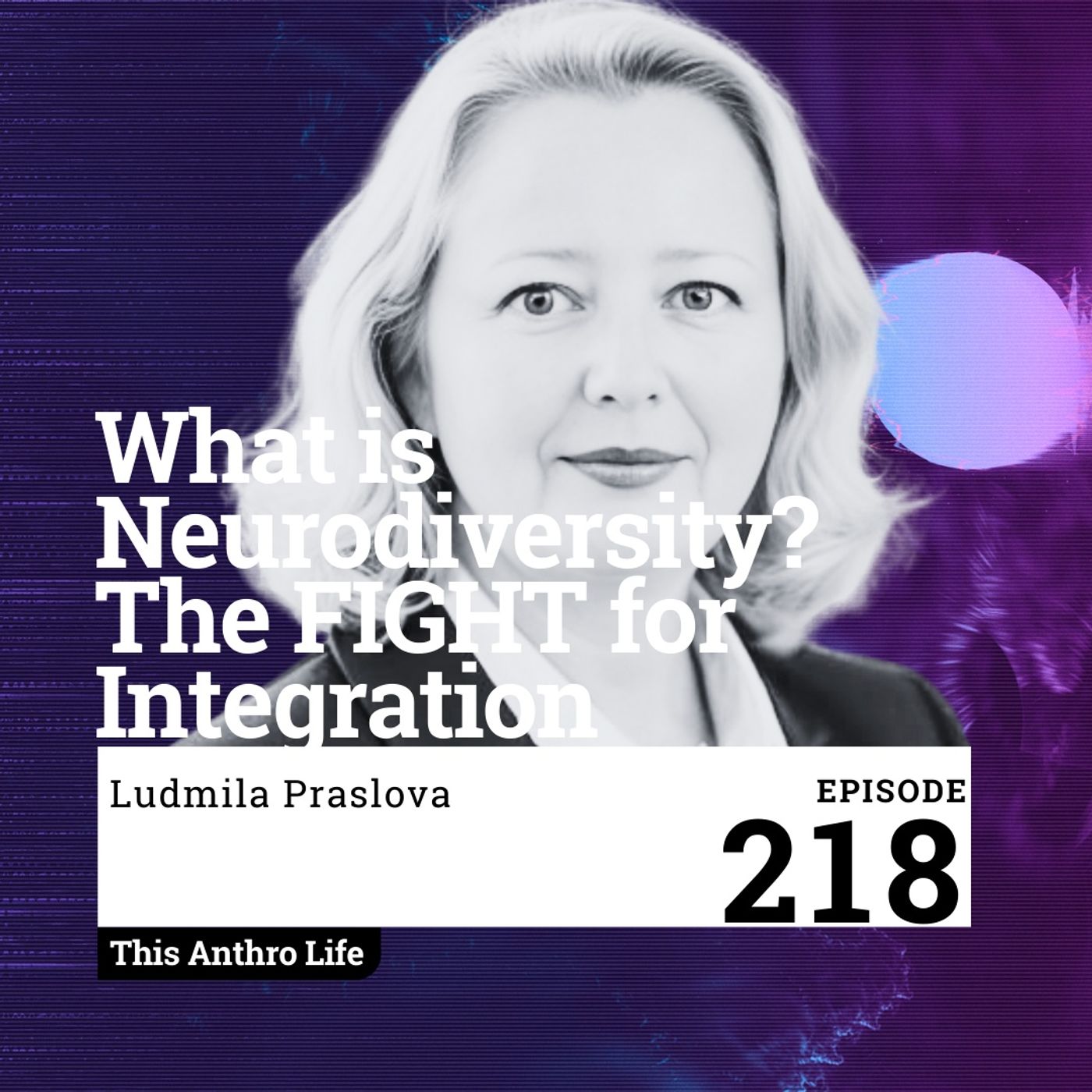
What is Neurodiversity? The FIGHT for Integration with Ludmila Praslova
Join us for a captivating conversation on neurodiversity in the workplace with Ludmila Praslova the author of 'The Canary Code.' I'm Adam, your host, and in this episode, we delve into the cultural and societal implications of neurodiversity, offering practical tools for leaders to foster inclusive work environments.We explore innovative strategies to embrace diverse talents, enhance intercultural relations, and promote psychological safety. Learn how customized job roles can boost creativity and productivity, benefiting both individuals and organizations.Whether you're an employee or a leader, discover actionable steps to champion neuroinclusion and reshape the future of work. This discussion highlights the importance of creating a workplace where everyone can thrive, emphasizing the value of diverse perspectives and experiences.Keywords: Neurodiversity, Cultural implications, Societal implications, Inclusive work environments, Practical tools for leaders, Diverse talents, Intercultural relations, Psychological safety, Customized job roles, Boost creativity, Enhance productivity, Employee tips, Leader strategies, Champion neuroinclusion, Future of work, Workplace diversity, Neuroinclusion strategies, AnthropologyAbout This Anthro Life This Anthro Life is a thought-provoking podcast that explores the human side of technology, culture, and business. We unravel fascinating narratives and connect them to the wider context of our lives. Tune in to https://thisanthrolife.org and subscribe to our Substack at https://thisanthrolife.substack.com for more captivating episodes and engaging content.Contact Ludmila Praslovahttps://www.linkedin.com/in/ludmila-praslova/https://thecanarycode.com/https://www.amazon.com/stores/Ludmila-N.-Praslova-PhD/author/B0CVG38WVDFollow This Anthro Life:https://www.linkedin.com/company/this-anthro-life/https://www.thisanthrolife.org/https://thisanthrolife.substack.com/https://www.facebook.com/thisanthrolifehttps://www.instagram.com/thisanthrolife/
01:02:0317/06/2024

Deconstructing Masculinity with Ruth Whippman.
Join us for a discussion on raising boys in today's world with a renowned journalist and author. I'm Adam, your host. In this episode, we explore masculinity, gender roles, and societal changes. Ruth Whippman explores the challenges of nurturing boys in today's society.We delve into topics like Me Too's effect on male socialization, emotional vulnerability, and empathy's role in nurturing well-rounded individuals. We discuss controversial topics, including the incel movement and Title IX systems.Learn the importance of encouraging in-person social interactions from a young age and helping boys navigate societal structures. The episode explores gender debates and highlights the need for open The Understanding how these dynamics impact boys today is crucial. Explore raising boys in a rapidly evolving society with us.I'm Adam Gamwell as a cultural anthropologist and award-winning media creator, I specialize in storytelling. My diverse background spans startups, nonprofits, cultural organizations, and Fortune 1000 companies, focusing on applied strategy, experience design, and human insights. My approach blends experiential research, like engaging with Peruvian quinoa farmers for climate change initiatives, with cutting-edge tools like AI and trends foresight. By leveraging big data alongside traditional ethnography, I align human needs with business goals, ensuring projects resonate profoundly.Contact Ruth Whippmanhttps://www.ruthwhippman.com/https://twitter.com/ruthwhippman?lang=enhttps://www.instagram.com/ruthwhippman/
01:14:0606/06/2024
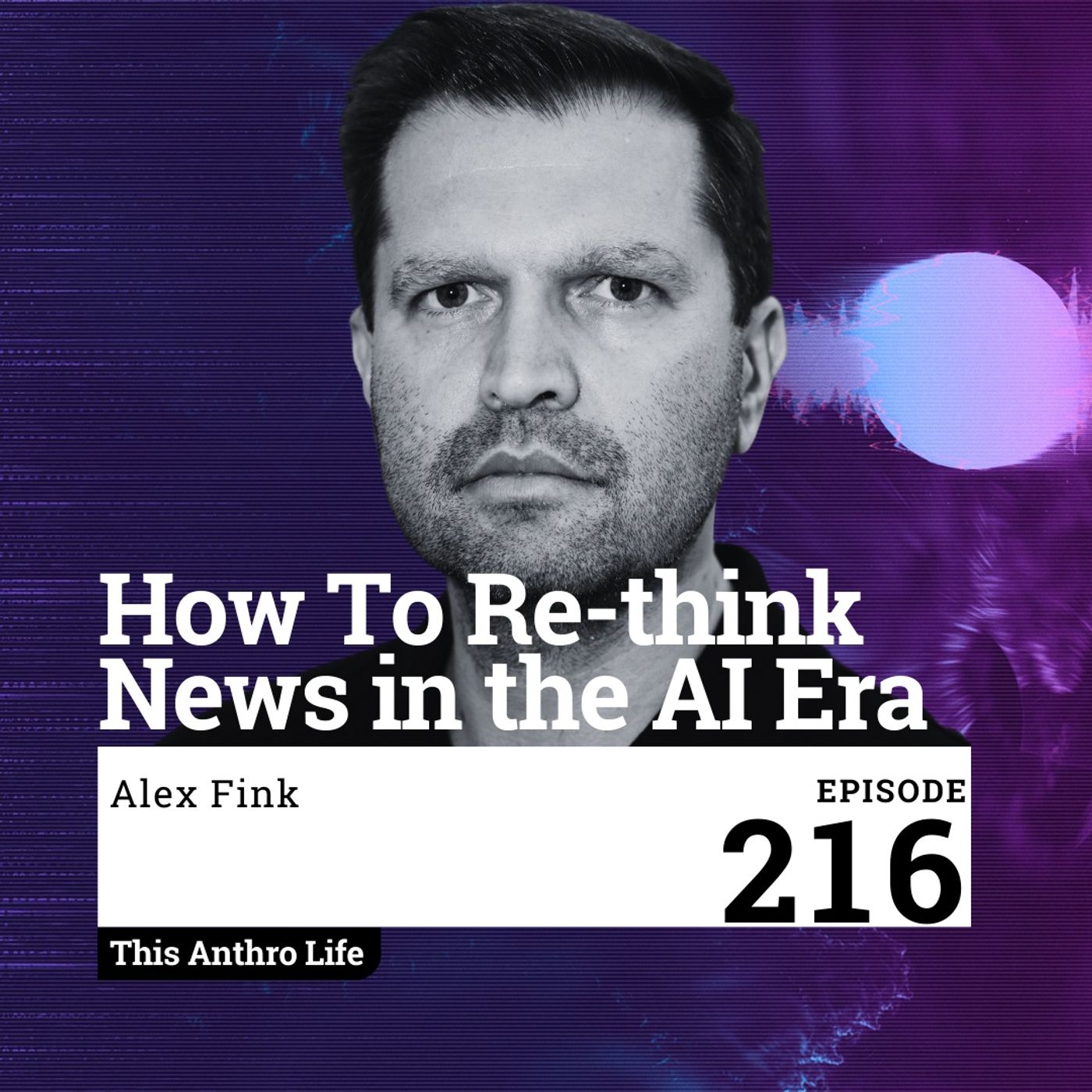
How To Re-think News in the AI Era
Join us for an enlightening discussion on the transformation of digital news consumption with Alex, the visionary founder of Other Web. I'm Adam, your host, and in this episode, we dive into the innovative strategies that Other Web is implementing to reshape how we interact with online news and information. Alex shares his journey, inspired by his upbringing in the Soviet Union where access to accurate information was limited, and his mission to eradicate the digital 'junk' that clutters our feeds today. We explore Other Web's pioneering features, such as 'nutrition labels' for news, which help users gauge the quality and source of their information, and 'news concierge' services powered by AI for personalized content curation. Our conversation also covers the future of journalism in the AI era, the ethics of technological development, and the complexities of innovating within the current news industry business models. Discover how Other Web is striving to ensure that both content creators and consumers uphold their responsibilities in the digital age.Keywords: AI, News, Fake News, Digital Era, Digital Junk, Tech, Future, Anthropology, Consumption, Journalism, AI and NewsAbout This Anthro LifeThis Anthro Life is a thought-provoking podcast that explores the human side of technology, culture, and business. We unravel fascinating narratives and connect them to the wider context of our lives. Tune in to https://thisanthrolife.org and subscribe to our Substack at https://thisanthrolife.substack.com for more captivating episodes and engaging content.Contact Alex Finkhttps://www.linkedin.com/in/temuchin43/https://otherweb.com/https://podcasts.apple.com/us/podcast/the-other-web/id1661364043/
53:2230/05/2024
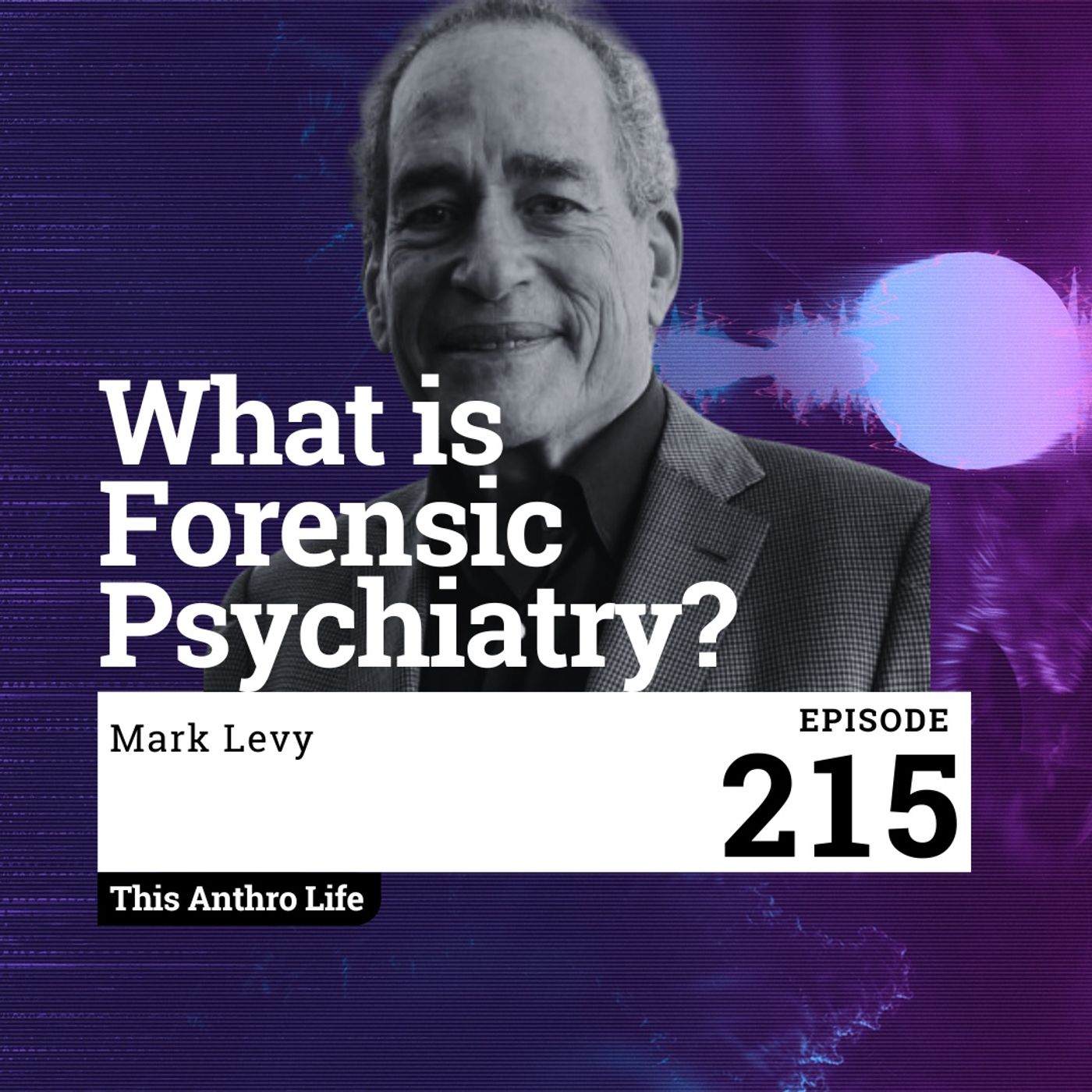
What is Forensic Psychiatry? with Mark Levy
Join us for an intriguing discussion on the connection between law and human behavior with Dr. Mark, a distinguished forensic psychiatry specialist. I'm Adam, your host, and in this episode, we explore forensic psychiatry—a medical field that bridges legal systems and mental health. Dr. Mark explains the differences between treating psychiatrists and forensic psychiatric experts in the legal field. We discuss mental health assessments in legal contexts, psychiatric training evolution, and challenges of presenting evidence in court. Dr. Mark highlights the advantages of diverse group practice. Discover the crucial role of forensic psychiatry in the justice system and the need for effective communication and holistic mental health.Keywords:Forensic Psychiatry - Human Behavior - Legal Systems - Mental Health - Psychiatric Training - Legal Contexts - Psychiatric Evidence - Anthropology - Podcast - Essay - Group Practice - Justice System - Effective Communication - Holistic Health - Law Psychiatry - Forensic Expert - Mental Assessments - Medical Evolution - Psychiatry Follow This Anthro Life:https://www.linkedin.com/company/this-anthro-life/https://www.thisanthrolife.org/https://thisanthrolife.substack.com/https://www.facebook.com/thisanthrolifehttps://www.instagram.com/thisanthrolife/ Contac Mark Levy:https://fpamed.com/https://www.linkedin.com/in/mark-levy-md-83538213/
01:15:1723/05/2024

Is Software Good Enough?
Delve into the world of software development, work culture, and the philosophy of 'good enoughness,' with Paula Bialski.I'm Adam Gamwell as a cultural anthropologist and award-winning media creator, I specialize in storytelling. My diverse background spans startups, nonprofits, cultural organizations, and Fortune 1000 companies, focusing on applied strategy, experience design, and human insights. My approach blends experiential research, like engaging with Peruvian quinoa farmers for climate change initiatives, with cutting-edge tools like AI and trends foresight. By leveraging big data alongside traditional ethnography, I align human needs with business goals, ensuring projects resonate profoundly.About This Anthro LifeThis Anthro Life is a thought-provoking podcast that explores the human side of technology, culture, and business. We unravel fascinating narratives and connect them to the wider context of our lives. Tune in to https://thisanthrolife.org and subscribe to our Substack at https://thisanthrolife.substack.com for more captivating episodes and engaging content.Keywords: software development, good enough-ness, maintenance, AI, work culture, legacy code, managers, engineers, agile, sustainability, anthropologyConnect with Paula Bialski:https://www.instagram.com/paulabialski/https://paulabialski.com/Follow This Anthro Life:https://www.linkedin.com/company/this-anthro-life/https://www.thisanthrolife.org/https://thisanthrolife.substack.com/https://www.facebook.com/thisanthrolifehttps://www.instagram.com/thisanthrolife/
53:2720/05/2024

Microdosing & Leadership: How does it work? with Paul Austin
In this podcast episode, Adam hosts Paul Austin, founder of Third Wave, to discuss his journey with psychedelics, microdosing, and the intersection with leadership and personal development. Paul shares his personal background, from growing up in a traditional Midwest home to experimenting with cannabis and psychedelics which led him to explore the boundaries of life and eventually start Third Wave.The conversation covers the impact of psychedelics on mental health, their ability to disrupt entrenched patterns, and their role in enhancing creativity, focus, and relational skills. Paul emphasizes the importance of safety, intention, and integration in psychedelic experiences, and discusses the future of psychedelic accessibility and legality in the U.S. and globally. The discussion also delves into microdosing protocols, the differences between LSD and psilocybin, and how these practices can benefit leaders by fostering neuroplasticity, courage, and a reevaluation of success.Finally, Paul shares his vision for the future of psychedelics, including creating accessible, secular, global retreat centers for psilocybin mushrooms, inspired by the free model of Vipassana meditation centers.I'm Adam Gamwell as a cultural anthropologist and award-winning media creator, I specialize in storytelling.My diverse background spans startups, nonprofits, cultural organizations, and Fortune 1000 companies, focusing on applied strategy, experience design, and human insights. My approach blends experiential research, like engaging with Peruvian quinoa farmers for climate change initiatives, with cutting-edge tools like AI and trends foresight.By leveraging big data alongside traditional ethnography, I align human needs with business goals, ensuring projects resonate profoundly. About This Anthro Life This Anthro Life is a thought-provoking podcast that explores the human side of technology, culture, and business. We unravel fascinating narratives and connect them to the wider context of our lives. Tune in to https://thisanthrolife.org and subscribe to our Substack at https://thisanthrolife.substack.com for more captivating episodes and engaging content.Time Stamps: 00:00 Intro02:40 The Origin Story of a Psychedelic Advocate09:30 The Cultural Shift in Psychedelic Perception15:20 Psychedelics in History and Modern Times22:21 Microdosing Explained: Protocols, Benefits, and Considerations29:14 The Rising Popularity of Microdosing in Modern Culture34:27 The Intersection of Spirituality and Psychedelics57:19 The Future of Psychedelics: Legalization and Cultural Shifts Keywords: microdosingAbout This Anthro Life: This Anthro Life is a thought-provoking podcast that explores the human side of technology, culture, and business. Hosted by Adam Gamwell, we unravel fascinating narratives and connect them to the wider context of our lives. Tune in to https://thisanthrolife.org and subscribe to our Substack at https://thisanthrolife.substack.com for more captivating episodes and engaging content. Connect with Fredrik ThomassenWebsite: https://www.superside.com/ LinkedIn: https://www.linkedin.com/in/fredrikthomassen/Instagram: https://www.instagram.com/supersidehq/ Twitter: https://twitter.com/f_thomassen?lang=en Connect with This Anthro Life:Instagram: https://www.instagram.com/thisanthrolife/ Facebook: https://www.facebook.com/thisanthrolife LinkedIn: https://www.linkedin.com/company/this-anthro-life-podcast/ This Anthro Life website: https://www.thisanthrolife.org/ Substack blog: https://thisanthrolife.substack.com
01:03:5210/05/2024
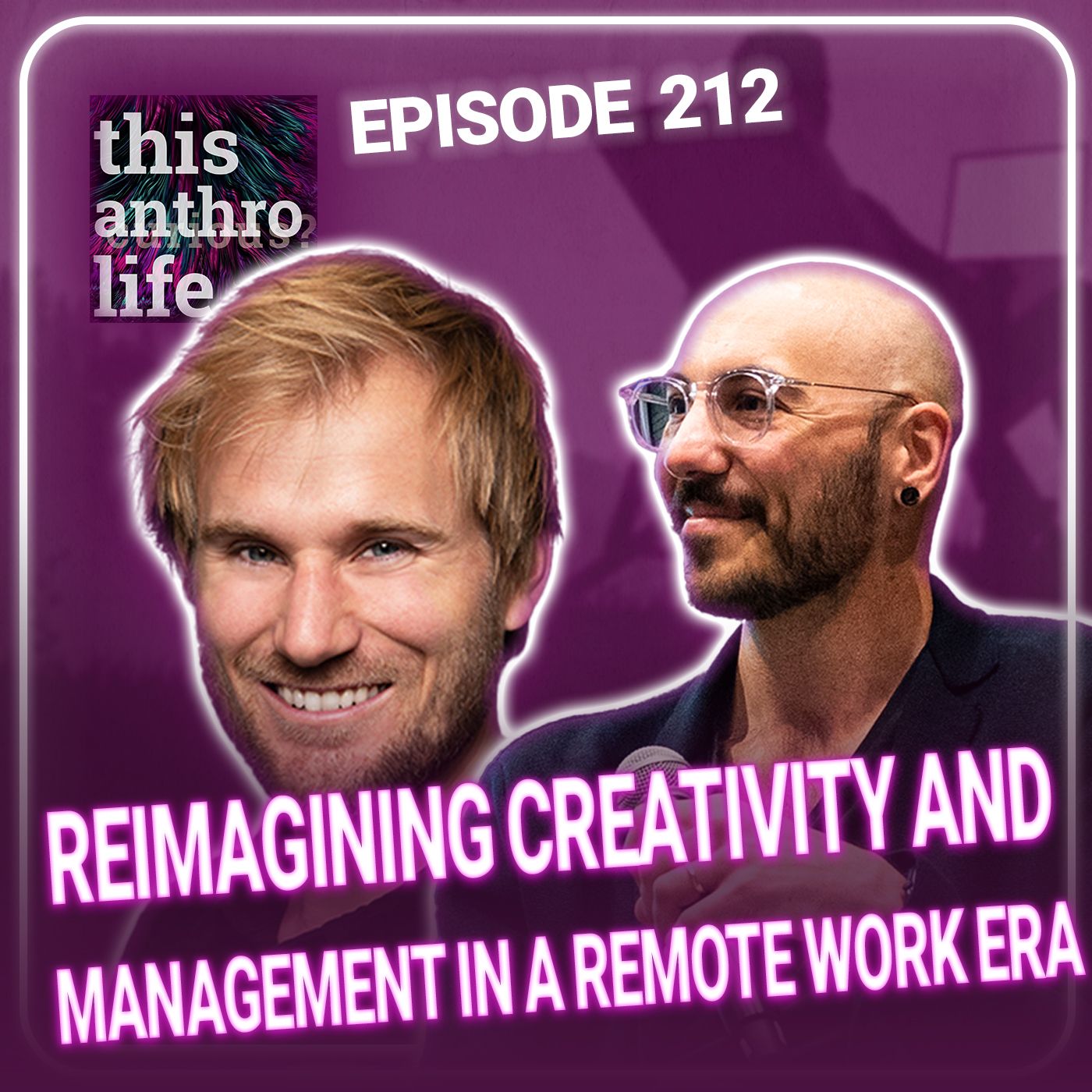
Reimagining Creativity and Management in a Remote Work Era
How can we democratize access to talent and foster equal opportunities?In this insightful episode of This Anthro Life, we delve into the transformative power of the COVID-19 pandemic on the shift to online work. We discuss the potential of remote work to create a more equal playing field in the job market, Fredrik sharing his experience of building Superside, a platform that helps marketing and creative teams overcome design bottlenecks. Through this insightful discussion, we explore how this transition not only enhances productivity but also levels the playing field for individuals worldwide.From the importance of speed and quality in creative endeavors to the pivotal role of values and psychological safety in organizational success, we unravel the keys to building a future where talent knows no bounds. Join the conversation as we explore how remote work, accelerated by the pandemic, is reshaping industries, amplifying creativity, and paving the way for inclusive and innovative organizations. Timestamps:01:40 Exploring impacts of the pandemic on remote work adoption02:51 Origin story of Superside and its mission04:22 Founder's background in marketing and identifying creative bottlenecks09:31 Spreading remote work to smaller markets around the world11:22 Remote work enabling access to specialized global talent12:01 Remote work reducing discrimination and enabling diversity17:25 Flaws in traditional resume screening and interviews22:08 Innovating better methods for skills and values testing26:29 Focusing on career growth opportunities at Superside30:50 Rapid growth and exceptionally low turnover at Superside34:20 Fostering psychological safety for creativity and truth-seeking38:42 Leadership modeling openness to criticism and dissent42:09 Universal principles and truth-seeking in quality designKey Takeaways:The internet and remote work can create fair opportunities by providing access to talent and removing geographical barriers.The COVID-19 pandemic has sped up the shift to remote work, demonstrating that people can be effective while working from home.Overcoming the traditional hurdles in creative processes can be achieved by utilizing online platforms like Superside to streamline design and marketing tasks.Establishing a diverse and inclusive company is not only morally sound but also results in improved performance and innovation.Evaluating values and cultural compatibility is essential in recruitment and team building, and this can be accomplished through structured assessments and standardized testing.About This Anthro Life: This Anthro Life is a thought-provoking podcast that explores the human side of technology, culture, and business. Hosted by Adam Gamwell, we unravel fascinating narratives and connect them to the wider context of our lives. Tune in to https://thisanthrolife.org and subscribe to our Substack at https://thisanthrolife.substack.com for more captivating episodes and engaging content. Connect with Fredrik ThomassenWebsite: https://www.superside.com/ LinkedIn: https://www.linkedin.com/in/fredrikthomassen/Instagram: https://www.instagram.com/supersidehq/ Twitter: https://twitter.com/f_thomassen?lang=en Connect with This Anthro Life:Instagram: https://www.instagram.com/thisanthrolife/ Facebook: https://www.facebook.com/thisanthrolife LinkedIn: https://www.linkedin.com/company/this-anthro-life-podcast/ This Anthro Life website: https://www.thisanthrolife.org/ Substack blog: https://thisanthrolife.substack.com
44:5501/05/2024
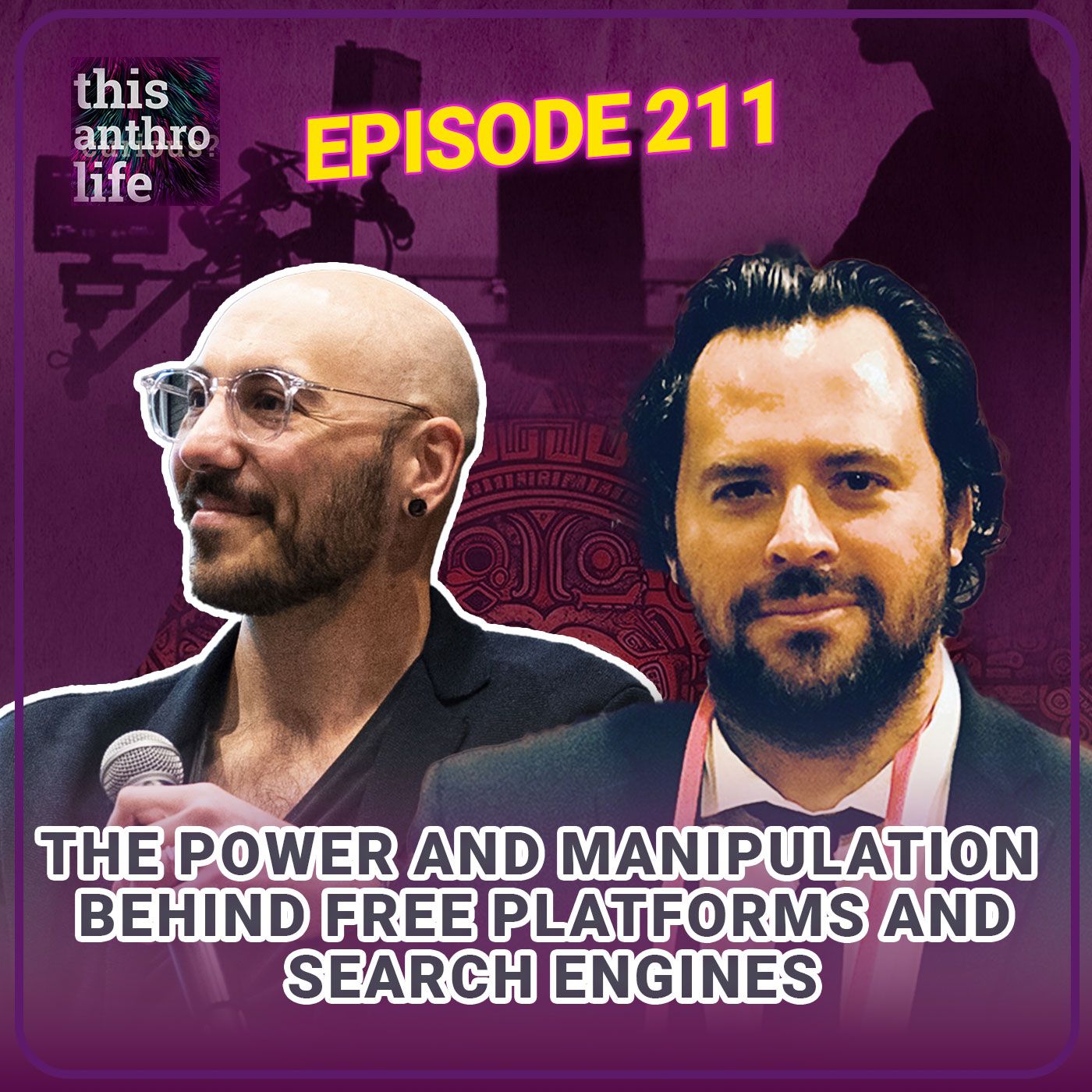
The Power and Manipulation Behind Free Platforms and Search Engines
How do the hidden costs of technology, like social media and search engines, shape our lives in unforeseen ways?In this compelling episode of This Anthro Life, we engage with filmmaker David Donnelly, delving into the depths of his documentary "Cost of Convenience." Donnelly's exploration uncovers the intricate web of consequences spawned by technology, spotlighting the covert toll of social media and search engine usage. Through a narrative woven with two years of intensive interviews and research, Donnelly unveils the unseen impacts of our digital age. The conversation traverses the power dynamics inherent in data collection, emphasizing the imperative of transparency. We advocate for a cultural shift, calling for an evaluation of our relationship with technology and its pervasive influence on modern society.Explore the intricate repercussions of technology through David Donnelly's lens in "Cost of Convenience." Delve into two years of intensive research revealing unseen impacts.Timestamp: 0:00 The impact of digital technology on human experience, exploring themes of power, data collection, and mental health.06:44 Data collection and surveillance in the tech industry.14:27 The impact of technology on critical thinking and society.17:48 Interdisciplinary approach to understanding complex problems.23:10 The impact of algorithms on mental health and privacy.30:37 The impact of online interactions on human connection and well-being.33:28 The purpose of education and critical thinking.38:04 The impact of algorithms on society, including privacy, wealth inequality, and discrimination.43:47 AI bias, responsibility, and accountability in technology development.49:08 Tech's impact on society, including mental health, aging, and consciousness.Key takeawaysTechnology platforms that we use for free collect and sell our data, which can be used to predict our behavior more accurately than our minds.The lack of transparency in data collection and algorithmic decision-making gives those with access to the data a tremendous amount of power and influence.Our relationship with technology is causing a range of societal issues, including mental health problems, polarization, and misinformation.There is a need for a cultural paradigm shift and more informed citizenship to address the consequences of technology and advocate for transparency and control over data.About This Anthro Life:This Anthro Life is a thought-provoking podcast that explores the human side of technology, culture, and business. Hosted by Adam Gamwell, we unravel fascinating narratives and connect them to the wider context of our lives. Tune in to https://thisanthrolife.org and subscribe to our Substack at https://thisanthrolife.substack.com for more captivating episodes and engaging content. Connect with David Donnelly:Instagram: https://www.instagram.com/dav_donnelly/?hl=enTwitter: https://twitter.com/daviddonnelly?lang=en Connect with This Anthro Life:Instagram: https://www.instagram.com/thisanthrolife/ Facebook: https://www.facebook.com/thisanthrolife LinkedIn: https://www.linkedin.com/company/this-anthro-life-podcast/ This Anthro Life website: https://www.thisanthrolife.org/ Substack blog: https://thisanthrolife.substack.com
54:4124/04/2024
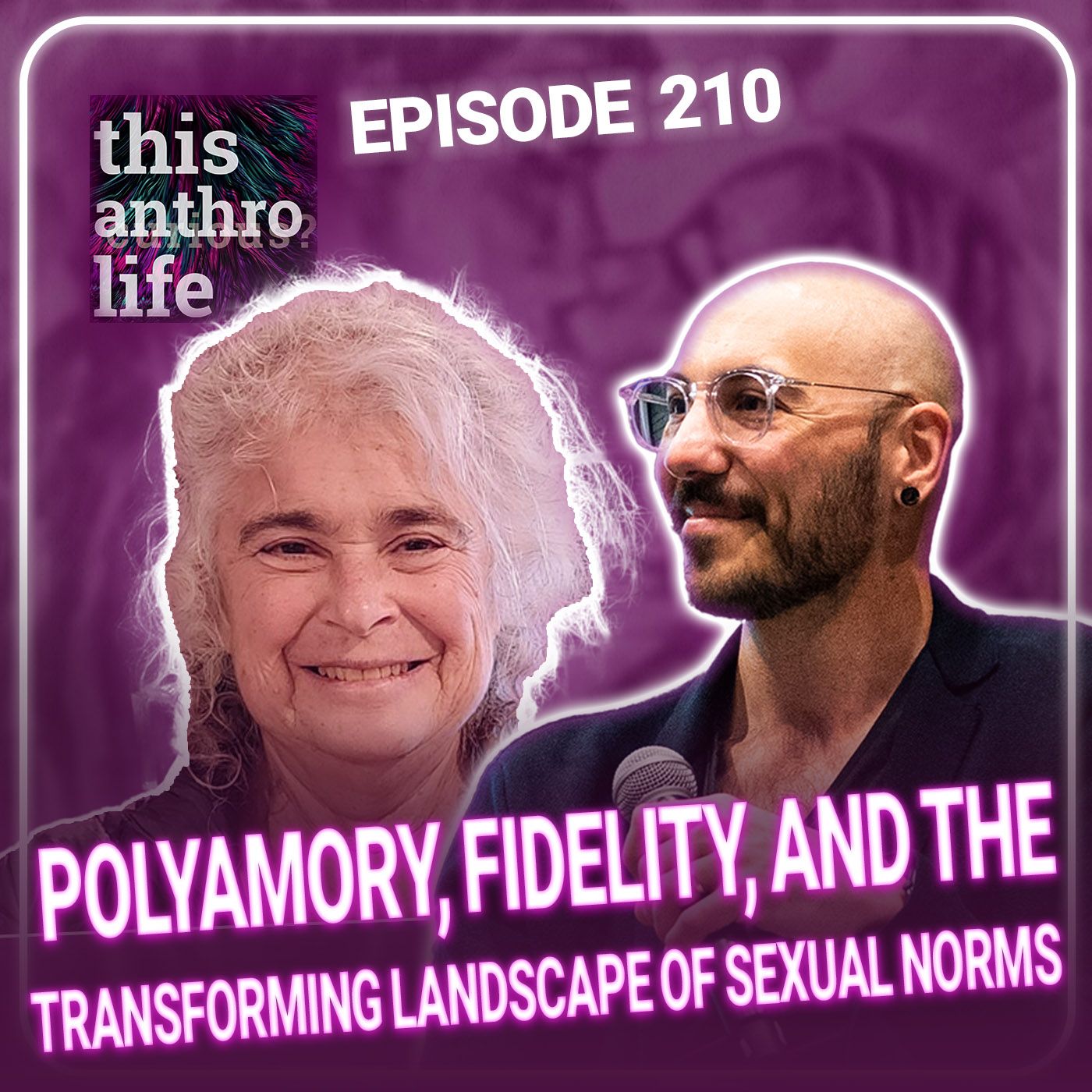
Polyamory, Fidelity, and the Transforming Landscape of Sexual Norms With Leanne Wolfe
How do societal norms and personal experiences intersect in shaping our understanding of love and sexuality?In this insightful episode of This Anthro Life, we delve into transforming the landscape of Sexual Norms with Dr. Leanna Wolfe. We delve into the intricate connections between love, anthropology, and human desires. Dr. Wolfe’s memoir, "177 Lovers," serves as a catalyst, challenging conventional views on sexuality and relationships. They navigate the complex narratives surrounding virginity and parental sexual history, highlighting the discrepancies between societal expectations and lived realities. The conversation extends to the evolving landscape of sexual norms, including the rise of polyamory and its implications for intimacy and commitment. Dr. Wolfe’s insights on sexual tourism and changing attitudes toward sexual assault underscore the importance of cultural understanding and consent. Ultimately, they emphasize the necessity of embracing diverse experiences and truths in navigating the realm of sexuality.Join us in this intellectually rich conversation with Dr. Leanna Wolfe as we delve into the unexpected intersections of love, anthropology, and the raw data of our desires. Expand your understanding of human relationships and challenge societal normsTimestamps00:00 - Introduction to the episode and guest, Dr. Leanna Wolfe09:12 - The impact of family narratives on sexuality and the discovery of hidden truths16:27 - Exploring alternative ways of approaching adolescence and gender19:02 - Shifting cultural perspectives on gender and sexuality24:04 - The benefits of practicing polyamory for brain chemistry and excitement33:45 - Different configurations of polyamory and managing jealousy42:14 - The transactional nature of relationships and the importance of consent51:10 - Research challenges and the importance of open and honest conversations about sex56:50 - Challenges of moving away from addiction to meth and finding value in in-person connection1:01:33 - Wrapping up the conversation and thanking the guestKey Takeaways:Dr. Wolfe’s memoir, "177 Lovers," offers a unique perspective that challenges conventional norms of sexuality and explores the intricate intersections of love and anthropology.Societal narratives about parental sexual history and virginity may diverge from personal experiences, highlighting the complexity of cultural expectations.Polyamory, characterized by multiple partners, is gaining acceptance, offering both variety and stability in relationships.Sexual tourism raises ethical questions regarding consent, economic dynamics, and its impact on local communities.The #MeToo movement signals shifting attitudes toward sexual assault, emphasizing the importance of clear communication and respect for boundaries.Generational differences exist in understanding consent, with younger generations prioritizing open and honest communication in intimate encounters.About This Anthro Life Podcast:This Anthro Life is a thought-provoking podcast that explores the human side of technology, culture, and business. Hosted by Adam Gamwell, we unravel fascinating narratives and connect them to the wider context of our lives. Tune in to https://thisanthrolife.org and subscribe to our Substack at https://thisanthrolife.substack.com for more captivating episodes and engaging content. Connect with Dr. Leanne Wolfe:Website: https://www.drleannawolfe.com/ Connect with This Anthro Life:Instagram: https://www.instagram.com/thisanthrolife/ Facebook: https://www.facebook.com/thisanthrolife LinkedIn: https://www.linkedin.com/company/this-anthro-life-podcast/ This Anthro Life website: https://www.thisanthrolife.org/ Substack blog: https://thisanthrolife.substack.com
01:02:4717/04/2024
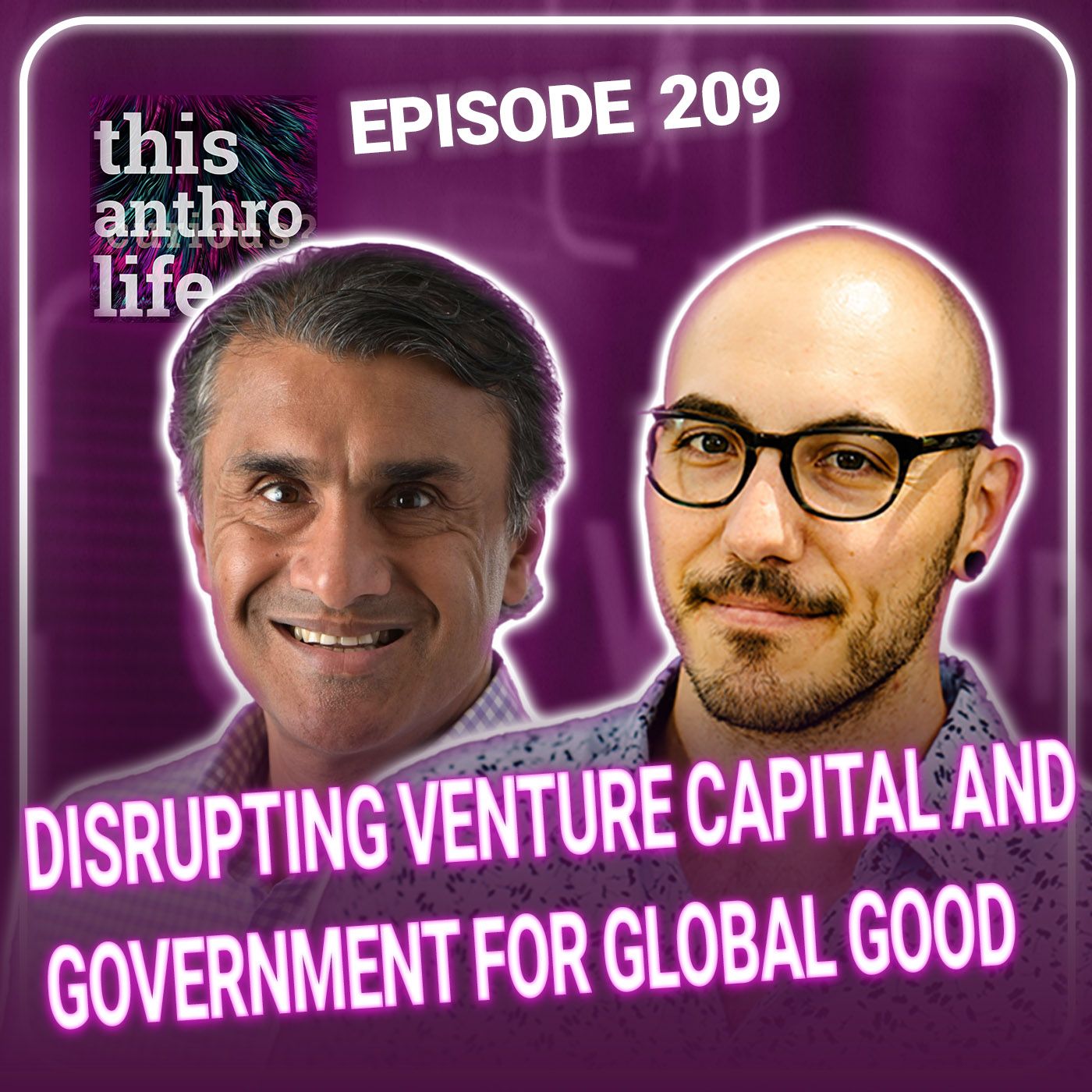
Disrupting Venture Capital and Government for Global Good
How can entrepreneurial spirit redefine traditional career paths and drive societal change through innovative collaboration?In this enlightening episode of This Anthro Life, inspired by "Venture Meets Mission," we engage with author Gupta to unravel the transformative potential of entrepreneurship. Gupta advocates for a nonlinear career path, urging individuals to become "dual citizens" in multiple sectors. He emphasizes trust-building between government and business, highlighting personalized entrepreneurship's role in creating meaningful impact. Gupta explores the synergy between venture capital and government collaboration to drive innovation and social entrepreneurship. His insights inspire a reimagining of traditional boundaries, focusing on mission-driven ventures. Join us in embracing this mindset for a brighter, more sustainable future.Join us in this enlightening discussion as we uncover the transformative potential of anthropology in shaping meaningful careers and fostering innovation in today's dynamic professional landscape.Timestamps:0:00 Intersection of entrepreneurship, technology, and government to address societal problems.2:48 Entrepreneurship, government, and social impact with a focus on intersectionality.6:32 Non-linear career paths and breaking down binary choices between profit and non-profit.11:35 Building trust between govt, business, and academia through dual citizenship 17:17 Personalizing entrepreneurship and its cultural significance.22:45 Entrepreneurship, uncertainty, and adaptability in a rapidly changing world.26:52 Gen Z's purpose-driven mindset and how it's shaping the workforce.33:33 Impact investing and bridging the digital divide.39:31 How the government and private sector can collaborate for success.41:57 Bridging gaps between entrepreneurship, government, and academia for societal impact.48:19 Entrepreneurship and societal mission, aligning purpose and profit for innovation and impact.Key takeaways: Nonlinear career paths and diverse experiences enhance problem-solving and innovation.Trust is vital for bridging partnerships between government and business.Entrepreneurship transcends company creation, fostering risk-taking and job creation.Mission-driven focus arises from contemporary global challenges like pandemics and environmental issues.Entrepreneurship intersecting with government yields impactful solutions.Examples like SpaceX and Moderna showcase impactful ventures born from this intersection.Mission-aligned venture capital can effectively address global challenges such as climate change and national security.About This Anthro Life:This Anthro Life is a thought-provoking podcast that explores the human side of technology, culture, and business. Hosted by Adam Gamwell, we unravel fascinating narratives and connect them to the wider context of our lives. Tune in to https://thisanthrolife.org and subscribe to our Substack at https://thisanthrolife.substack.com for more captivating episodes and engaging content. Connect with Arun Gupta:Website: https://noblereachfoundation.org/person/arun-gupta/ Linkedin: https://www.linkedin.com/in/arungupta23/ Twitter (X): https://twitter.com/arungupta?lang=en Connect with This Anthro Life:Instagram: https://www.instagram.com/thisanthrolife/ Facebook: https://www.facebook.com/thisanthrolife LinkedIn: https://www.linkedin.com/company/this-anthro-life-podcast/ This Anthro Life website: https://www.thisanthrolife.org/ Substack blog: https://thisanthrolife.substack.com
53:3310/04/2024
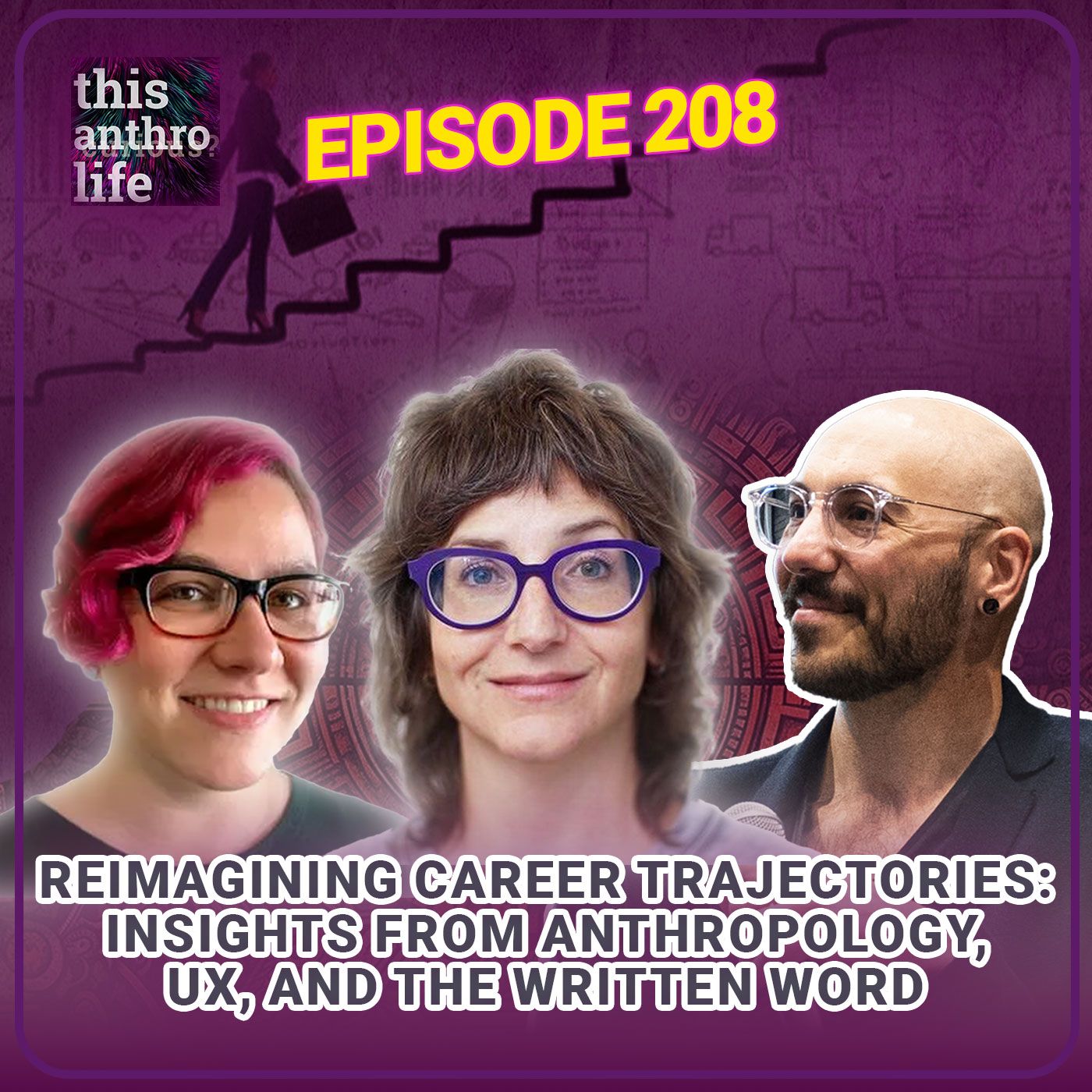
Reimagining Career Trajectories: Insights from Anthropology, UX, and the Written Word
Reimagining Career Trajectories: Insights from Anthropology, UX, and the Written WordHow can anthropology redefine traditional career paths and foster innovation in diverse professional landscapes? In this insightful episode of career anthropology, we speak with Amy Goldmacher and Amy Santee, professionals who seamlessly blended anthropology into their careers. Amy Goldmacher shares her journey from UX research to career coaching, using anthropology to empower individuals in communication. Amy Santee discusses transitioning from academia to industry, highlighting anthropology's adaptability in diverse settings. We explore the evolving perception of anthropology in the business world, advocating for increased visibility and mentorship to support aspiring anthropologists in carving out fulfilling career paths. Our dialogue underscores the invaluable contribution of anthropology to various fields and inspires listeners to embrace the multifaceted possibilities within the discipline.Join us in this enlightening discussion as we uncover the transformative potential of anthropology in shaping meaningful careers and fostering innovation in today's dynamic professional landscape.Timestamps0:00 Career pivots and the evolution of anthropology.6:12 Anthropologists in industry and career growth.8:45 Anthropology's relevance in a changing business landscape.12:28 Job market challenges and career evolution in the tech industry.15:34 Career development for anthropology graduates.21:04 Career development challenges for academic transitioners.27:48 Writing nonfiction books and distilling ideas.31:20 Career paths and defining success.35:30 Career development and exploration.38:56 Career development and experimentation.42:30 Entrepreneurship and career development.44:00 Strategic career development and time management.47:33 Career paths beyond traditional anthropology.51:21 Anthropology career paths and their applications.Key takeaways Anthropology careers have expanded beyond academia, with opportunities emerging in tech, marketing, and consulting sectors.Communicating the relevance of anthropology skills is vital outside academia, aiding in securing job opportunities across diverse industries.Success is not static but evolves with time, shaped by individual values and goals, highlighting the importance of self-awareness.Strategic planning and experimentation are crucial for navigating career transitions effectively and finding fulfillment in work.Increased visibility and mentorship within anthropology are essential for aspiring professionals to explore diverse career paths and make informed decisions.About This Anthro Life This Anthro Life is a thought-provoking podcast that explores the human side of technology, culture, and business. Hosted by Adam Gamwell, we unravel fascinating narratives and connect them to the wider context of our lives. Tune in to https://thisanthrolife.org and subscribe to our Substack at https://thisanthrolife.substack.com for more captivating episodes and engaging content. Connect with Amy Goldmacher:Website: https://www.amygoldmacher.com/ Linkedin: https://www.linkedin.com/in/amygoldmacher/ Twitter (X): https://twitter.com/solidgoldmacher Instagram: https://www.instagram.com/solidgoldmacher/ Connect with Amy Santee:Website: https://www.amysantee.com/ Linkedin: https://www.linkedin.com/in/amysantee/ Connect with This Anthro Life:Instagram: https://www.instagram.com/thisanthrolife/ Facebook: https://www.facebook.com/thisanthrolife LinkedIn: https://www.linkedin.com/company/this-anthro-life-podcast/ This Anthro Life website: https://www.thisanthrolife.org/ Substack blog: https://thisanthrolife.substack.com
56:5003/04/2024
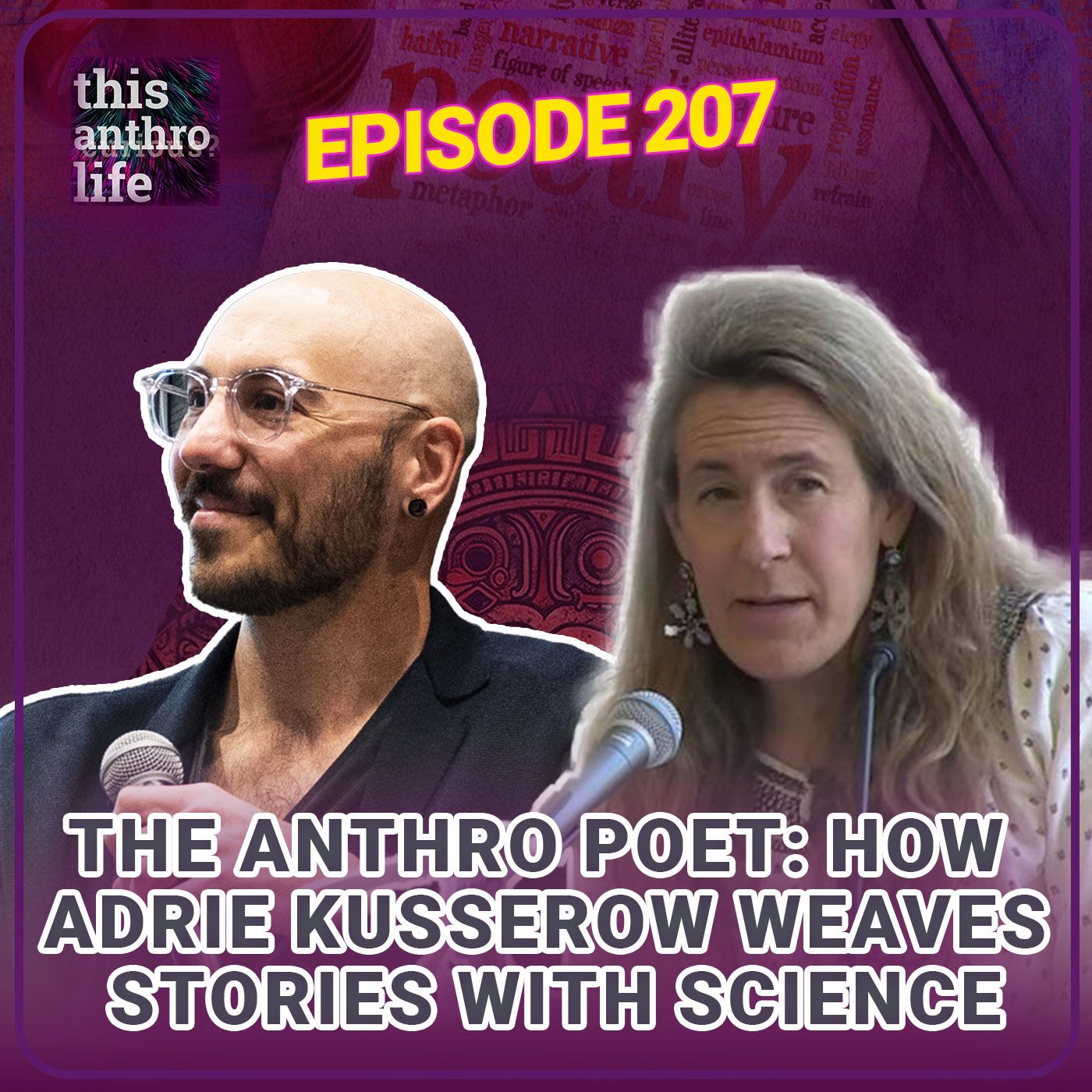
The Anthro Poet: How Adrie Kusserow Weaves Stories with Science
How does poetry help us understand people better, using words that touch our hearts and reveal hidden feelings? In this captivating episode of This Anthro Life, we engage with Adrie Kusserow, an esteemed anthropologist who brings a unique poetic perspective to her work. We delve into the essence of anthropology, emphasizing the transformative power of storytelling and its role in shaping cultural narratives. Adrie Kusserow shares her profound journey in Kathmandu, recounting how it shifted her worldview at a tender age. The conversation navigates through the intricacies of fieldwork, drawing parallels between anthropologists and refugees, and exploring the impact of language, emotion, and technology on cultural understanding. Adrie Kusserow's book, "The Trauma Mantras," becomes a focal point, highlighting the significance of authentic personal narratives in reshaping dominant discourses. The episode culminates in a reflection on the potency of poetry in anthropology and the ongoing endeavor to confront and redefine established narratives in a dynamic world. Join me in this enlightening conversation with anthropologist Adrie Kusserow as we explore the power of storytelling and the importance of engaging with different cultural perspectives. Discover how narratives shape our understanding of the world and how we can challenge dominant narratives to create a more inclusive society. Take advantage of this thought-provoking discussion.Timestamps:00:00 - Introduction to Adrie Kusserow and the Power of Anthropology05:00 - Adrienne's Childhood and the Birth of an Anthropologist10:00 - The Art of Writing and Engaging the Public in Anthropology31:35 - Confronting Western Narratives of Depression and Individualism35:00 - The Collective Nature of Suffering and Learning from Refugees40:00 - Bhutan's Struggle with Western Influence and Youth Depression44:30 - The Search for Authenticity and the Anthropologist's Role50:00 - Language, Grammar, and Perception in the Anthropocene55:00 - The Impact of Digital Communication on Emotional Depth1:00:00 - The Interplay of Desire and Cultural Exchange in Bhutan Key Takeaways:Anthropologists are like careful watchers of everyday people, learning from how they talk, move, and live to understand their lives.Refugees are like their own kind of observers, trying to understand a new culture and where they fit in it.Sharing stories is important for understanding pain, and different groups have different stories to explain what they go through.In understanding mental health and pain, Western medical ideas often take over, but we should listen to people's own stories.Poetry can help anthropologists explore feelings, experiences, and the small details of different cultures.How we speak and use language affects how we see the world, so it's important to pay attention to it.About This Anthro Life This Anthro Life is a thought-provoking podcast that explores the human side of technology, culture, and business. Hosted by Adam Gamwell, we unravel fascinating narratives and connect them to the wider context of our lives. Tune in to https://thisanthrolife.org and subscribe to our Substack at https://thisanthrolife.substack.com for more captivating episodes and engaging content. Connect with Adrie KusserowWebsite: https://www.adriekusserow.com/ Linkedin: https://www.linkedin.com/in/kusserow-adrie-8a882ba Twitter (X): https://twitter.com/mreddingtoncfi Facebook: https://www.facebook.com/adrie.kusserow/ Connect with This Anthro Life:Instagram: https://www.instagram.com/thisanthrolife/ Facebook: https://www.facebook.com/thisanthrolife LinkedIn: https://www.linkedin.com/company/this-anthro-life-podcast/ This Anthro Life website: https://www.thisanthrolife.org/ Substack blog: https://thisanthrolife.substack.com
01:02:2027/03/2024
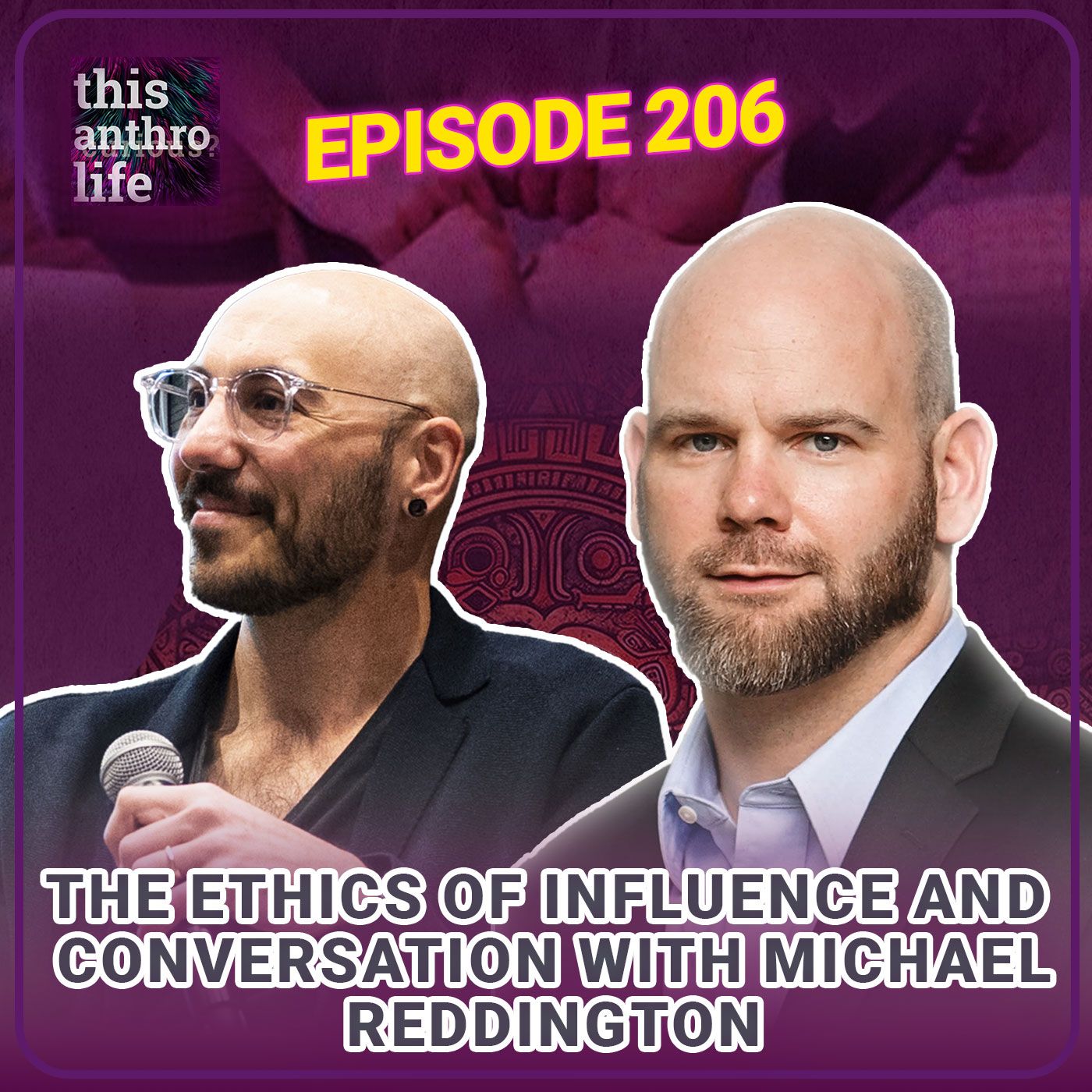
The Ethics of Influence and Conversation with Michael Reddington
How does understanding the psychology behind lying enhance our ability to unravel the truth in conversations?In this insightful episode of This Anthro Life, we delve into the intricate dynamics of communication, emphasizing the pivotal role of context. Drawing from his expertise in forensic interviewing, he illuminates how decoding body language, facial cues, and power dynamics can reveal deeper truths. Reddington highlights empathy as a linchpin for fostering honesty, acknowledging that people often resort to lies to evade repercussions. He underscores the potency of relinquishing control in conversations to nurture openness and cooperation. By reframing lies as valuable insights, he advocates for goal-oriented dialogues that prioritize understanding over judgment. Join us in this insightful conversation and explore the nuances of communication with Michael Reddington and unravel the secrets behind effective dialogue. Timestamps00:00 Introduction to Michael Reddington and the art of conversation04:16 The importance of power dynamics in conversations12:05 The benefits of understanding why people lie19:10 The power of achieving desired outcomes over being in control26:45 The value of gathering information and letting it weed itself out35:40 The impact of power differentials on trust and stress levels44:05 The commitment and buy-in that comes from feeling like it's one's own decision52:40 The discipline of listening method and its limitations11:04 Importance of letting the conversation flow organically38:02 The universality of the human experience in communication Key Takeaways: Context, including body language and non-verbal cues, is crucial for understanding the true meaning in conversations.Lies can reveal valuable insights into a person's motivations and concerns, allowing for deeper understanding.Power dynamics significantly impact conversations, and people are more likely to open up when they feel in control and psychologically safe.Setting clear goals and focusing on outcomes rather than personalities can lead to more productive dialogues.In the post-truth era, prioritizing outcomes and problem-solving may be more important than seeking objective truth.The Discipline Listening Method provides a framework for effective communication by emphasizing context, power dynamics, and goal setting.Empathy, curiosity, and a focus on mutual benefit are key to uncovering hidden truths and achieving desired outcomes through conversations.About This Anthro Life:This Anthro Life is a thought-provoking podcast that explores the human side of technology, culture, and business. Hosted by Adam Gamwell, we unravel fascinating narratives and connect them to the wider context of our lives. Tune in to https://thisanthrolife.org and subscribe to our Substack at https://thisanthrolife.substack.com for more captivating episodes and engaging content. Connect with Michael ReddingtonWebsite: https://michaelreddington.com/ Linkedin: https://www.linkedin.com/in/michaelreddingtoncfi Twitter (X): https://twitter.com/mreddingtoncfi Connect with This Anthro Life:Instagram: https://www.instagram.com/thisanthrolife/ Facebook: https://www.facebook.com/thisanthrolife LinkedIn: https://www.linkedin.com/company/this-anthro-life-podcast/ This Anthro Life website: https://www.thisanthrolife.org/ Substack blog: https://thisanthrolife.substack.com
01:03:3220/03/2024
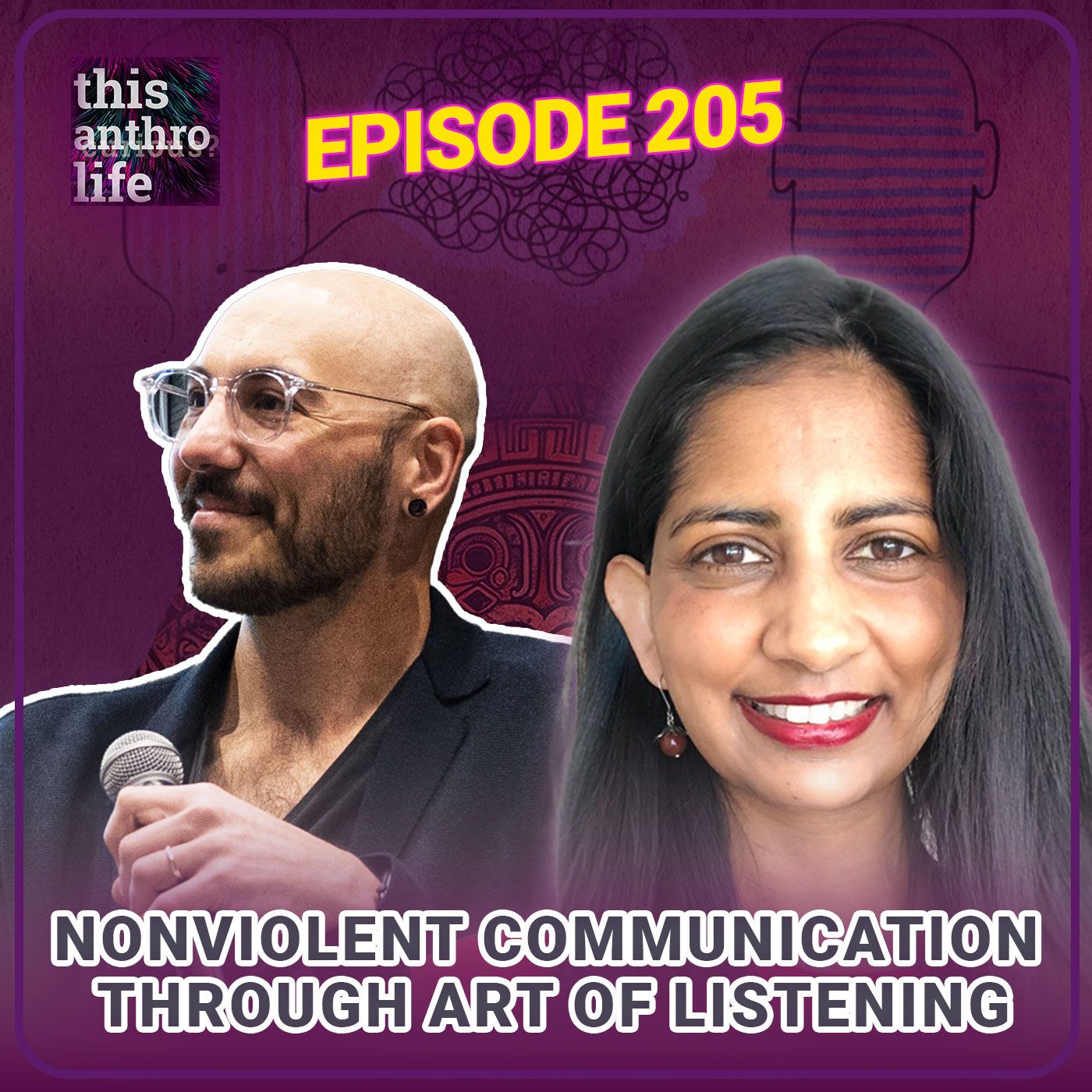
An Anthropologist's Perspective on Nonviolent Communication Through Art of Listening
Have you ever wondered how anthropology intersects with personal growth and academia?In this compelling episode of This Anthro Life, the discussion delves into the multifaceted world of anthropology, academia, and personal development. Nethra Samarawickrema shares her perspective on topics ranging from the origins of anthropology to the challenges of fieldwork and knowledge production. Key themes include the importance of active listening in fieldwork, navigating the tension between academic pursuits and community respect, and the impact of nonviolent communication in scholarly and professional environments. Additionally, the conversation explores avenues for creativity, achieving work-life balance, and finding fulfillment outside academia, including alternative career paths like UX design and coaching. Join us in this awakening episode, you might reflect on your own experiences with academic research or personal growth journeys, and how they intersect with the broader themes discussed. Timestamp 04:03 - The importance of listening in fieldwork and the challenge of sharing stories. 01:21 - Difficulty returning from the field and feeling unmoored. 12:53 - Writer's block and reshaping thinking. 5:00 - Discovering the power of listening in conflict mediation. 21:43 - Tension between internal truth and external legitimacy. 27:19 - Creating space for messy, contradictory experiences. 29:03 - Transformative power of conversation and therapy. 36:07 - Designing a class focused on listening. 43:59 - Words flow when not afraid of judgment. 57:30 - Transforming spaces and reinventing lives. Key Takeaways: Anthropology emphasizes deep listening and situated perspectives for a unique understanding of diverse cultures and experiences. Fieldwork involves letting go of preconceptions, immersing in the unknown and truly grasping the experiences of those under study.onviolent communication fosters empathy by listening to others' needs, creating a safe space for authentic expression.Design thinking underscores the importance of the creative process, encouraging exploration without judgment for new insights and solutions.Creating safe spaces with deep listening is crucial for personal growth, meaningful relationships, and aligning work with values and passions.About This Anthro Life:This Anthro Life is a thought-provoking podcast that explores the human side of technology, culture, and business. Hosted by Adam Gamwell, we unravel fascinating narratives and connect them to the wider context of our lives. Tune in to https://thisanthrolife.org and subscribe to our Substack at https://thisanthrolife.substack.com for more captivating episodes and engaging content. Connect with Nethra SamarawickremaWebsite: https://www.workwithnethra.com/Instagram: https://www.instagram.com/nethra_s/ Linkedin: https://www.linkedin.com/in/nethra-samarawickrema-workwithnethra Connect with This Anthro Life: Instagram: https://www.instagram.com/thisanthrolife/ Facebook: https://www.facebook.com/thisanthrolife LinkedIn: https://www.linkedin.com/company/this-anthro-life-podcast/ This Anthro Life website: https://www.thisanthrolife.org/ Substack blog: https://thisanthrolife.substack.com
56:3114/03/2024
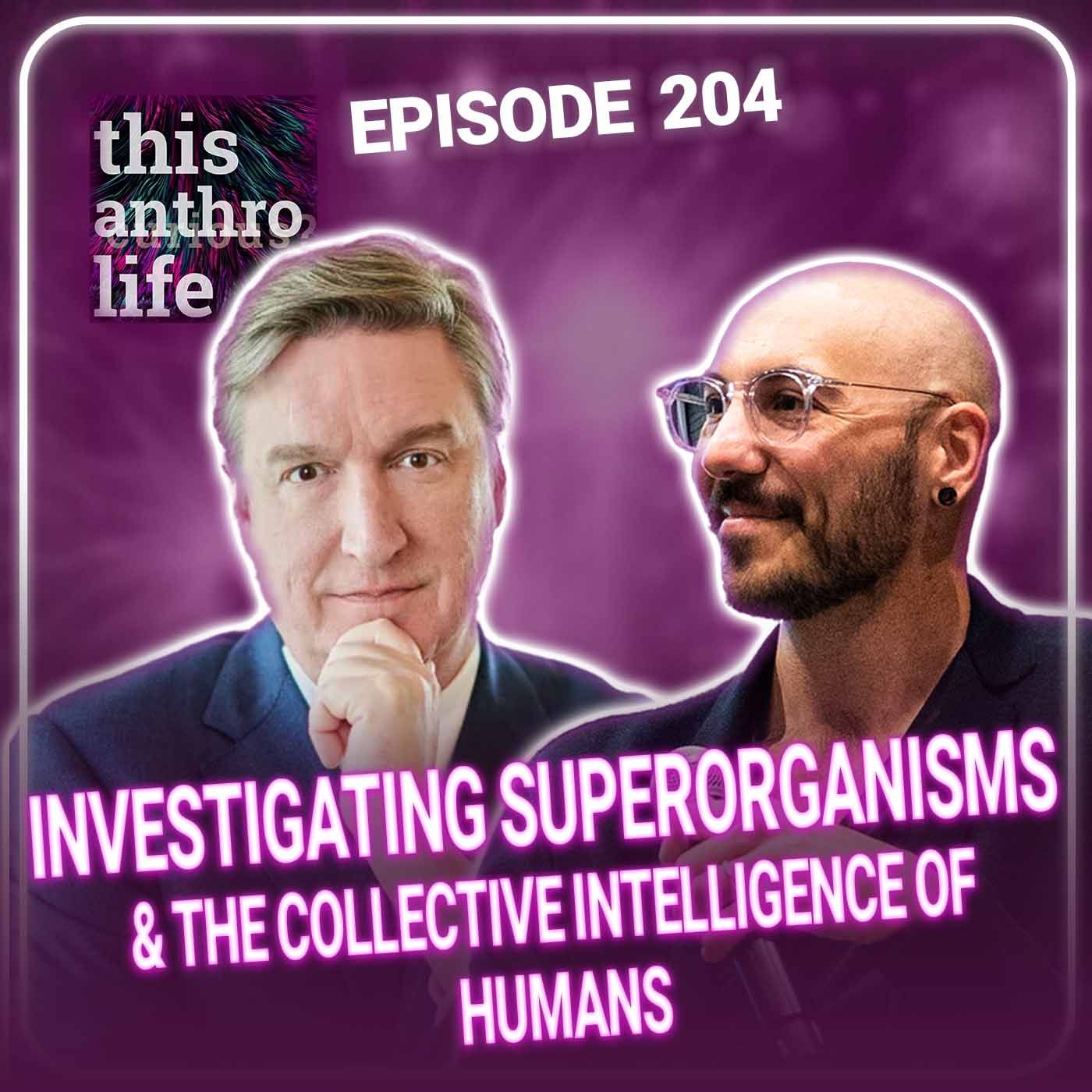
Investigating Superorganisms and The Collective Intelligence of Humans
What fascinating parallels exist between the structure of bees in a hive and the potential for humanity to function as a superorganism?In this episode, we engage in a thought-provoking conversation with Byron Reese about the concept of superorganisms. Reese draws parallels between the structure and behavior of bees in a hive and the potential for humanity to function as a superorganism. He explores the idea that a collective entity, which he calls "Agora," could emerge from the collaboration and interconnectedness of individuals. Reese presents falsifiable hypotheses that support the existence of Agora and discusses the emergent properties and capabilities that could arise from such a superorganism. The conversation delves into the role of technology, the future of knowledge, and the potential for humanity to shape a more harmonious and evolved global society.Join us in this engaging episode as we delve into the role of technology, the future of knowledge, and the potential for humanity to shape a more harmonious and evolved global society.Timestamp0:00 Blending into a larger entity and its impact on humanity.1:42 The possibility of humans being a superorganism.4:09 The concept of superorganisms and their implications.8:51 Emergent properties of complex systems like Manhattan and the human body.14:24 The evolution of knowledge storage and retrieval.19:48 The future of knowledge and technology.24:56 Individuality and conformity in a superorganism.31:27 The possibility of life on other planets and the Gaia hypothesis.37:46 Human progress and utopia.42:39 AI, storytelling, and human connection.47:21 Humanity as a superorganism and its implications. Key Takeaways:Delve into the concept of humanity as a superorganism, challenging traditional ideas of individuality and exploring emergent properties seen in superorganisms like bee hives or cities.Examine the journey of knowledge storage from oral tradition to digital databases, and consider the impact of language models in consolidating human knowledge.Discuss the implications of emerging technologies such as Internet-connected sensors in capturing daily life experiences and enhancing human decision-making.Explore the balance between individuality and conformity within superorganisms, citing examples from hive-like societies and the notion of self-creation.Highlight the importance of cooperation within superorganisms, drawing parallels with bee colonies as a metaphor for human society and promoting interconnectedness through the "overview effect.Investigate the Gaia hypothesis and its implications for life on Earth, including the possibility of life on other planets and the Fermi Paradox.Assess human progress towards a utopian society, analyzing historical advancements in education, governance, and legal equality.Analyze the relationship between AI, storytelling, and human connection, considering the anthropomorphism of AI systems and our attitudes toward animal intelligence.Contemplate the potential evolution of humanity into a collective consciousness or singularity with technology, and the relevance of anthropology in this changing landscape.About This Anthro Life This Anthro Life is a thought-provoking podcast that explores the human side of technology, culture, and business. Hosted by Adam Gamwell, we unravel fascinating narratives and connect them to the wider context of our lives. Tune in to https://thisanthrolife.org and subscribe to our Substack at https://thisanthrolife.substack.com for more captivating episodes and engaging content. Connect with Byron ReeseWebsite: https://byronreese.com/ Twitter: https://twitter.com/byronreese/ Facebook: https://www.facebook.com/byronreese/ Instagram: https://www.instagram.com/byronreese/ Linkedin: https://www.linkedin.com/in/byronreese/ Connect with This Anthro Life:Instagram: https://www.instagram.com/thisanthrolife/ Facebook: https://www.facebook.com/thisanthrolife LinkedIn: https://www.linkedin.com/company/this-anthro-life-podcast/ This Anthro Life website: https://www.thisanthrolife.org/ Substack blog: https://thisanthrolife.substack.com
53:0007/03/2024
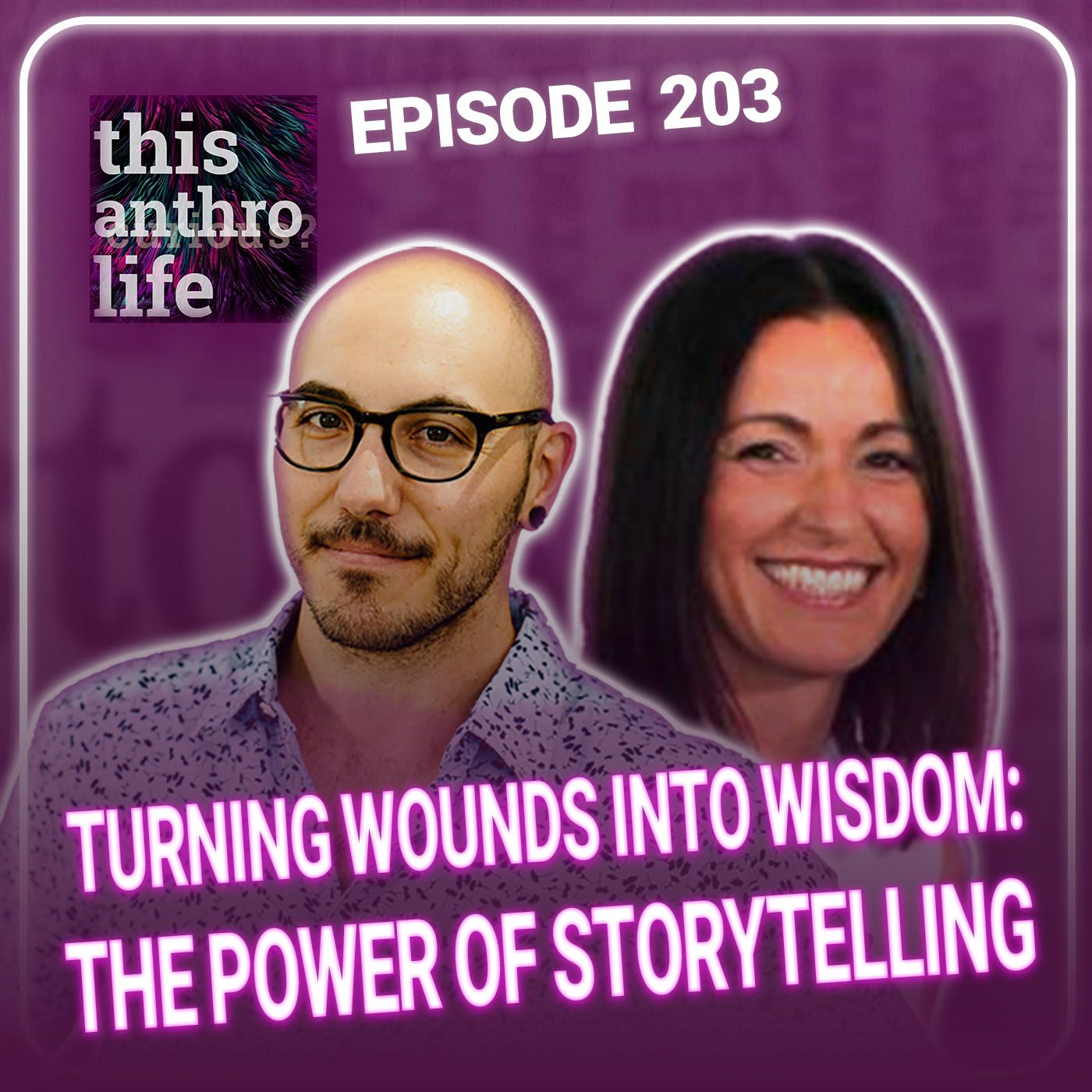
Turning Wounds into Wisdom: The Power of Storytelling with Sussi Mattsson
Have you ever pondered how acknowledging and reframing past trauma could be transformative?In this riveting episode of This Anthro Life, we delve into the profound impact of acknowledging and reframing past trauma as the initial step toward healing. Through the wisdom letter writing method, we uncover the process of identifying life lessons learned, enabling a deeper understanding of core values and beliefs. Discover how sharing our stories brings hope, fosters collective healing, and transforms leadership styles in the workplace.Join us in this engaging episode as we delve into acknowledging and reframing past trauma as the pivotal first step toward healing. Join us as we explore how sharing our stories brings hope and catalyzes collective healing, shaping our present and future. Together, we'll explore the profound impact of storytelling in creating a more empathetic and connected world.Timestamps0:00 Healing, leadership, and personal growth.1:02 Healing through writing and acknowledging past traumas.10:52 Healing through self-reflection and giving back. 4:39 Healing through storytelling and collective wisdom. 18:29 Storytelling, hope, and mental health. 23:25 Storytelling and leadership in the workplace. 29:11 Workplace trauma and leadership styles. 33:58 Using storytelling for personal growth and healing. Key Takeaways It's essential to acknowledge past traumas to initiate the healing process effectively.Understanding how past experiences shape current self-awareness is crucial for personal growth.Transforming the story we tell ourselves about past pain is key to releasing it and moving forward positively.Viewing traumatic experiences through a different lens can uncover valuable life lessons and aid in healing.Following a structured process, like the 5-step letter writing method, provides a roadmap for healing and growth.Sharing personal stories not only aids in personal healing but also contributes to collective understanding and empathy.Storytelling, through various mediums, is a powerful tool for healing and connecting with others.Addressing past trauma in leaders is essential for personal and professional growth, impacting leadership style and workplace dynamics. About This Anthro Life: This Anthro Life is a thought-provoking podcast that explores the human side of technology, culture, and business. Hosted by Adam Gamwell, we unravel fascinating narratives and connect them to the wider context of our lives. Tune in to https://thisanthrolife.org and subscribe to our Substack at https://thisanthrolife.substack.com for more captivating episodes and engaging content.Connect with Sussi Mattsson Instagram: https://www.instagram.com/sussi_mattsson/ inkedin: https://www.linkedin.com/in/sussi-mattsson-21279a3 Connect with This Anthro Life:Instagram: https://www.instagram.com/thisanthrolife/ Facebook: https://www.facebook.com/thisanthrolife LinkedIn: https://www.linkedin.com/company/this-anthro-life-podcast/ This Anthro Life website: https://www.thisanthrolife.org/ Substack blog: https://thisanthrolife.substack.com
41:1328/02/2024
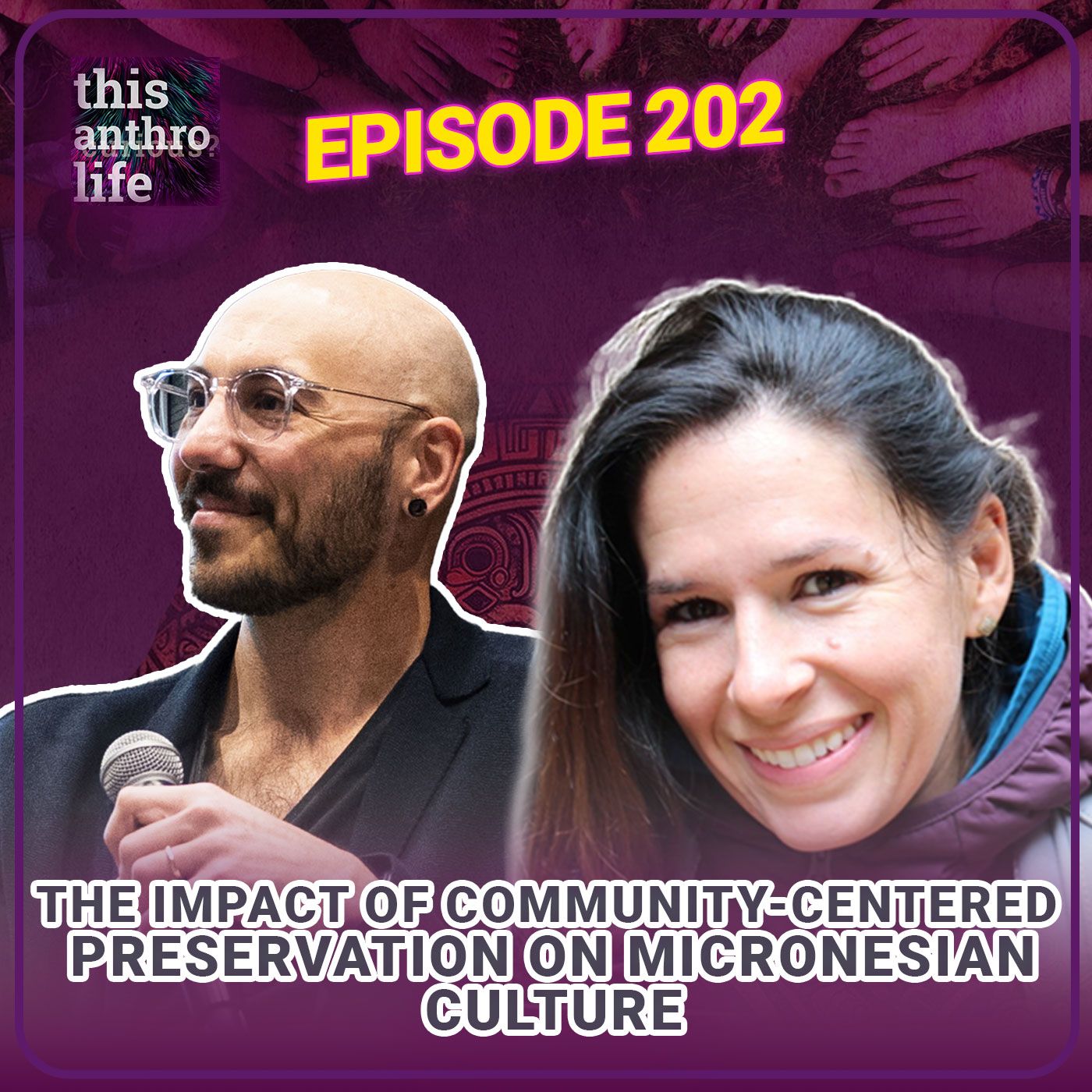
The Impact of Community-Centered Preservation on Micronesian Culture
How is the delicate balance between recording Micronesian cultural heritage, addressing community needs, and gaining international acknowledgment for preservation endeavors managed?Ashley in Micronesia collaborates with communities to identify research topics, stressing adaptability during fieldwork. Navigating linguistic intricacies, ethical dilemmas, and community preferences is essential while also promoting global recognition. In this episode of This Anthro Life, we delve into the intricate duties of a cultural anthropologist in Micronesia. Using ethnographic approaches, cultural heritage is documented and safeguarded while meeting community requirements. Remaining flexible during fieldwork is paramount, adjusting to local timetables and events. The complexities of language, including bilingualism, demand careful interpretation. We explore the intersection of historical preservation and conservation, highlighting how ethnography informs comprehensive project planning. Qualitative data's significance and interpretation are underscored, advocating for anthropology's broader accessibility. Furthermore, we discuss the importance of international acknowledgment in cultural heritage preservation, emphasizing ethical considerations and community involvement. Through this endeavor, the necessity of prioritizing communities and ensuring their active participation in preservation endeavors is exemplified.Timestamps1:24 Ethnographic approach and community involvement in research14:34 Language and code-switching in Micronesian cultures24:58 Ashley's switch from applied linguistics to anthropology32:20 The value of anthropology as a holistic discipline and the need for more examples of its integration37:22 The need to consider the human component in metadata and the limitations of AI in capturing human interaction42:33 Surprising aspects of being a cultural anthropologist in Micronesia46:03 Bringing together various interests in anthropology49:45 The systematic process of preparing UNESCO nominations54:01 Ethical considerations in community involvement for UNESCO nominations1:03:05 The impact of a dedicated Historic Preservation Officer and the importance of documentation Key takeawaysUnderstanding community needs informs culturally sensitive research and enhances the impact of preservation efforts.Recognizing and promoting the diverse cultural heritage of Micronesia is essential for its preservation and promotion.Prioritizing storytelling and knowledge transmission preserves Micronesian culture and fosters intergenerational understanding.Balancing international recognition with indigenous sacred lands requires careful ethical engagement with local communities.Effective cross-cultural communication and understanding cultural nuances are critical in navigating linguistic diversity during research.Flexibility in fieldwork schedules ensures meaningful community participation and engagement in preservation activities.Integrating tangible and intangible cultural elements in preservation strategies ensures comprehensive conservation efforts.Prioritizing qualitative data allows for a deeper understanding of cultural contexts, enriching preservation initiatives.Engaging in international recognition ethically involves ensuring community involvement and understanding for balanced preservation outcomes.About This Anthro Life:This Anthro Life is a thought-provoking podcast that explores the human side of technology, culture, and business. Hosted by Adam Gamwell, we unravel fascinating narratives and connect them to the wider context of our lives. Tune in to https://thisanthrolife.org and subscribe to our Substack at https://thisanthrolife.substack.com for more captivating episodes and engaging content.Connect with Ashley MeredithWebsite: https://nach.gov.fm/ Linkedin: https://fm.linkedin.com/in/ameredith1 Connect with This Anthro Life:Instagram: https://www.instagram.com/thisanthrolife/ Facebook: https://www.facebook.com/thisanthrolife LinkedIn: https://www.linkedin.com/company/this-anthro-life-podcast/ This Anthro Life website: https://www.thisanthrolife.org/ Substack blog: https://thisanthrolife.substack.com
01:05:1522/02/2024
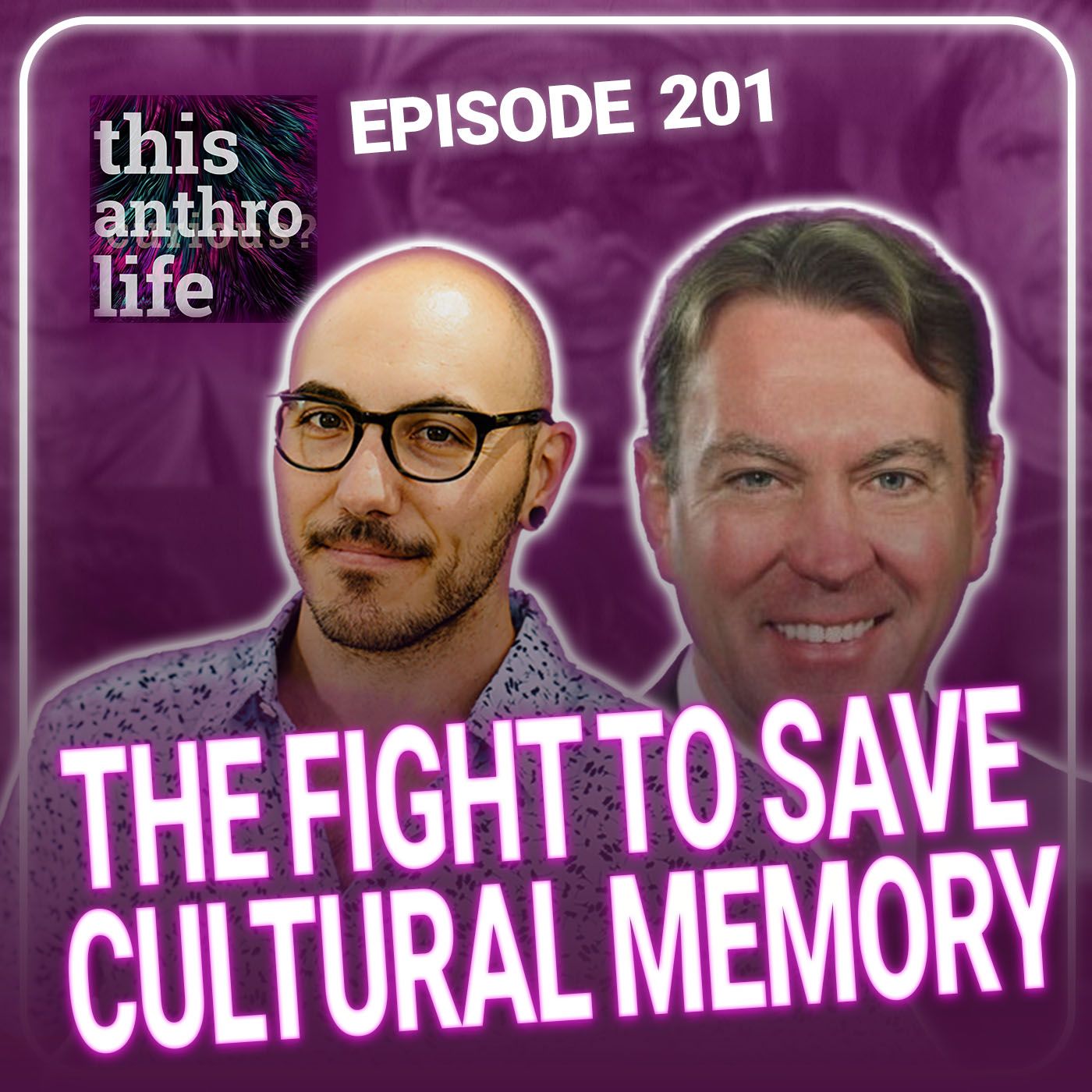
The Fight To Save Cultural Memory With Charles Henry
How can we use CLIR's help to protect our cultural heritage during climate change? Could telling stories be a big help in keeping our culture alive? Why must we work together to fight climate change and save our heritage? And can technology bring together businesses and academics to help with this?In this episode of This Anthro Life, we talk with Charles Henry, President of the Council on Library and Information Resources (CLIR), about protecting our cultural heritage during challenges like climate change. Charles explains how CLIR supports institutions with resources and funding to make their projects more impactful globally. We stress the importance of storytelling in preserving cultural memory and the need for cooperation to tackle climate change. We also discuss how competitive models between business and academia fall short and how digital technologies can help bridge these gaps.We discuss the serious threat climate change poses to our cultural heritage, including both physical artifacts and traditions. We talk about how things like rising sea levels, droughts, fires, and other climate-related events endanger our cultural history. Additionally, we mention the importance of digital technologies like the International Image Interoperability Framework (IIIF) in creating a neutral platform for collaboration and knowledge exchange, which is crucial for safeguarding cultural heritage against climate-related risks.Join us for an engaging and thought-provoking conversation with Charles Henry as we delve into the crucial topic of preserving our cultural heritage in the face of climate change. Discover how organizations like CLIR are making a global impact by providing resources and funding. Explore the power of storytelling in safeguarding cultural memory and the importance of cooperation in tackling climate challengesTimestamps:02:05 - Charles' Journey into Libraries and Digital Information08:36 - Making Rare Materials Accessible: The Digitizing Hidden Collections Project11:43 - Preserving Audiovisual Materials at Risk12:16 - Building Networks in the GLAM Community16:27 - Challenges Facing Higher Education Institutions19:56 - The Importance of Collaboration in Strategic Plans21:41 - Climate Crisis Threats to Cultural Heritage29:39 - The Power of Storytelling in Driving Change37:53 - Introduction to the International Image Interoperability Framework (IIIF)45:12 - Technology's Role in Preserving Cultural Heritage Key Takeaways:Climate change can damage cultural stuff like old things and traditions because of floods and bad weather.The Council on Library and Information Resources helps libraries save old things by giving them money and support.Stories can bring people together, but the internet makes it hard for people to work together.The Digital Library of the Middle East is a good example of how the internet can save old stuff from dangerous places.Standards like the International Image Interoperability Framework help people share and learn about old things online.About This Anthro Life:This Anthro Life is a thought-provoking podcast that explores the human side of technology, culture, and business. Hosted by Adam Gamwell, we unravel fascinating narratives and connect them to the wider context of our lives. Tune in to https://thisanthrolife.org and subscribe to our Substack at https://thisanthrolife.substack.com for more captivating episodes and engaging content.Connect with Charles Henry:Website: https://www.clir.org/ Linkedin: https://www.linkedin.com/in/charles-henry-7007048 Twitter: https://twitter.com/CLIRnews/ Connect with This Anthro Life:Instagram: https://www.instagram.com/thisanthrolife/ Facebook: https://www.facebook.com/thisanthrolife LinkedIn: https://www.linkedin.com/company/this-anthro-life-podcast/ This Anthro Life website: https://www.thisanthrolife.org/ Substack blog: https://thisanthrolife.substack.com
47:4316/02/2024
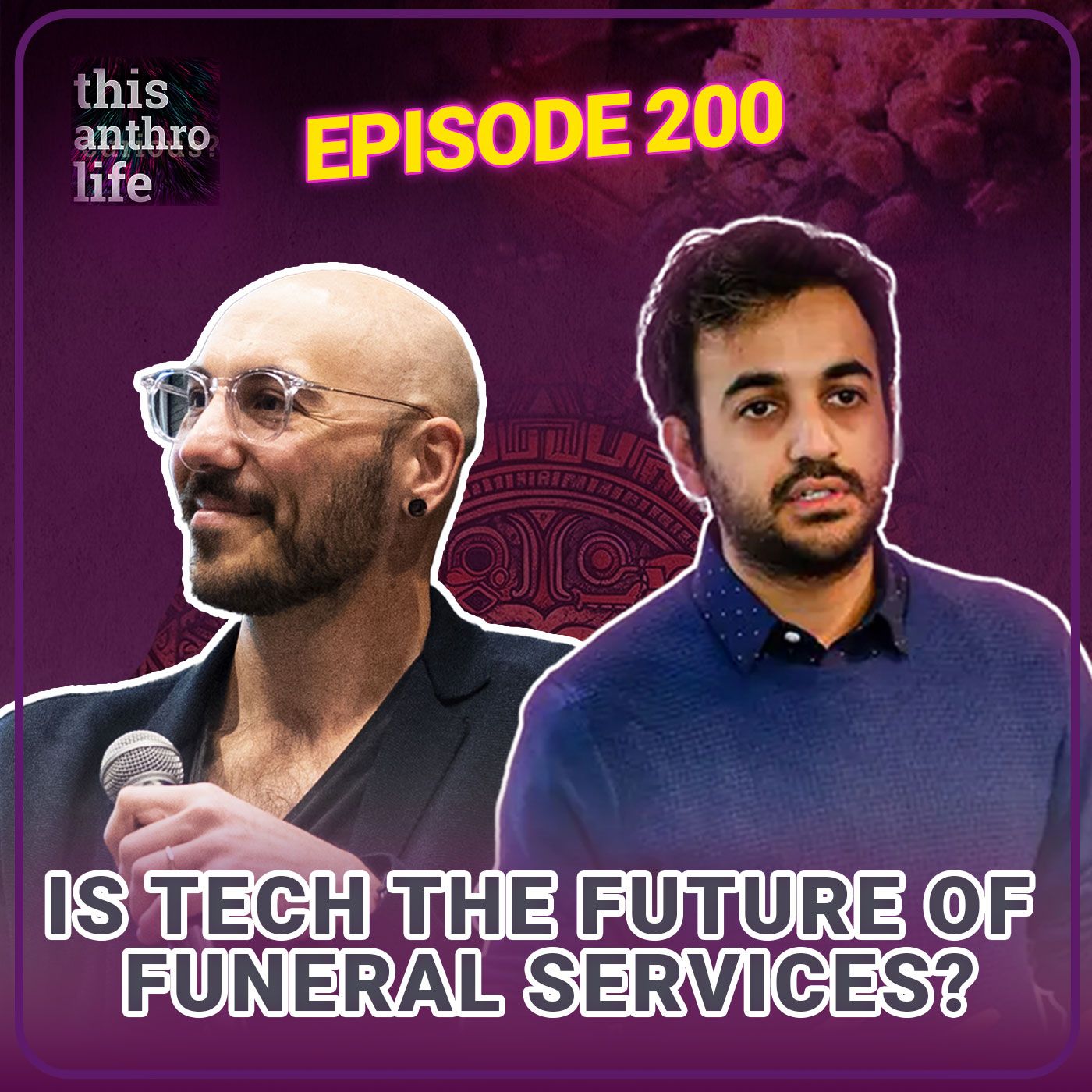
Is Tech the Future of Funeral Services?
How is technology transforming end-of-life care experiences, and why are AI and automation crucial in reshaping the funeral industry? In what ways are cultural norms around grieving shifting, and what does the future hold for personalized and meaningful ways to honor loved ones?In this episode of The Anthro Life, we delve into the intersection of technology and compassion in the field of end-of-life care. Faisal Abid, founder of Eirene Cremations, shares his journey from working in AI to revolutionizing the funeral industry by combining technology and empathy. We explore how Irene Cremations uses innovative tools like Funeral OS and Obituary Writer to streamline processes and empower families during the grieving process. Additionally, we discuss shifting cultural norms in end-of-life care and the potential future advancements in the industry.The discussion Faisal Abid covers topics such as the use of technology to automate administrative tasks in the funeral industry, the development of AI tools to assist families in writing meaningful obituaries, and the importance of transparency and communication in end-of-life care. We also explore Irene Cremations' approach to providing flexible and personalized experiences for families, as well as the potential for technology to continue reshaping cultural norms surrounding end-of-life care.Join us for an enlightening discussion on leveraging technology like AI and automation, that end-of-life care can become more compassionate, efficient, and meaningful, allowing funeral directors to focus on providing personalized care to families.Timestamps: 00:02:10 Faisal shares his background in technology and AI.00:04:45 Discussion on the early stages of AI development and the challenges faced. 00:07:17 The importance of understanding language models and their limitations. 00:09:25 Language models can be perceived as human-like, emphasizing the need for education on their functionality. 00:10:39 Language models have limits on the amount of input they can process. 00:12:51 Language models will not suddenly become human-level intelligence. 00:17:02 Potential emergence of artificial consciousness in language models. 00:20:25 Exploration of different ways to interact with language models beyond chat interfaces. 00:30:08 Automation in the death care industry allows funeral directors to focus on families and serve more families. 00:45:10 Introduction to the technical details of the propagation bug. Key Takeaways:Technology should aid in fulfilling human needs, not replace them, emphasizing its role in enhancing, rather than supplanting, the human experience in end-of-life care.Integrating technology with compassion, as seen in Irene Cremations, redefines end-of-life care by providing efficient, personalized services that prioritize emotional support for families.Automation via technology streamlines funeral tasks, freeing professionals to focus on emotional support, and balancing efficiency with compassion in the delicate process of end-of-life care.Technology enables personalized, meaningful experiences, exemplified by Irene Cremations' tools, fostering deeper connections and honoring individual lives sensitively in the context of end-of-life care.Adapting to shifting cultural norms, like personalized celebrations of life, with technological flexibility, allows funeral homes to meet evolving preferences and provide more tailored services to families.Technology fosters transparent, real-time communication, crucial in end-of-life care, building trust and offering reassurance to families during the emotionally challenging process of bidding farewell to loved ones.Overcoming obstacles, such as regulatory hurdles and trust in new technologies, is essential. Embracing change and innovative solutions can lead to positive transformations in end-of-life care, benefiting families profoundlyAbout This Anthro Life This Anthro Life is a thought-provoking podcast that explores the human side of technology, culture, and business. Hosted by Adam Gamwell, we unravel fascinating narratives and connect them to the wider context of our lives. Tune in to https://thisanthrolife.org and subscribe to our Substack at https://thisanthrolife.substack.com for more captivating episodes and engaging content.Connect with Faisal Abid:Website: https://eirenecremations.com/ Linkedin: https://ca.linkedin.com/in/faisalabid Twitter: https://x.com/FaisalAbid?s=20 Connect with This Anthro Life:Instagram: https://www.instagram.com/thisanthrolife/ Facebook: https://www.facebook.com/thisanthrolife LinkedIn: https://www.linkedin.com/company/this-anthro-life-podcast/ This Anthro Life website: https://www.thisanthrolife.org/ Substack blog: https://thisanthrolife.substack.com
56:0209/02/2024
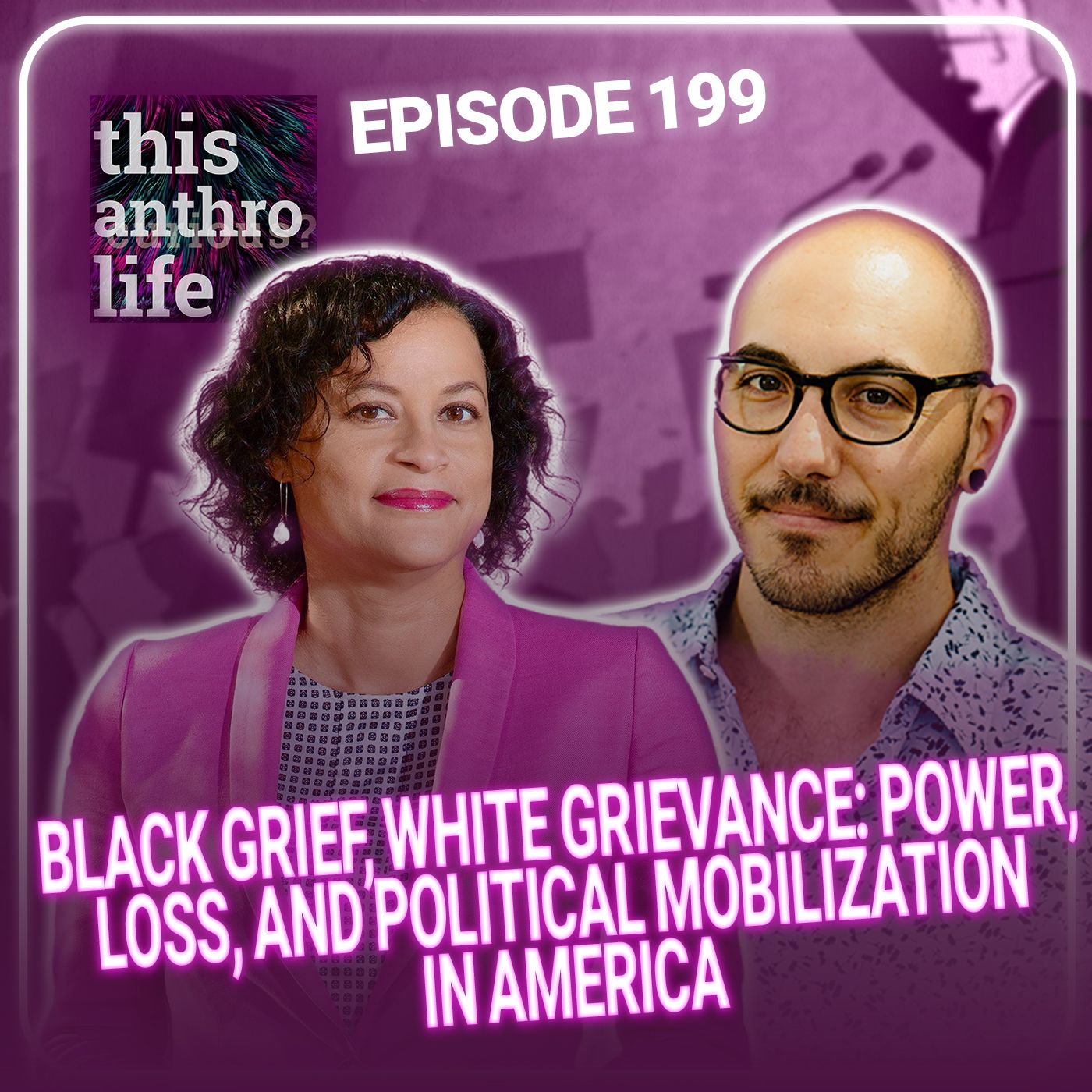
Black Grief, White Grievance: Power, Loss, and Political Mobilization in America
Why does democracy inherently involve loss, and how do black grief and white grievance shape the intricate landscape of contemporary racial politics in the United States?In this insightful episode, we unravel the intricate dynamics of racial politics in the U.S. Democracy's inherent tension and the intersection of black grief and white grievance take center stage, shaping political activism. We explore the personal costs of activism through figures like Mamie Till-Mobley and Erica Garner, challenging expectations on black communities. Beyond sensationalized violence, the episode emphasizes everyday black experiences, humanizing individuals and urging a broadened perspective. As the 2024 election looms, it reflects on the persistent influence of white grievance and hopeful movements like Occupy Wall Street. "Echoes of Change" calls for collective efforts to address unequal power distribution and create a more inclusive democracy that honors the diverse experiences of its citizens.Join this conversion as we delve into the complex dynamics of black grief and white grievance with Dr. Juliet Hooker. Discover how loss shapes our political landscape and the implications for a more inclusive democracy. we explore the intersection of race, politics, and loss in this episode with Dr. Juliet Hooker, as she shares her groundbreaking research on black grief and white grievance, offering valuable insights into our current racial politics.Timestamps: 05:33 - Juliet Hooker's journey into political science and focus on race and politics09:38 - Introduction to the main topics of the book: black grief and white grievance13:19 - Discussion on white grievance as a response to perceived or real harm18:32 - Reflection on the need to give Black people the ability to be fully human23:32 - Resisting the expectation to move from grief to activism quickly29:30 - Highlighting the importance of telling quotidian stories and humanizing individuals34:40 - Tension between black voters and the Democratic Party38:43 - Examples of big thinking and social movementsKey Takeaways:Democracy involves inevitable losses, requiring acknowledgment for a more equitable society.Black grief and white grievance shape contemporary US racial politics, with black grief driving activism and white grievance stemming from perceived harm.Recognizing the unequal burden on black communities as sacrificial political heroes is crucial, necessitating space for grief without immediate pressure for activism.Black Grief and White Grievance: The Politics of Loss" explores these dynamics, emphasizing the catalyzing role of black grief and the fear-driven nature of white grievance.Acknowledging the toll on activists like Mamie Till-Mobley and Erica Garner is crucial, challenging the expectation for constant black leadership in activism.Moving beyond sensationalized violence, recognizing ordinary aspects of black lives, such as Eric Garner's work, shifts the narrative from death to life.Despite white grievance's impact, hope lies in movements like Occupy Wall Street and the Movement for Black Lives, contingent on addressing the unequal distribution of political power.Connect with Dr. Juliet Hooker:Twitter: https://twitter.com/creoleprof Website: https://juliethooker.com/about/ Connect with This Anthro Life:Instagram: https://www.instagram.com/thisanthrolife/ Facebook: https://www.facebook.com/thisanthrolife LinkedIn: https://www.linkedin.com/company/this-anthro-life-podcast/ This Anthro Life website: https://www.thisanthrolife.org/ Substack blog: https://thisanthrolife.substack.com
44:2431/01/2024
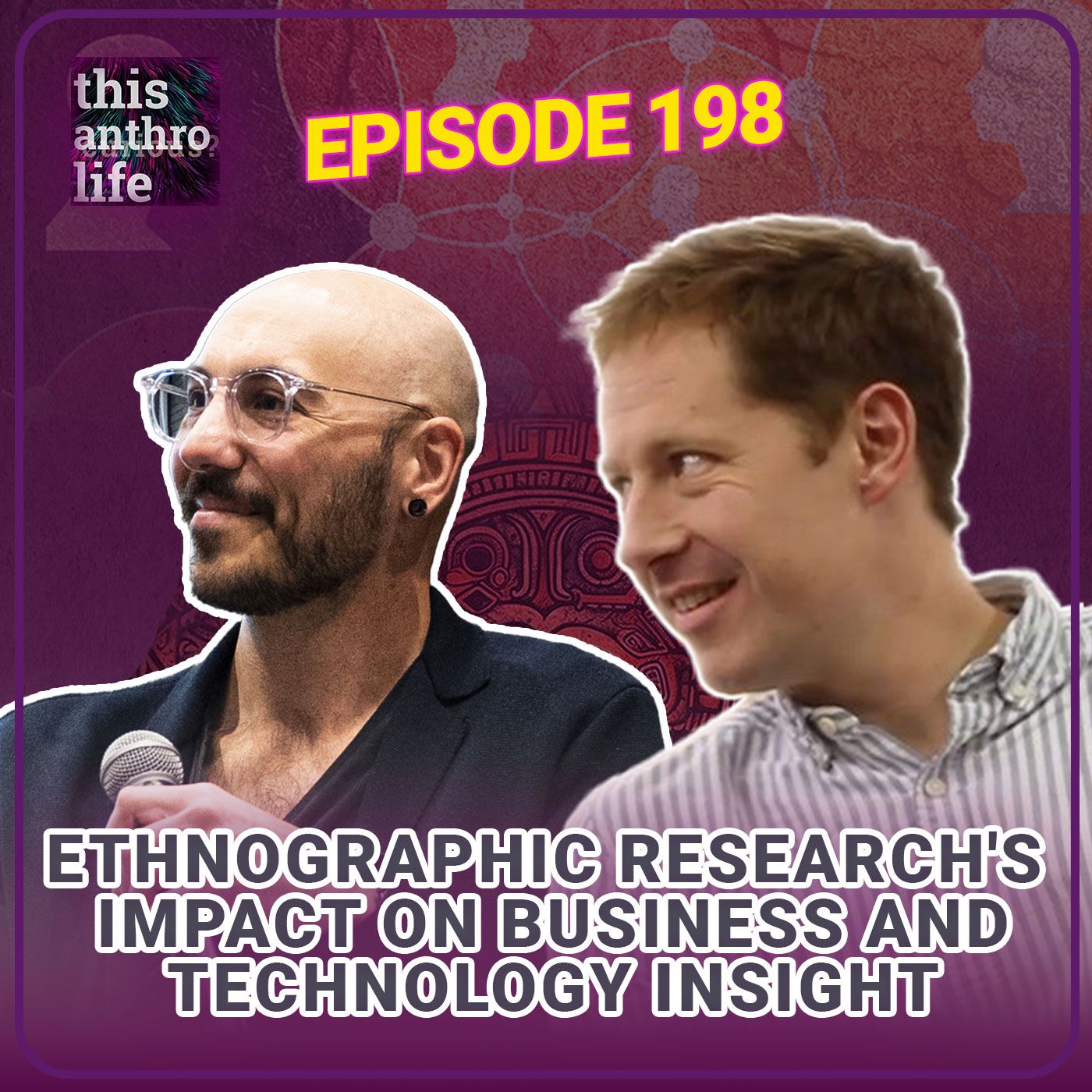
How Ethnographic Research is Shaping the Future of Insight in Business and Technology
How can businesses effectively integrate insights from social sciences like psychology and anthropology to gain a deeper understanding of human behavior, and how might this integration impact decision-making and innovation within the corporate world?In this thought-provoking episode of This Anthro Life,Oliver explores the fusion of social sciences and business, sharing his journey from psychology to incorporating anthropology at Ipsos. He emphasizes the importance of merging disciplines for a deeper understanding of human behavior in the corporate world, advocating for revisiting foundational research frameworks and creating tailored ones.Oliver addresses challenges in translating academic language to business-friendly terms and highlights storytelling's crucial role in effective idea dissemination. The integration of psychology and anthropology insights enables businesses to comprehend human behavior, fostering innovation and informed decisions. The episode reveals the transformative impact of the evolving world, where interconnectedness and technological advancements shape human behavior. Oliver discusses the risks and benefits of applying behavioral science in business, stressing ethical considerations.Join the conversation to learn more about collective effervescence in human culture, a connection that eludes technology's grasp. Oliver's insights provide a roadmap for businesses navigating the evolving landscape, emphasizing a holistic approach rooted in social science principles.Timestamps: 01:19 - Oliver discusses the challenge of bringing social sciences into business05:42 - The importance of rephrasing academic language for business communication09:15 - The need for anthropology to improve its PR14:41 - Examples of behavioral interventions that had unintended consequences17:16 - The predictive drivers of behavior and the narcissism of small differences20:10 - Applying behavioral prediction in business and marketing26:57 - Importance of in-person ethnographic research32:22 - Gen Z's drinking habits and the impact of surveillance37:58 - The barrier created by technology in sharing experiences44:05 - The plausibility of AI answers and the danger of fat thinkingKey Takeaways:Incorporate social sciences, particularly anthropology, for understanding human behavior in a changing world.Visit and adapt behavioral science frameworks, recognizing their social science roots.Reframe academic language in business research to resonate with stakeholders.Understand connections between people for predicting and shaping future trends.Use ethnographic research for a profound understanding of culture and human behavior.Exercise caution in applying behavioral science, acknowledging its limitations and potential unintended consequences.Consider the impact of AI on human behavior, balancing its benefits with potential dangers and emphasizing fact-checking.Preserve technology-free spaces for fostering human connection and collective experiences.Connect with Oliver Sweet:Linkedin:https://www.linkedin.com/in/oliver-sweet-73671018/?originalSubdomain=uk Website: https://www.ipsos.com/en/listen-us-selection-ipsos-finest-podcasts Connect with This Anthro Life:Instagram: https://www.instagram.com/thisanthrolife/ Facebook: https://www.facebook.com/thisanthrolife LinkedIn: https://www.linkedin.com/company/this-anthro-life-podcast/ This Anthro Life website: https://www.thisanthrolife.org/ Substack blog: https://thisanthrolife.substack.com
53:2425/01/2024
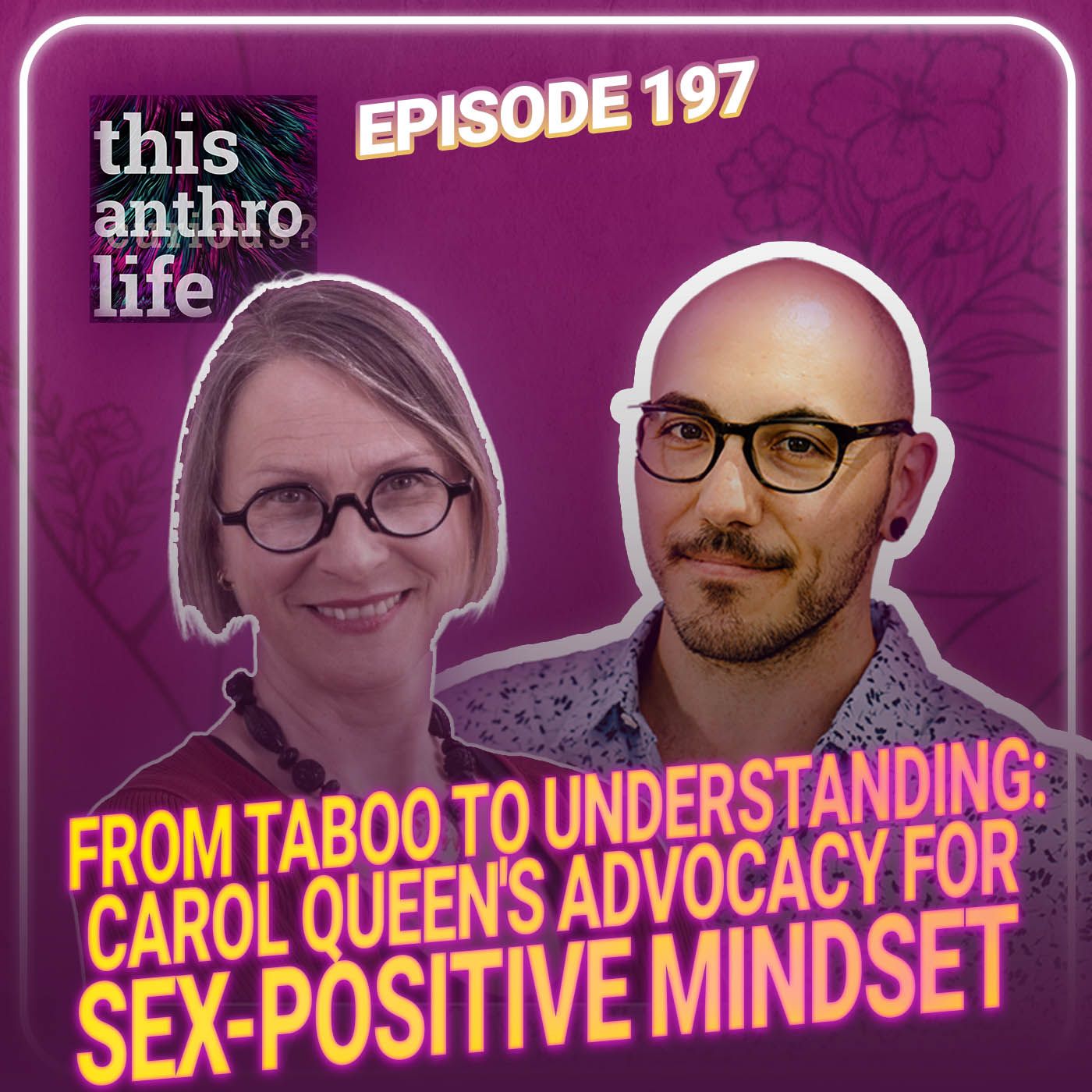
From Taboo to Understanding: Carol Queen's Advocacy for Sex-Positive Mindset
Have you considered the untold stories in our perceptions of sexuality? How do community strength, the role of play and toys in sexual exploration, and the promotion of sex positivity, as seen through Carol's insights, contribute to fostering a more inclusive society?In this captivating episode of This Anthro Life, we engage in a captivating conversation with Carol Queen, a renowned sexologist and advocate for sex positivity. Carol delves into her personal journey within the realm of sexology, emphasizing the imperative nature of embracing and understanding our sexuality. She unravels the historical influences on societal attitudes towards sex and passionately advocates for open discussions on sexual orientation, pleasure, and diversity. This episode explores the impact of shame on limiting our comprehension of diverse sexual experiences and underscores the power of community, the role of play and toys in sexual exploration, and the overarching importance of a sex-positive mindset for a more inclusive society.Join me in this thought-provoking conversation with Carol Queen as we explore the history of sexology and the power of sex positivity. Learn how embracing diversity and pleasure can lead to a more compassionate and understanding society. Timestamps: 00:00 - Introduction and background of guest05:19 - Guest's journey into the world of sexology12:30 - Importance of connecting with others and forming communities19:34 - Navigating personal identity in relation to societal norms27:31 - Breaking down shame and the importance of open conversations33:16 - Suggests taking a class to learn about sexuality and gender40:44 - Discusses the importance of understanding history in relation to sexuality and gender48:27 - Highlights the need to address shame and engage in open conversations56:24 - Emphasizes the relevance of anthropology and sociology in addressing societal issues1:04:07 - The societal control and diverse perspectives on sex, partnership, and identityKey Takeaways:Embracing and understanding our sexuality is essential for personal growth and well-being.Historical influences significantly shape societal attitudes towards sex and sexual orientation.Shame can impede open conversations about sex, restricting our acceptance of diverse sexual experiences.Sex positivity fosters a healthy and inclusive approach to sex, prioritizing pleasure, consent, and diversity.Play and toys are valuable tools for sexual exploration and self-discovery, contributing to a fulfilling and enriching sexual journey.Connect with Carol Queen:Linkedin: https://www.linkedin.com/in/carolq1 Website: https://carolqueen.com/ Her Book: Good Vibrations Sex Doctor, Staff Sexologist Dr. Carol Queen - GoodVibes.com Connect with This Anthro Life:Instagram: https://www.instagram.com/thisanthrolife/ Facebook: https://www.facebook.com/thisanthrolife LinkedIn: https://www.linkedin.com/company/this-anthro-life-podcast/ This Anthro Life website: https://www.thisanthrolife.org/ Substack blog: https://thisanthrolife.substack.com
01:07:5717/01/2024
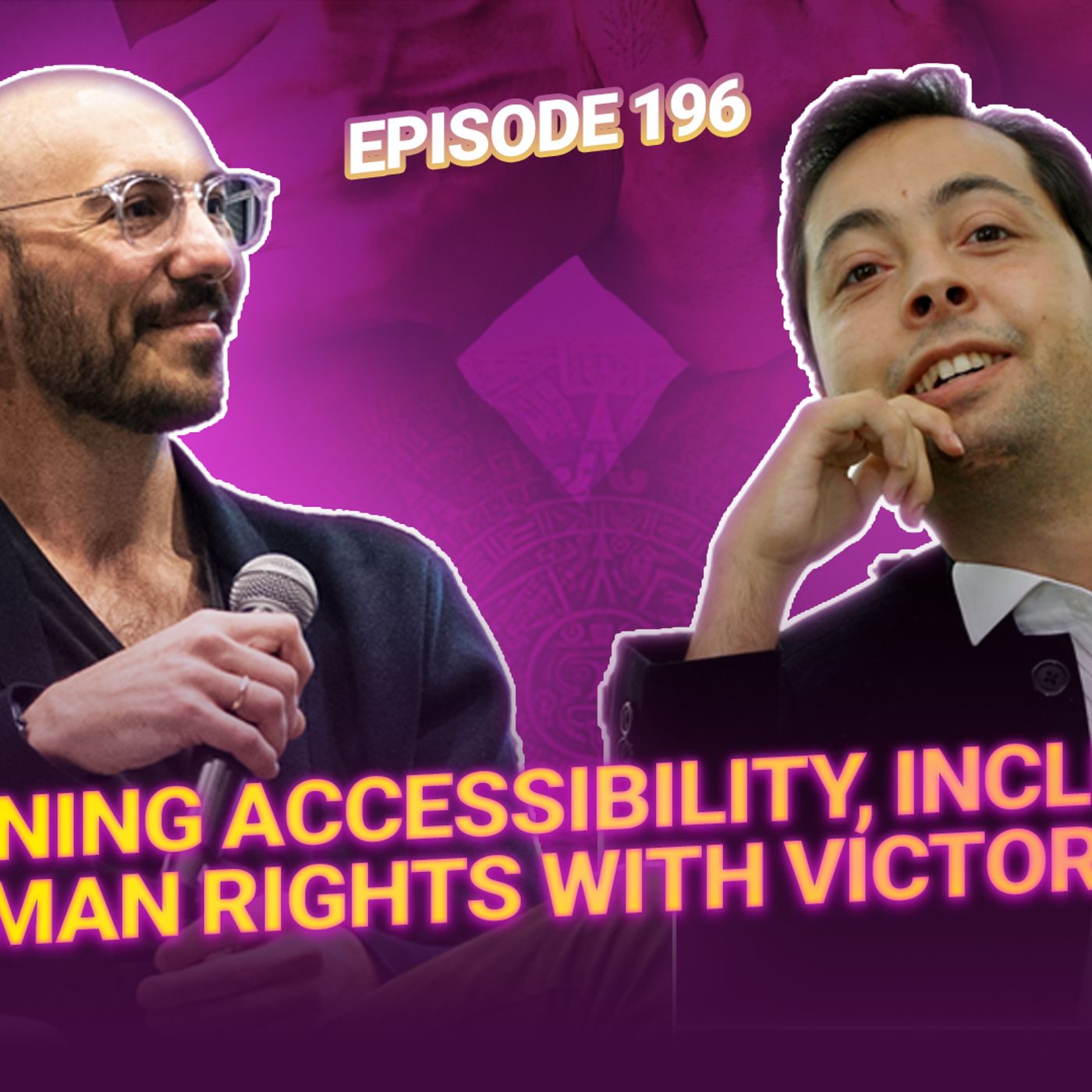
Redefining Accessibility, Inclusion, and Human Rights with Victor Pineda
How does the interplay between big systems-level questions and fundamental human questions in accessibility, disability rights, and human potential? In this captivating episode of This Anthro Life, we embark on a profound exploration of accessibility, disability rights, and human potential through an enthralling conversation with a distinguished expert who has devoted his life to these pivotal issues. The discussion delves deep into the intricate fusion of macro-level concerns related to policy and governance, seamlessly intertwining with deeply personal inquiries into identity and purpose. Victor Pineda, a multifaceted individual, sheds light on the profound significance of acknowledging and embracing the diverse spectrum of human emotions and experiences. His compelling insights challenge societal preconceptions about disability, advocating for a redefinition of worth that transcends limitations. The conversation touches upon themes of empowerment, the courage to pose meaningful questions, and the proactive endeavor to craft a better world through the avenues of technology, innovation, and inclusive governance. The far-reaching implications of this dialogue resonate with a compelling call for a societal shift towards inclusivity, diversity appreciation, and the empowerment of all individuals to thrive.Join us as they explore the themes of accessibility, disability rights, and human potential through the lens of a thought-provoking conversation with Victor Pineda at This Anthro Life and get to know the human potential.Timestamp00:00:00 Disability rights, human rights, and personal identity.00:02:00 Individuality, freedom, and empowerment.00:08:56 Disability, aspirations, and design.00:16:01 Objective and subjective experiences of flourishing in a chaotic world.00:24:56 Playfulness and unlocking human potential.00:30:05 Using technology for social impact and inclusivity.00:37:05 Anthropology, accessibility, and governance.00:40:55 Inclusive design in cities with a focus on accessibility and human rights.Key Takeaways:Recognition of the tapestry of human emotions and the pursuit of freedom.Challenging assumptions about disability and redefining notions of worth.Empowerment through the courage to ask meaningful questions.Designing a better world through technology, innovation, and inclusive governance.The potential for transformative impact on cities, institutions, and society.Embracing playfulness and curiosity for innovative solutions and positive experiences.The ongoing dialogue for a just and inclusive world amplifies marginalized voices.Connect with Victor PinedaLinkedin: https://www.linkedin.com/in/victorpineda Website: https://www.pinedafoundation.org/index.html Connect with This Anthro Life:Instagram: https://www.instagram.com/thisanthrolife/ Facebook: https://www.facebook.com/thisanthrolife LinkedIn: https://www.linkedin.com/company/this-anthro-life-podcast/ This Anthro Life website: https://www.thisanthrolife.org/ Substack blog: https://thisanthrolife.substack.com
45:5611/01/2024
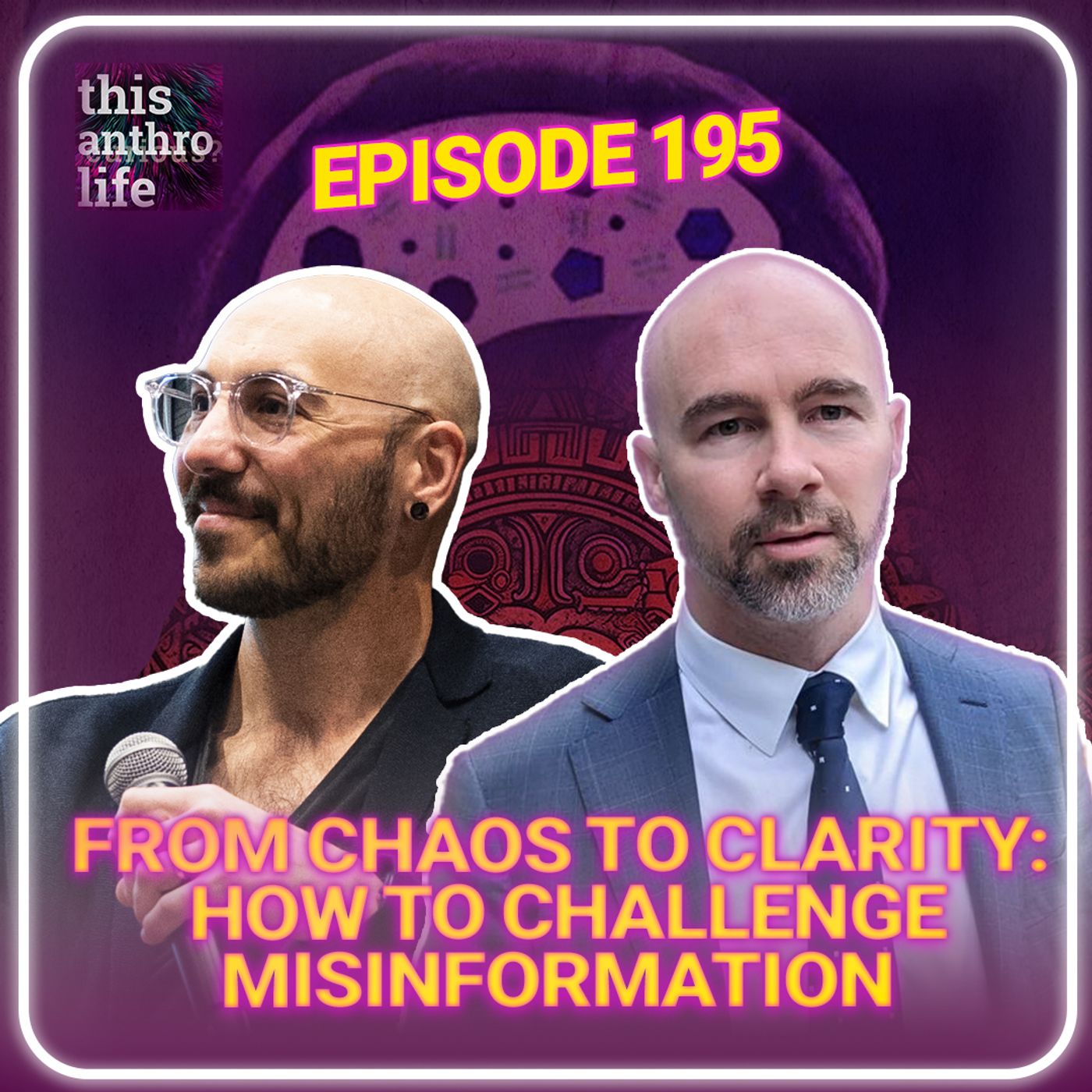
From Chaos to Clarity: How to Challenge Misinformation with James Mawhinney
What are the consequences of misinformation on personal relationships, business operations, and regulatory decisions? And how does the spread of misinformation pose an existential threat to society as a whole? What role does artificial intelligence play in the creation and proliferation of misinformation?In this thought-provoking episode of This Anthro Life, we delve deep into the chaotic world of misinformation and its potential existential threats. Our guest, James Mawhinney, founder of Media.com, shares his personal and harrowing journey through the eye of a misinformation storm that led to the creation of his platform, which aims to counteract the spread of misinformation and provide a space for individuals and organizations to manage their narratives and reputations.James recounts the story of his investment company, which, after successfully raising a significant amount of capital and investing in a diversified portfolio, faced a catastrophic turn of events.We discuss the broader implications of misinformation in today's digital age, where the speed and scale at which false information can spread pose significant risks to society. James argues that misinformation, exacerbated by artificial intelligence, is a greater threat than climate change due to its potential to cause immediate and widespread harm. The conversation also touches on the future of media and the coexistence of traditional media, social media, and new platforms like Media.com. James envisions a world where these platforms work in tandem to provide a more organized and credible information landscape, akin to a well-structured courtroom where both sides of a story can be heard.Join us as we discuss the growing threat of online misinformation with James Mawhinney at This Anthro Life and get to know how the spread of misinformation poses an existential threat to society!Timestamps:00:00:00 - Introduction to Misinformation and Media.com00:01:13 - James Mawhinney's Backstory and the Birth of Media.com00:11:51 - The Speed and Impact of Misinformation00:17:32 - Addressing Misinformation: The Role of Media.com00:22:26 - Business Model and Vision of Media.com00:30:54 - The Need for Verified Information Sources00:38:16 - Coexistence of Traditional and New Media Platforms00:40:42 - Engaging with Media.com for Accurate Information Sharing00:44:07 - Brand Management and Credibility on Media.com00:46:11 - Media.com's Launch and Future Plans00:48:04 - Closing Remarks and ReflectionsKey Takeaways:Misinformation poses an existential threat to society, spreading rapidly and causing significant harm.The speed at which information spreads on the internet and social media platforms is a major challenge in combating misinformation.Media.com was founded as a platform dedicated to countering misinformation and giving individuals and businesses the opportunity to respond and fight back.The platform aims to provide a safe space for individuals and businesses to respond to misinformation and share their official positions.Verification is a crucial aspect of Media.com, ensuring that profiles are authentic and credible.The platform aims to coexist with traditional media and social media, offering a centralized location for verified information.Businesses are increasingly concerned about their brand management and the credibility of the platforms they associate with.Connect with James MawhinneyLinkedin: https://www.linkedin.com/in/jamesmawhinney1/ Website: https://www.jamesmawhinney.com/ Connect with This Anthro Life:Instagram: https://www.instagram.com/thisanthrolife/ Facebook: https://www.facebook.com/thisanthrolife LinkedIn: https://www.linkedin.com/company/this-anthro-life-podcast/ This Anthro Life website: https://www.thisanthrolife.org/ Substack blog: https://thisanthrolife.substack.com
49:5004/01/2024
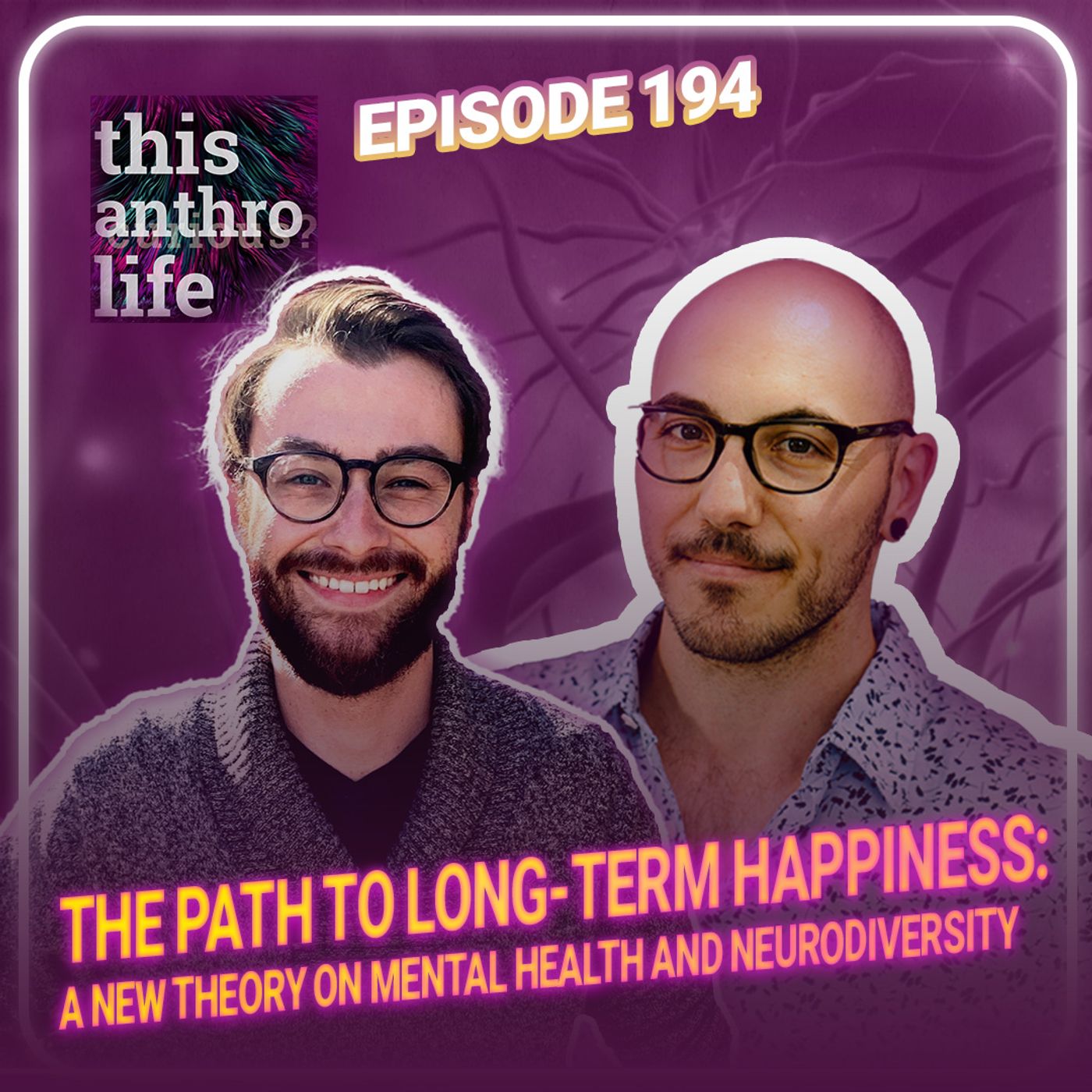
The Path to Long-term Happiness: A New Theory on Mental Health and Neurodiversity
The traditional view of mental health often focuses on the absence of mental illness, but a new theory is emerging that emphasizes the importance of neurodiversity and individual differences in the pursuit of long-term happiness. The question is, how can we reconcile the medicalization of mental health with the idea of neurodiversity and the unique strengths that come with different neurotypes?In this episode of This Anthro Life, we dive into a new perspective on mental health and well-being and how traditional models of mental illness focus only on treatment, not optimization of wellness. Ryan's work, which is detailed in his new book "Become Who You Are," offers a fresh perspective on how ancient philosophy and modern psychology intersect to address issues like anxiety and depression. He introduces the concept of "virtue signaling theory," which views traits like courage and compassion as evolutionary adaptations that helped humans navigate social hierarchies. Self-esteem evolved as a way to track social standing and regulate mood accordingly. Depression may result from a negative self-view due to lack of virtue expression.Moreover, throughout the conversation, we delved into the practical applications of Ryan's theory. He shared strategies for individuals at various points on the well-being scale, from those struggling with depression to those seeking to enhance their fulfillment in life. Ryan emphasized the importance of behavioral activation, identifying personal strengths, and creating virtue domains – areas in our lives where we can exercise and showcase our virtues. We also touched on the concept of eudaimonia, the ancient Greek term for the highest human good or "the good life," which Ryan believes is achieved through the cultivation of virtues. Ready to become who you are and find deeper happiness and fulfillment in life? Join us on This Anthro Life as we explore the importance of self-exploration and cultivating virtues with Ryan BushTimestamps: 00:01:33 - Ryan Bush's Journey and Interdisciplinary Approach00:03:58 - The Sociometer Theory of Self-Esteem00:05:54 - Understanding Self-Esteem and Virtue00:12:11 - The Causal Relationship Between Identity and Depression00:18:28 - Self-Improvement and Selfishness00:20:35 - Long-Term Selfishness and Altruism00:22:27 - Behavioral Activation and Virtue Cultivation00:25:19 - Virtue Domains and Life Fulfillment00:27:18 - Time Dimension in Virtue Domains00:29:25 - Personal Journey and Designing the Mind00:31:27 - The Search for Meaning and Virtue00:33:45 - The Importance of Practice in Virtue Cultivation00:35:39 - Simple Strategies for Behavioral Activation00:41:37 - Medicalization and Mental Health00:44:12 - Neurodiversity and Evolutionary Strengths00:46:23 - Frequency-Dependent Selection in Neurodiversity00:51:23 - Practical Philosophy and Well-BeingKey Takeaways:Traditional mental health models focus only on treatment, not optimization of well-being.Virtues like courage and compassion evolved as "fitness indicators" to help humans navigate social hierarchies.Self-esteem evolved to track social standing and regulate mood accordingly.Depression may result from a negative self-view due to lack of virtue expression.Behavioral activation can boost mood by engaging in virtue-expressing activities.Role models can help identify personal strengths to cultivate."Virtual domains" allow expression of virtues in meaningful pursuits.Brief suffering may occur through cultivation but should not be the goal.Well-being exists on a continuum, from depression to eudaimonia.About This Anthro Life This Anthro Life is a thought-provoking podcast that explores the human side of technology, culture, and business. Hosted by Adam Gamwell, we unravel fascinating narratives and connect them to the wider context of our lives. Tune in to https://thisanthrolife.org and subscribe to our Substack at https://thisanthrolife.substack.com for more captivating episodes and engaging content.Connect with Ryan BushLinkedin: https://www.linkedin.com/in/ryanabush/ Website: https://designingthemind.org/Order the book at: https://www.amazon.com/dp/B0CPCMWQG6 Connect with This Anthro Life:Instagram: https://www.instagram.com/thisanthrolife/ Facebook: https://www.facebook.com/thisanthrolife LinkedIn: https://www.linkedin.com/company/this-anthro-life-podcast/ This Anthro Life website: https://www.thisanthrolife.org/ Substack blog: https://thisanthrolife.substack.com
55:1427/12/2023
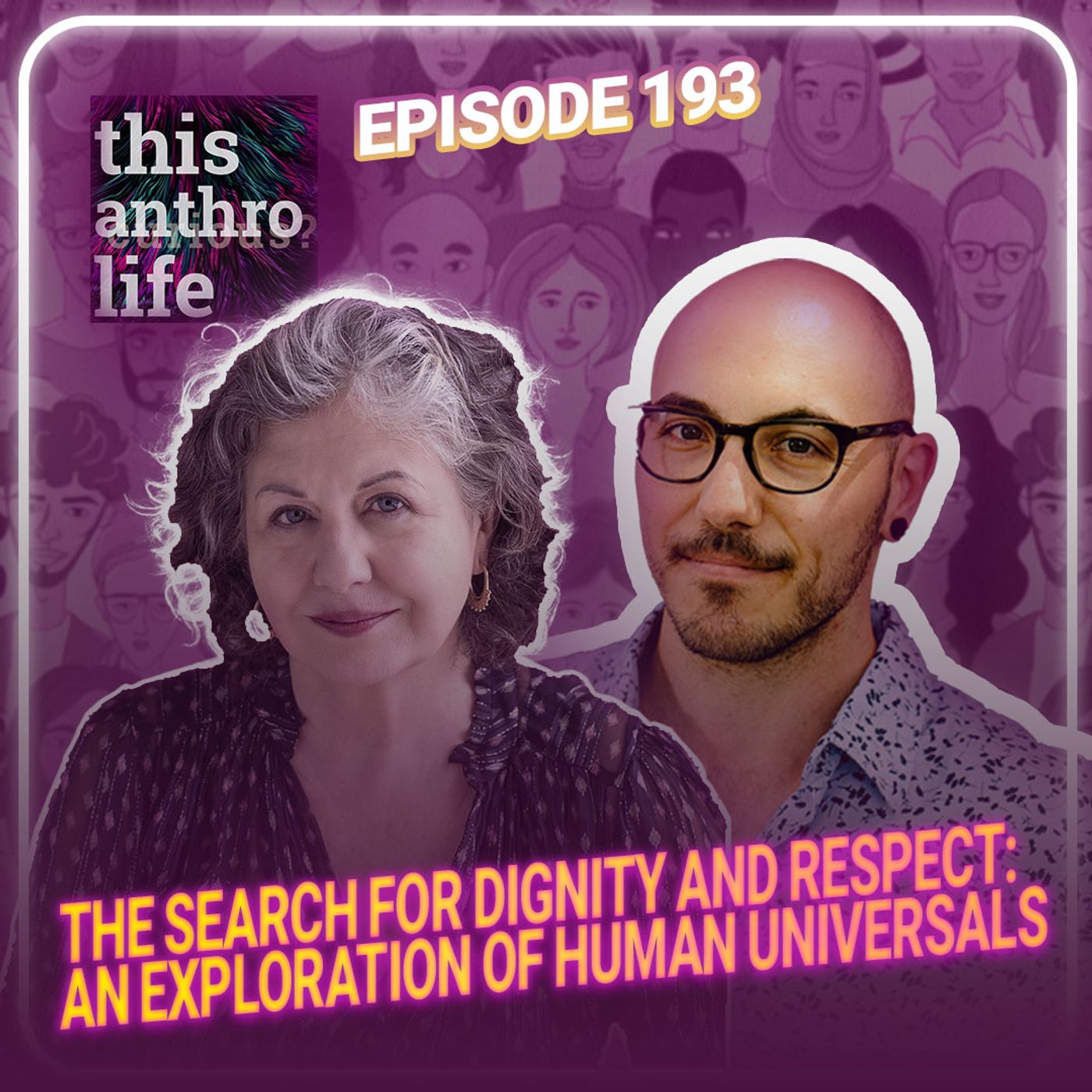
The Search for Dignity and Respect: An Exploration of Human Universals
How do narratives shape our understanding of shared human experiences like dignity and respect? And, in what ways can an emphasis on human universals through inclusive narratives help fulfill fundamental human desires for dignity and respect?In this episode of This Anthro Life, we explore these questions through a discussion with sociologist Michele Lamont and her research on narratives and society. Lamont's concept of "ordinary universalism" focuses narrative frameworks on common aspects of human dignity and respect rather than divisions. Evidence shows these universal needs are fundamentally sought. Generational attitudes found Gen Z prioritizes authentic self-expression and inclusion through exploring shared experiencesIn addition, Michele's research offers a unique perspective on societal trends through the lens of ordinary universalism. We also explore how Gen Z is leading the way towards a more inclusive culture and the role of narratives in driving philanthropic and political action. Michele’s examples demonstrate narrative's power to recognize structural barriers to dignity and mobilize action by cultivating understanding of our humanity. The episode emphasizes inclusive narratives to shape understanding and fulfillment of our common needs through storytelling.Join us for an enlightening discussion on understanding and embracing the perspectives of others. Timestamps: 00:01:07 - Discussing Erasure and Identity Recognition00:02:35 - The Power of Narrative in Social Fabric00:03:17 - Explaining Narratives to Non-Scholars00:07:24 - Public Sphere and Scaling Up Narratives00:13:28 - The Loss of the American Dream Across Classes00:14:24 - Gen Z's Rejection of the American Dream00:17:54 - Work-Life Balance and Gen Z's Values00:19:43 - The Role of Technology in Shaping Narratives00:21:26 - The Importance of Narrative in Policy and Philanthropy00:25:21 - Dignity and Respect as Fundamental Human Needs00:28:58 - The Shift from Individualism to Collectivism00:33:09 - Ordinary Universalism and Common Humanity00:36:15 - Political Language and Recognition00:40:17 - Side Hustles and Changing Work Identities00:46:38 - The Benefits of Embracing Inclusivity00:49:24 - Closing Thoughts and ReflectionsKey Takeaways:The concept of narratives is about how we perceive and understand the world through different lenses, which are influenced by social movements, media, and personal experiences.Gen Z is spearheading a shift towards a more inclusive culture and is seeking alternative narratives that go beyond the traditional American dream.The power of storytelling and narratives is crucial in changing hearts and minds for philanthropic and political action.The focus on dignity and respect is a fundamental need for individuals and communities, and it is essential to create a more inclusive and equitable society.The idea of ordinary universalism emphasizes finding common ground and recognizing our shared humanity, rather than focusing on divisions and competition.The role of philanthropies and organizations in scaling up narratives and promoting social change is crucial.The conversation also highlights the challenges of navigating differences and finding ways to coexist and tolerate diverse perspectives.The shift towards a more inclusive society requires a focus on inclusion in workplaces, education, and social interactions.Recognizing the humanity and worth of all individuals is essential for creating a more equitable and respectful society.About This Anthro Life This Anthro Life is a thought-provoking podcast that explores the human side of technology, culture, and business. Hosted by Adam Gamwell, we unravel fascinating narratives and connect them to the wider context of our lives. Tune in to https://thisanthrolife.org and subscribe to our Substack at https://thisanthrolife.substack.com for more captivating episodes and engaging content.Connect with Michele LamontWebsite: https://www.michelelamont.org/about Linkedin: https://www.linkedin.com/in/mich%C3%A8le-lamont-11542a151/ Twitter: https://x.com/mlamont6?s=20Order the book at: https://www.amazon.com/exec/obidos/ASIN/1982153784?tag=simonsayscom Connect with This Anthro Life:Instagram: https://www.instagram.com/thisanthrolife/ Facebook: https://www.facebook.com/thisanthrolife LinkedIn: https://www.linkedin.com/company/this-anthro-life-podcast/ This Anthro Life website: https://www.thisanthrolife.org/ Substack blog: https://thisanthrolife.substack.com
50:3520/12/2023
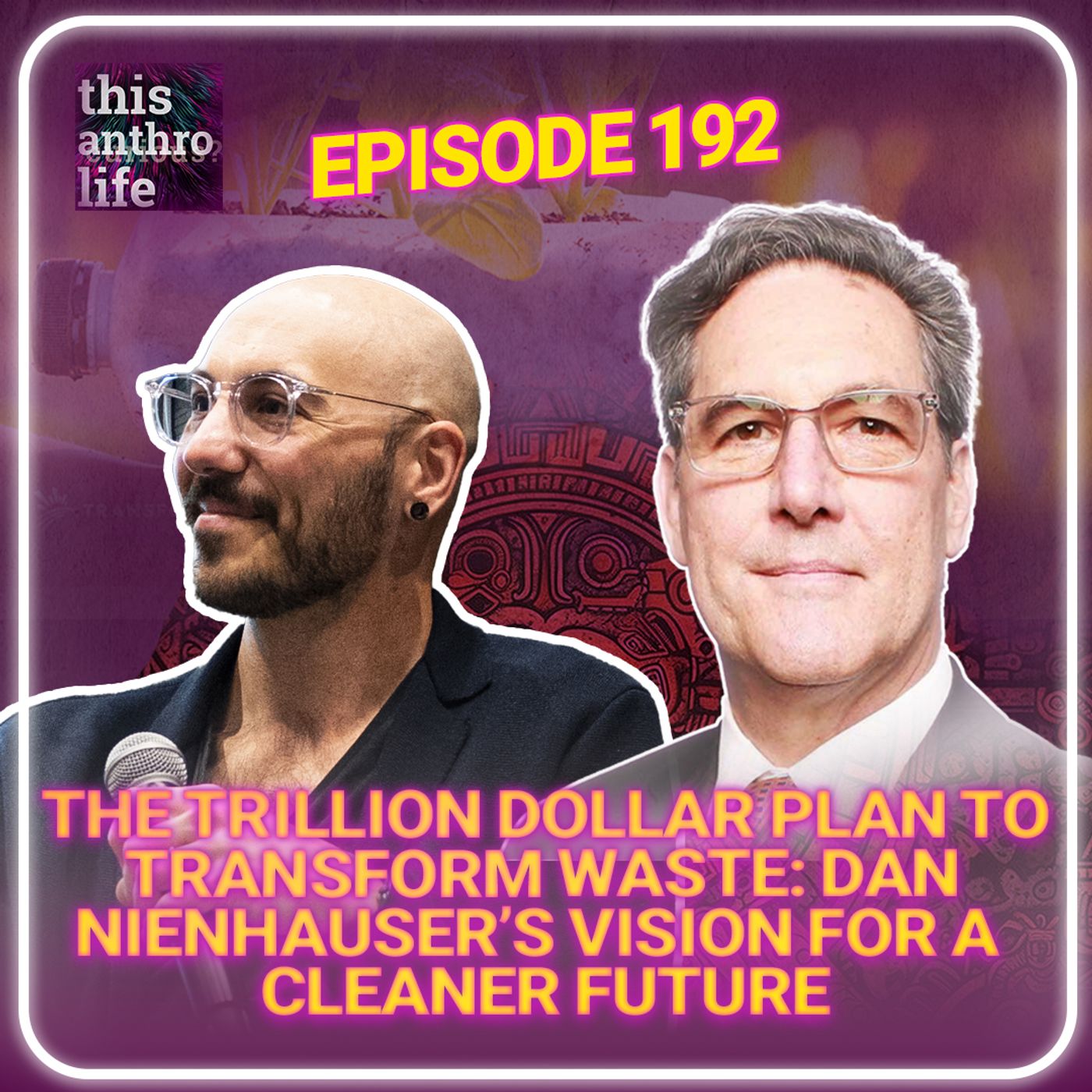
The Trillion Dollar Plan to Transform Waste: Dan Nienhauser’s Vision for a Cleaner Future
In the episode of This Anthro Life, the dialogue investigates waste transformation and how waste can be converted into useful energy and materials. Dan explains his work with Stellar Three focusing on pyrolysis technology that uses heat in an oxygen-free environment to break down plastics and other waste into synthetic gas, oils and carbon black. This process allows waste to be converted back into raw materials to make new plastics, chemicals and fuels.The conversation touches on the large scale of the global waste problem and opportunities to address it through diversified solutions tailored to different regional needs and economic contexts. Collaboration between organizations is emphasized to collectively advance solutions and public education around waste transformation is seen as important to gain broader support and participation in these efforts.Dan discusses various projects Stellar Three is working on around the world to implement this technology on a larger scale. He highlights how a single pyrolysis unit can service a small city and potentially power commercial developments through generating natural gas from waste. Machine learning and improved sorting technologies are also discussed to further optimize the waste transformation process over time.Don't miss the chance to learn about pyrolysis technology and its role in converting waste into synthetic gas, oils, and carbon black - listen to the episode of This Antro Life podcast now. Key takeaways:Pyrolysis is a promising technology for waste transformation using heat in oxygen-free conditions.Waste can be converted back into raw materials like plastics and chemicals through this process.Outputs can vary to suit regional needs like fuels in some areas and plastics in others.Projects are being implemented through modular units that can be scaled up and adapted over time.Improved sorting and machine learning can further optimize waste conversion efficiencies.Proper gas treatment is important to maximize value and minimize emissions.Waste transformation presents economic opportunities through new supply chains and jobs.Transparency is important to gain public trust in new waste solutions.Collaboration rather than competition is needed between organizations in this field.Significant investment is required but waste liabilities can be turned into energy assets.Timestamps:0:00:00 Waste energy and sustainability with industry expert Dan Nienhauser. 0:01:41 Waste transformation and circular economy.0:07:25 Waste management technologies and their potential to transform waste liabilities into energy assets.0:13:24 Converting plastic waste to fuel and chemicals. 0:19:15 Waste management and conversion technologies.0:24:20 Sustainable energy solutions and modularity in waste management.0:28:29 Plastic waste management and circular economy.0:32:46 Waste transformation and its potential impact.0:39:32 Waste transformation and its impact on communities and the environment. About This Anthro Life This Anthro Life is a thought-provoking podcast that explores the human side of technology, culture, and business. Hosted by Adam Gamwell, we unravel fascinating narratives and connect them to the wider context of our lives. Tune in to https://thisanthrolife.org and subscribe to our Substack at https://thisanthrolife.substack.com for more captivating episodes and engaging content.Connect with Dan NienhauserWebsite: https://www.stellar3.co/about-us.html Linkedin: https://www.linkedin.com/in/dannienhauser/ Connect with This Anthro Life:Instagram: https://www.instagram.com/thisanthrolife/ Facebook: https://www.facebook.com/thisanthrolife LinkedIn: https://www.linkedin.com/company/this-anthro-life-podcast/ This Anthro Life website: https://www.thisanthrolife.org/ Substack blog: https://thisanthrolife.substack.com
44:3213/12/2023
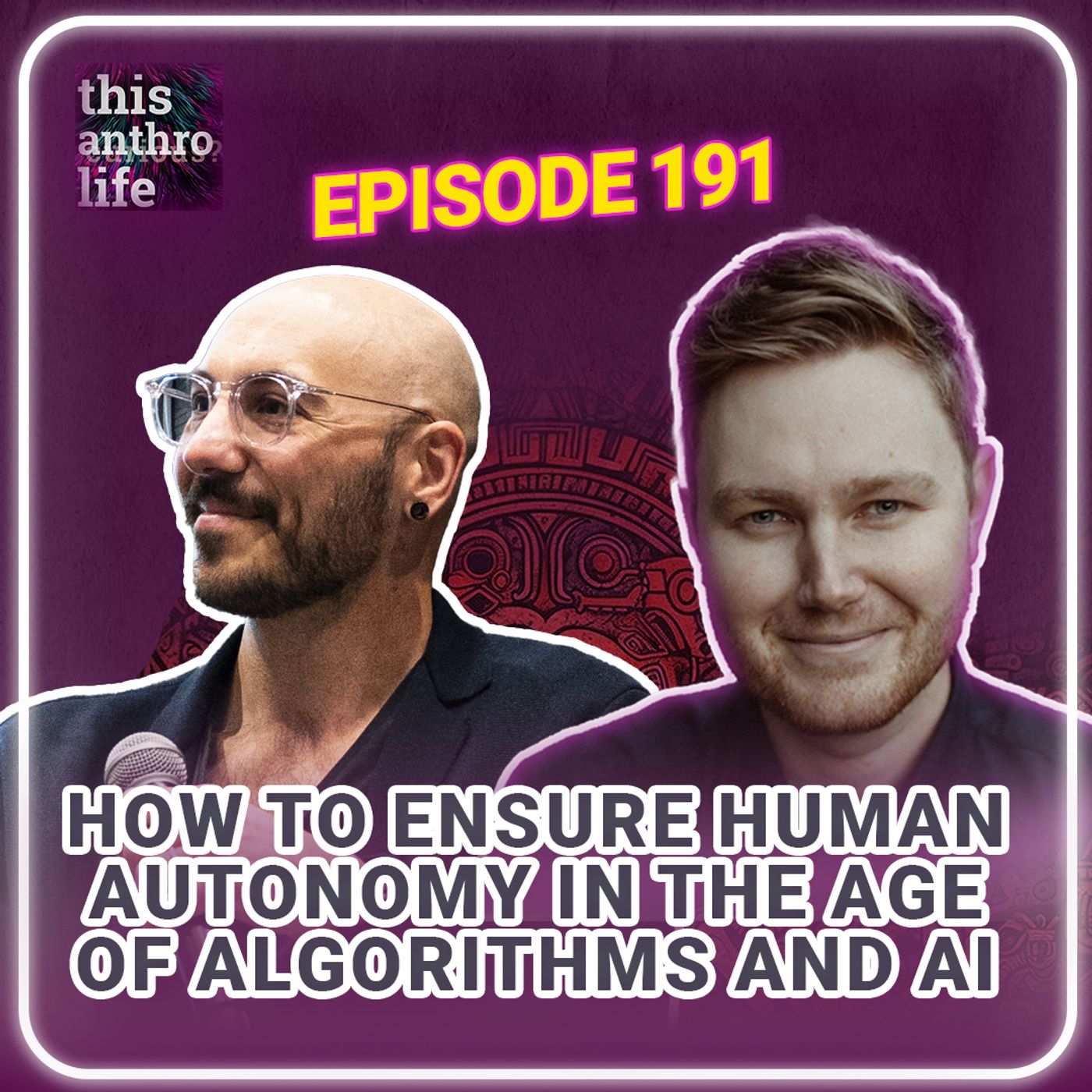
How to Ensure Human Autonomy in the Age of Algorithms and AI with Brian Evergreen
What does the concept of autonomy bring to mind for you?How has AI already begun reshaping how we work and make decisions? And do you think AI and algorithms should play a role in organizational decision-making? Why or why not? In the episode of This Anthro Life, the discussion delves into the intersection of human autonomy and the evolving landscape of AI. It emphasizes the need for diverse voices that prioritize human well-being, flourishing, and autonomy in the face of technological advancement. Brian's work, aimed at empowering leaders to prioritize people over profit and harness technology to enhance our humanity, underscores the importance of ensuring that AI serves humanity rather than subjugating it. The conversation also touches on the historical context of work, particularly during industrialization, where the focus was on efficiency over people. This highlights the need to reevaluate the role of AI in the workplace and consider how it can be harnessed to prioritize human values and autonomy. Brian's framework for autonomous transformation emphasizes the importance of envisioning the future before technologies, ensuring that people feel a sense of belonging and purpose in the face of technological advancement. It underscores the unique capabilities of humans, such as belonging, exploration, and envisioning future states, and emphasizes the complementary relationship between humans and machines. Key takeaways:The importance of envisioning what future state an organization wants to createExamples of working with companies to define their vision, challenges, and strategic approachThe role of autonomy in transformation and moving from digital to autonomous systemsHow AI is highlighting the need for a renewed focus on culture and the human experienceDifferences between leaders who view people as expendable vs. those who don'tThe time lag between deciding to use new tech and it being developed for productionHow leaders can focus on expanding revenue through new opportunitiesThe history of how work was set up during the industrial revolutionTransforming beyond viewing organizations like mechanical systems and people as cogsThe potential for technologies like AI to take work off humans' plates and elevate them to more creative rolesTimestamps:0:00:00 AI's impact on work and society with Brian Evergreen0:01:49 Chess and music experiences and their impact on leadership.0:06:29 Autonomy in workplace transformation.0:12:22 Work history and technological change.0:20:07 AI's impact on organizational culture and success.0:25:43 Balancing profit and doing good with AI.0:29:43 Profit, greed, and altruism in business.0:33:09 AI strategy and its implementation.0:43:23 Improving worker experience in a manufacturing setting.0:48:09 AI, human capabilities, and belonging in organizations.0:51:05 AI's impact on jobs and leadership.0:56:31 Leadership, technology, and decision-making.1:00:54 Autonomous transformation with Brian Evergreen. About This Anthro Life This Anthro Life is a thought-provoking podcast that explores the human side of technology, culture, and business. Hosted by Adam Gamwell, we unravel fascinating narratives and connect them to the wider context of our lives.Tune in to https://thisanthrolife.org and subscribe to our Substack at https://thisanthrolife.substack.com for more captivating episodes and engaging content.Connect with Brian EvergreenPurchase Autonomous Transformation through TAL’s Bookstore Affiliate Link to support independent bookstores, the author and the podcast!Linkedin: https://www.linkedin.com/in/brianevergreen/ Twitter: https://twitter.com/brianjevergreen Website: https://brianevergreen.com/ Instagram: https://www.instagram.com/brianjevergreen/ Connect with This Anthro Life:Instagram: https://www.instagram.com/thisanthrolife/ Facebook: https://www.facebook.com/thisanthrolife LinkedIn: https://www.linkedin.com/company/this-anthro-life-podcast/ This Anthro Life website: https://www.thisanthrolife.org/ Substack blog: https://thisanthrolife.substack.com
01:03:3906/12/2023
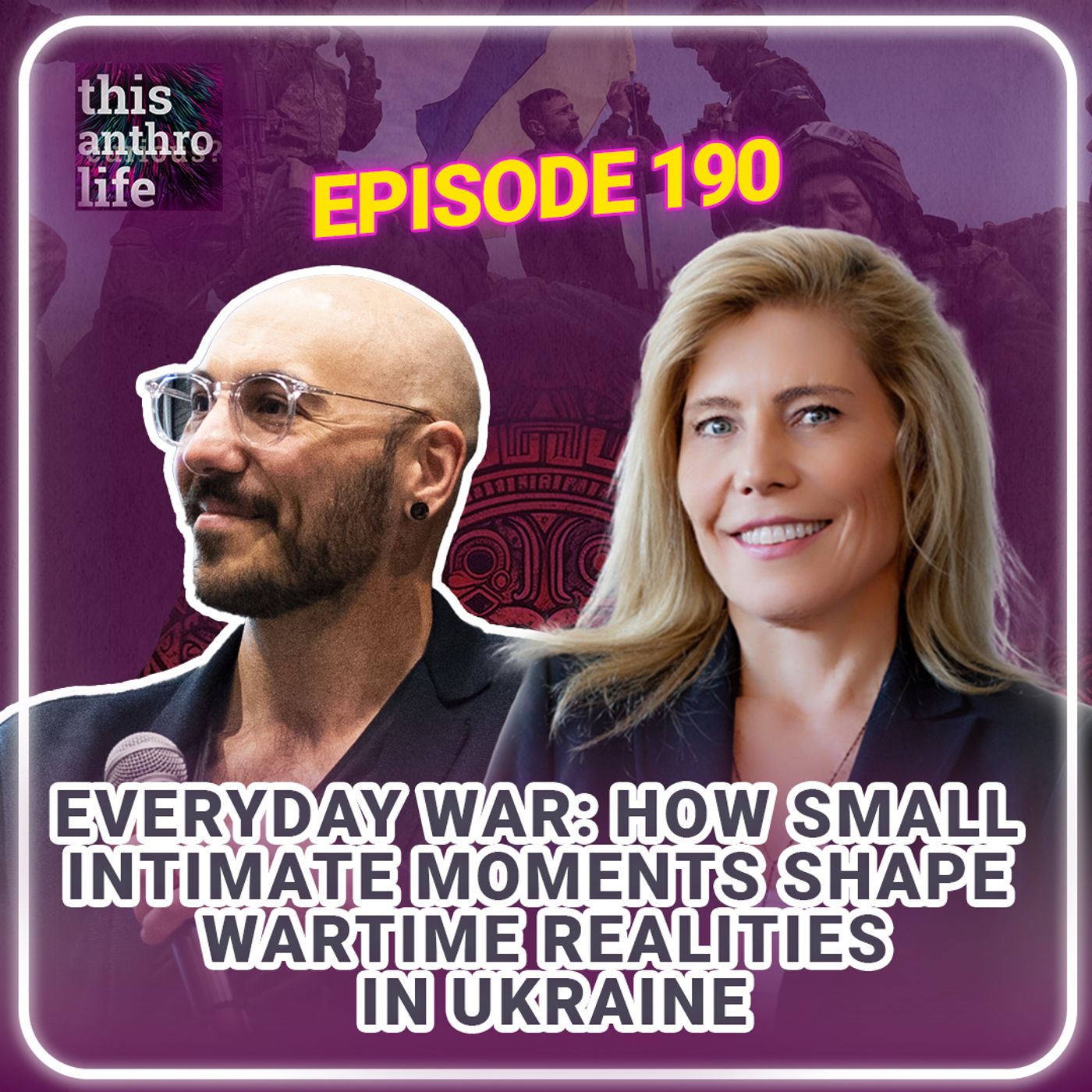
Everyday War: How Small Intimate Moments Shape Wartime Realities in Ukraine with Greta Uehling
How do civilians strategically engage with conflict while seeking everyday peace? How do power dynamics and asymmetries impact the ability of civilians to strategically engage with conflict while simultaneously seeking everyday peace, and what are the implications of these dynamics for broader peace and stability in war-torn environments?In this episode of This Anthro Life, we explore an insightful discussion with anthropologist Greta Uehling about her ethnographic research on civilians' experiences during the Ukraine conflict. Uehling introduces concepts like "everyday war" and "everyday peace" to examine how civilians strategically navigate and mitigate the effects of war through their interpersonal relationships and actions.The conversation challenges assumptions that war stops everyday life. Through stories of civilians like Alexander supporting her sniper father and "Pasha" finding community after displacement, Uehling demonstrates civilians' agency beyond preconceived notions of victimhood. She also discusses conducting ethical fieldwork in conflict zones and civilians' changing, contextual identities and relationships.Uehling highlights lessons from Ukraine on rebuilding societies relationally after war. The discussion questions how civilians decide which connections to preserve and considers media's role in shaping perspectives. Uehling's work provides valuable insights for understanding civilians' roles below geopolitical narratives and informs further research in wartime environments.Tune in to this episode of This Antro Life to gain nuanced, ground-level insights into civilians' experiences of war that challenge assumptions and inform more holistic approaches to conflict recoveryKey takeaways:Civilians play active roles in war beyond just victims, including as perpetrators, defenders, and community healers.Ethnographic research can provide nuanced perspectives on civilians' experiences of war that get obscured by other narratives.Concepts like "everyday war" and "everyday peace" show how civilians strategically engage with and seek to mitigate conflict.War impacts interpersonal relationships as civilians make difficult choices about which connections to preserve.Identities and relationships are fluid rather than fixed, changing based on one's environment and politicization.Zombification by restricted media shapes how civilians understand the conflict.Fieldwork in conflicts requires prioritizing civilians' well-being over eliciting trauma through interviews.Participant observation and embodied experiences can teach as much as direct questioning.Anthropology provides lessons for relationally rebuilding societies divided by war.Civilians deserve recognition as protagonists central to how wars unfold.Timestamps:0:04:20 - Discussion of the concept of "everyday war" and how it challenges assumptions about civilian life stopping during conflict0:11:21 - Choosing the title "Everyday War" to examine civilian life at a deeper level0:15:21 - Story of "eager" and how war impacted his interpersonal relationships0:18:34 - Exploring how politics shaped whether civilians maintained connections0:23:59 - Lessons on conducting ethical fieldwork like prioritizing anonymity0:31:45 - Story of "Pasha" finding community support after displacement0:36:12 - Role of "everyday peace" in mitigating conflict through preserving relationships0:41:24 - Discussion of how war impacts interpersonal relationships0:49:44 - Discussion of challenges of fieldwork in conflict zones0:56:19 - Discussion of civilians as central to how wars unfold1:00:45 - Example of collective, nature-based approaches to conflict recoveryAbout This Anthro Life This Anthro Life is a thought-provoking podcast that explores the human side of technology, culture, and business. Hosted by Adam Gamwell, we unravel fascinating narratives and connect them to the wider context of our lives. Tune in to https://thisanthrolife.org and subscribe to our Substack at https://thisanthrolife.substack.com for more captivating episodes and engaging content.Connect with Greta UehlingPurchase Everyday War through TAL’s Bookstore Affiliate Link to support independent bookstores, the author and the podcast!Linkedin: https://www.linkedin.com/in/greta-uehling-phd-b9154a2b/ Twitter: https://x.com/uehlingumiched1?s=20 Website: https://gretauehling.com/ Instagram: https://www.instagram.com/greta.uehling/ Connect with This Anthro Life:Instagram: https://www.instagram.com/thisanthrolife/ Facebook: https://www.facebook.com/thisanthrolife LinkedIn: https://www.linkedin.com/company/this-anthro-life-podcast/ This Anthro Life website: https://www.thisanthrolife.org/ Substack blog: https://thisanthrolife.substack.com
01:06:0129/11/2023
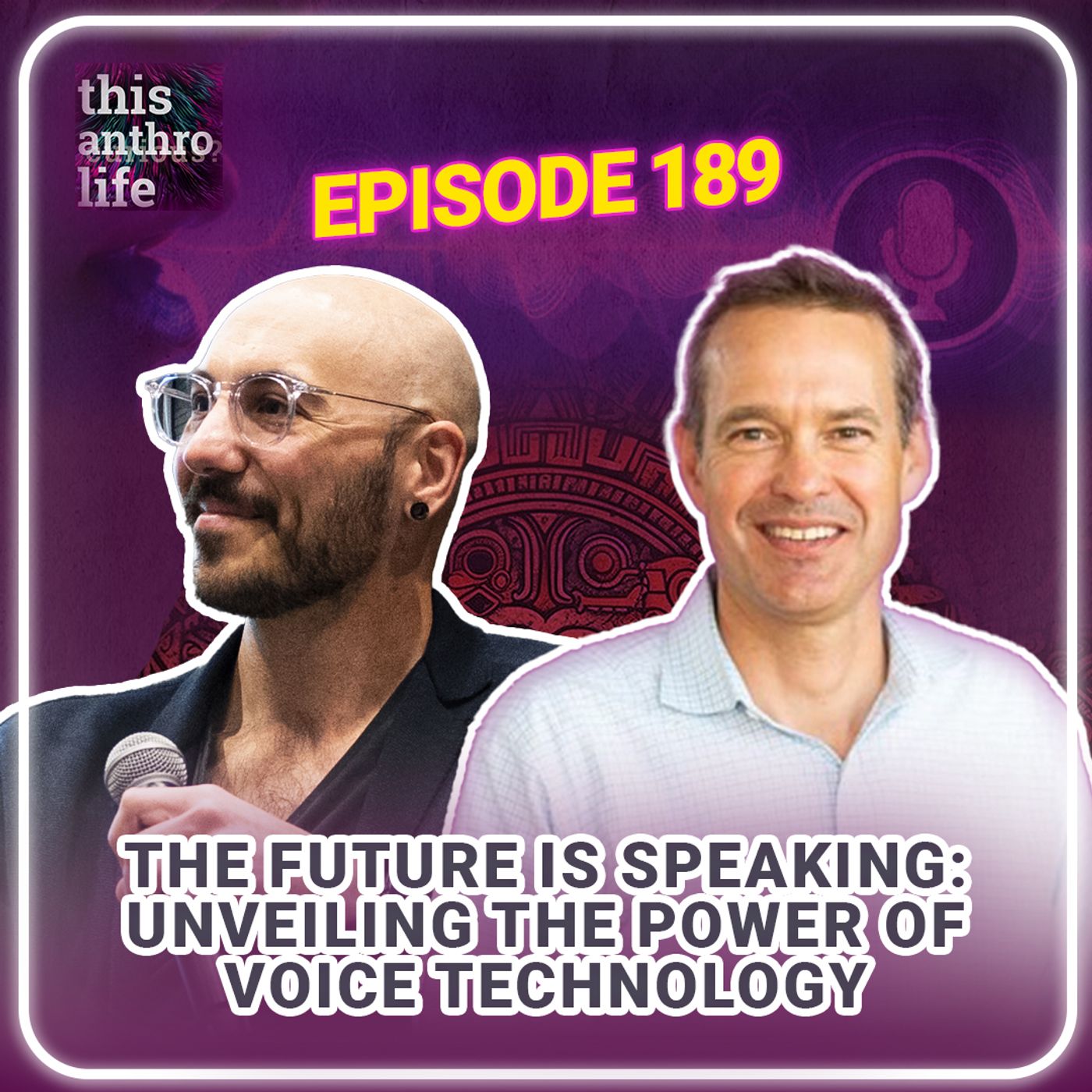
The Future is Speaking: Unveiling the Power of Voice Technology with Tobias Dengel
What new possibilities do you see emerging with voice technology? How might it influence our interactions with businesses and services in the future and what if your voice could transform the way we interact with technology? Imagine a world where your voice can effortlessly interact with devices and transform the way we navigate our surroundings.In this episode of This Anthro Life, we explore the world of future technology with guest Tobias Dengel, a leading expert in digital transformation, and discuss the power of voice technology and its potential to transform how we interact with devices and the world around us. Dengel sheds light on the reasons why integrating voice technology into existing platforms is perceived as a safer approach compared to building entirely new platforms from scratch. He emphasizes the importance of leveraging the familiarity and trust already established with these platforms, enabling a smoother transition for users. Additionally, Dengel delves into the widespread adoption of voice assistants such as Alexa and Siri, highlighting their increasing presence in our daily lives. Furthermore, the discussion extends to the role of voice technology in banking applications, where it plays a crucial role in enhancing security measures and making our lives safer. The exploration of voice technology in this episode showcases its transformative potential and the various ways it is revolutionizing our interactions with devices and services.Tune in to discover Dengel's captivating insights and expertise as we envision the transformative power of voice technology.Key takeaways:Voice technology is evolving and becoming increasingly sophisticated, with the adoption of voice assistants like Alexa and Siri skyrocketing.Adding voice to existing platforms feels safer than creating new ones altogether, as users are already familiar with the platform and trust it.Voice technology solves the problem of faster communication, as humans speak three times faster than they type.The interface of voice technology needs to be redesigned to be more efficient, as listening to machines is slower than reading or interacting with visuals.The more human-like voice assistants become, the less users trust them, as they feel like they are being tricked.Multimodality is important in voice technology, as it allows for a combination of voice, visuals, and other forms of communication to enhance the user experience.Voice technology has applications in various industries, such as law enforcement, warehouses, retail, and safety in industrial settings.The combination of generative AI and conversational AI is where the magic happens in voice technology, allowing for more accurate interpretation and response.Conversational designers will play a crucial role in designing effective voice experiences, considering factors like speed, efficiency, and user preferences.Voice technology has the potential to reshape business processes and models, such as centralized restaurants, telemedicine, and global healthcare access.Timestamps:00:00:07 Voice technology is evolving.00:05:14 Design voice experiences in multimodal.00:09:37 Voice is a powerful interface.00:18:38 Conversational AI and generative AI.00:21:08 Context is crucial for conversation.00:28:31 The blend of generative AI and conversational AI is creating a user experience breakthrough.00:29:15 Voice experiences are becoming multimodal.00:34:06 Voice technology revolutionizes business processes.00:39:03 The future of technology is voice-based.00:43:30 Spread anthropological thinking to audiences.Tobias Dengel is a seasoned technology executive with over 20 years of experience in mobility, digital media, and interactive marketing. He currently holds the position of President at WillowTree, a TELUS International Company, a global leader in digital product design and development. Dengel's expertise and leadership have contributed to WillowTree's continuous growth and recognition as one of America's fastest-growing companies, as listed by Inc. magazine for 11 consecutive years. He is also the author of the book "The Sound of the Future: The Coming Age of AI-Enabled Voice Technology," where he explores the transformative potential of voice technology in various aspects of business and society.About This Anthro Life This Anthro Life is a thought-provoking podcast that explores the human side of technology, culture, and business. Hosted by Adam Gamwell, we unravel fascinating narratives and connect them to the wider context of our lives. Tune in to https://thisanthrolife.org and subscribe to our Substack at https://thisanthrolife.substack.com for more captivating episodes and engaging content.Connect with Tobias DengelLinkedin: https://www.linkedin.com/in/tobiasdengel/ Twitter: https://x.com/TobiasDengel?s=20Website: https://www.tobiasdengel.com/ Facebook: https://www.facebook.com/tobias.denge.7/ Connect with This Anthro Life:Instagram: https://www.instagram.com/thisanthrolife/ Facebook: https://www.facebook.com/thisanthrolife LinkedIn: https://www.linkedin.com/company/this-anthro-life-podcast/ This Anthro Life website: https://www.thisanthrolife.org/ Substack blog: https://thisanthrolife.substack.com
43:4522/11/2023
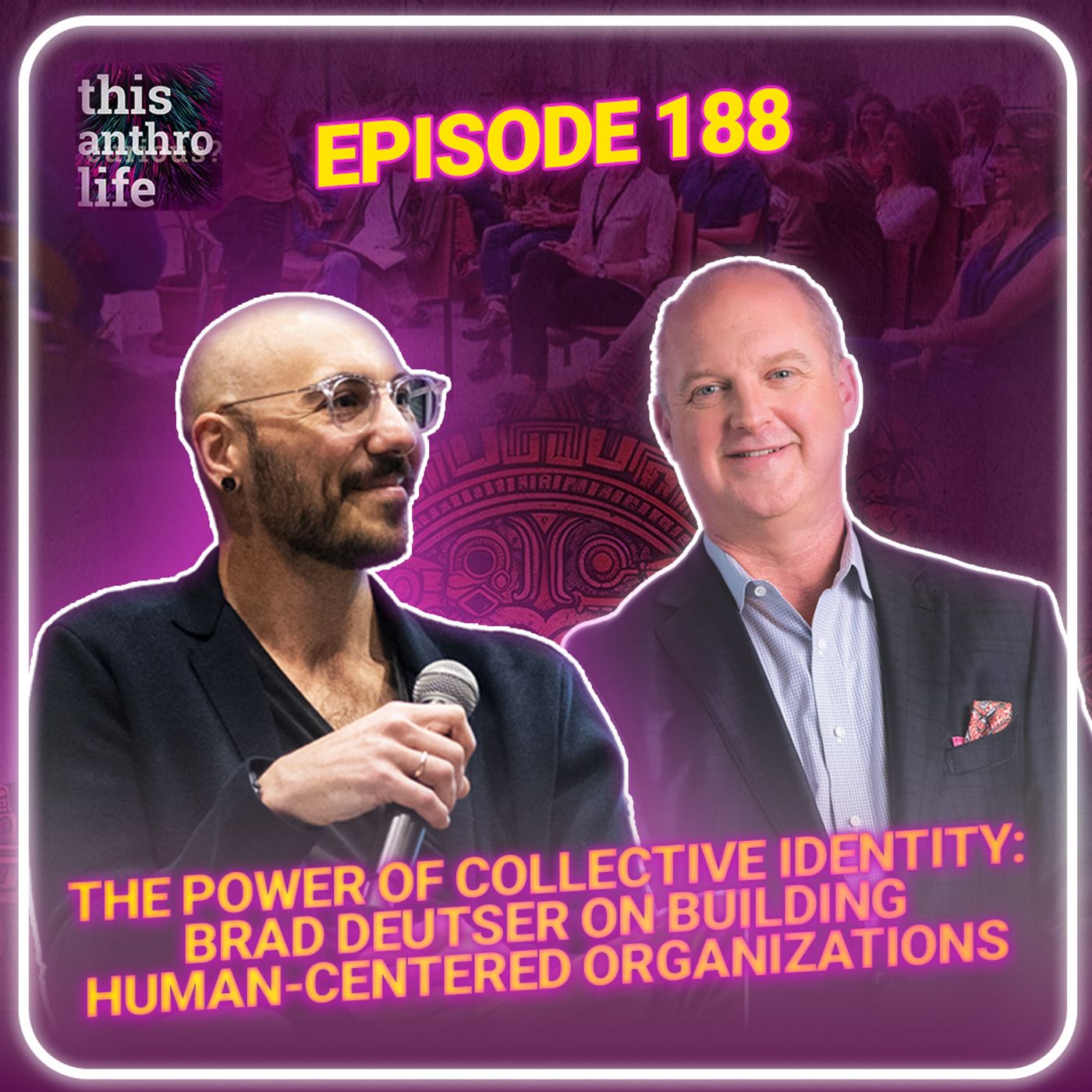
The Power of Collective Identity: Brad Deutser on Building Human-Centered Organizations
What is the importance of belonging in the workplace according to research? And what are some key actions that business leaders can take to create a fantastic work culture? In this episode of This Anthro Life, we delve into the topic of building a stronger sense of belonging and identity within organizations through dimensional leadership.Drawing from his extensive research involving more than 15,000 employees, Brad Deutser highlights the crucial role that belonging plays in fostering engagement, satisfaction, and retention. He unveils the five "Belonging Rules" that emerged from his work: harnessing the power of identity, listening without preconceived labels, prioritizing identity over purpose, challenging established norms, and demanding unwavering honesty. We also tackle the importance of addressing underlying power structures and norms to drive lasting change. A particularly compelling point raised by Deutser is the need to embrace diverse perspectives without necessitating complete agreement, as it is through this acceptance that true belonging can be achieved.Look no further! Our latest episode features an insightful conversation with Brad Deutser on identity, belonging, and fostering a sense of purpose in organizations. Tune in to This Anthro Life podcast for a dose of inspiration today!Key takeaways:Learn how belonging is a fundamental human need and one of the most important factors for employee engagement and performance.Explore how organizations should focus on identity over purpose to strengthen culture and give employees a sense of belonging.Discover why addressing power structures and norms is important for lasting, meaningful change in organizations.Understand how listening without labels and making judgments allows for deeper understanding between people.Consider how challenging norms and standards in a constructive way can spur creativity and innovation.Appreciate how embracing different perspectives without needing to agree creates an environment for belonging.Recognize that transparency and honesty builds trust within an organization.Experience how play, fun, and creative approaches to learning and development increase engagement.Gain insight into how dimensional leadership considers the human elements of change rather than just strategies.Reflect on how small acts of empathy and understanding can make a big difference in people's experience of work.Timestamps:00:00:00 Importance of belonging in organizations.00:06:35 Importance of incorporating play and fun in the workplace.00:10:25 Belonging is crucial in the workplace.00:15:23 Address power dynamics for lasting progress.00:21:46 Listen without labels for understanding.00:25:29 Listen and empathize with others.00:34:40 Choose identity over purpose.00:40:56 Expand your box for creativity.00:43:15 Challenge everything for creative growth.00:47:08 Belonging is essential for organizations.00:55:18 Belonging is essential for growth.00:55:30 "Anthropology is for everyone."Brad Deutser is a trusted counselor, executive coach, and leadership guru for CEOs and top corporate management. He is the bestselling author of "Leading Clarity" and his upcoming book, "BELONGING RULES," focuses on building unity and fostering performance. Deutser's research shows that employees' sense of belonging significantly affects job satisfaction, engagement, and effort. Belonging is more influential than organizational culture and strategy in predicting these outcomes. The book highlights the financial value employees place on belonging in terms of salary and turnover. Deutser and his team surveyed over 15,000 employees across various industries and occupational roles to gather their insights. Through his work, Deutser has impacted top businesses, universities, sports franchises, and cause-based organizations. His expertise lies in creating spaces and leadership capacity for belonging and inclusion.About This Anthro Life This Anthro Life is a thought-provoking podcast that explores the human side of technology, culture, and business. Hosted by Adam Gamwell, we unravel fascinating narratives and connect them to the wider context of our lives. Tune in to https://thisanthrolife.org and subscribe to our Substack at https://thisanthrolife.substack.com for more captivating episodes and engaging content.Connect with Brad DeutserLinkedin: https://www.linkedin.com/in/braddeutser/ Twitter: https://twitter.com/BradDeutser Website: https://deutser.com/ Instagram: https://www.instagram.com/labradford32/ Connect with This Anthro Life:Instagram: https://www.instagram.com/thisanthrolife/Facebook: https://www.facebook.com/thisanthrolife LinkedIn: https://www.linkedin.com/company/this-anthro-life-podcast/ This Anthro Life website: https://www.thisanthrolife.org/ Substack blog: https://thisanthrolife.substack.com
55:3615/11/2023
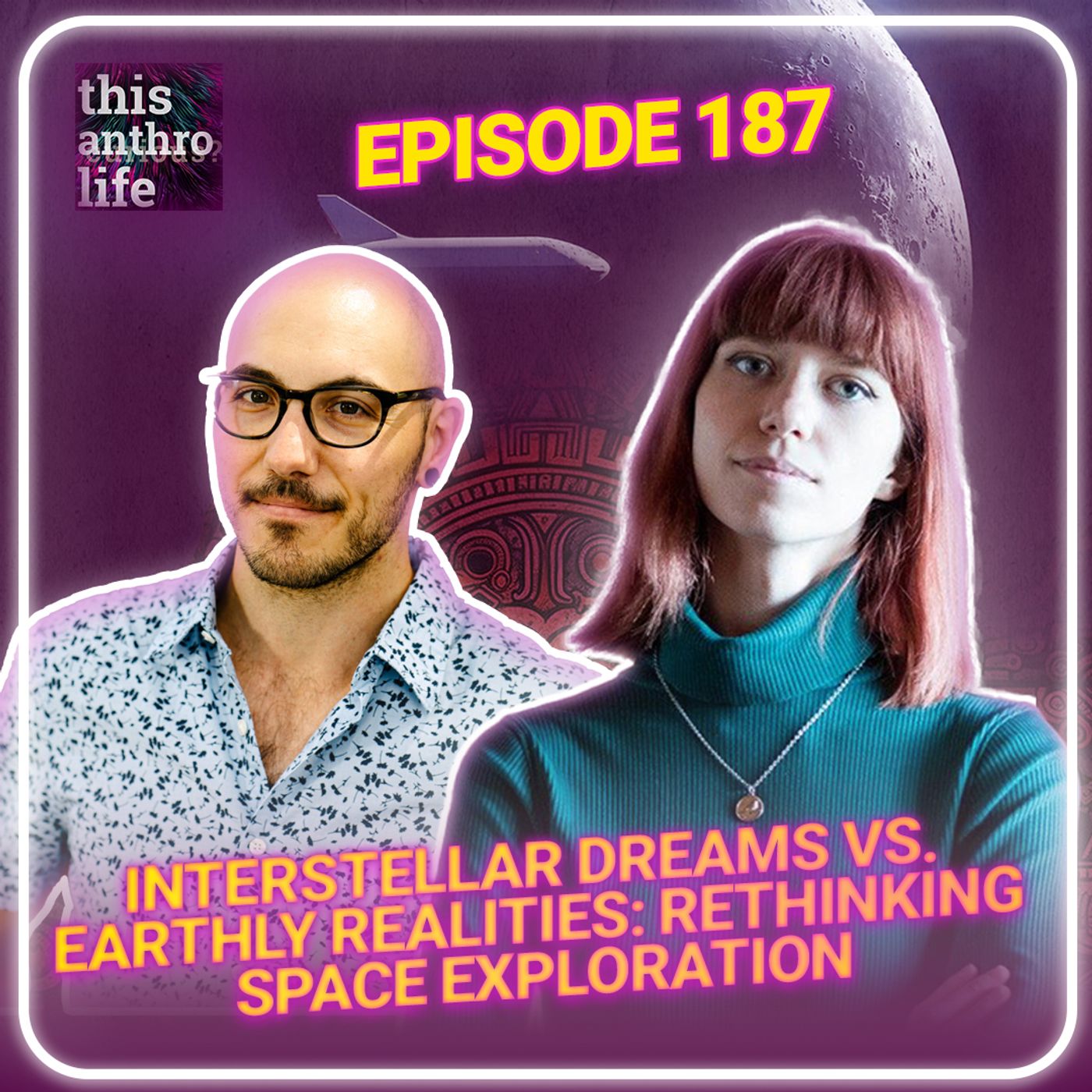
Interstellar Dreams vs. Earthly Realities: Rethinking Space Exploration With Savannah Mandel
Have you ever wondered if reaching for the stars is humanity's most urgent priority? Is it the thrill of exploration, the endless possibilities, or our desire to ensure that our species has a plan B? In this episode of This Anthro Life, we tackle the captivating and fascinating world of Space Exploration and Space Industry with anthropologist Savannah Mandel. Savannah Mandel shares her research and experiences working in the human space exploration industry. She discusses her journey from being a starry-eyed lover of space as a child to developing more critical perspectives as her research progressed. She remains devoted to bringing anthropological research methods to bear, diversifying voices in the field, and furthering public understanding. We also touch on topics like decolonizing space, diversifying voices and perspectives involved in the industry, applying anthropological research to create real-world impact, and studying speculative futures. Join in for another episode that takes you on a journey beyond the stars and back down to Earth.Key takeaways:Learn about space ethics and anthropology by exploring how social scientists are studying the cultural, ethical, and social dimensions of humanity's journey into space.Explore the ethical implications of space exploration by examining important questions about equality, justice, environmental impact, and the effects on life on Earth.Examine the economic forces driving the space industry by examining the role of governments, private companies, billionaires, and other financial stakeholders.Understand the social impact of humanity's journey into space by considering how space exploration changes societies, cultures, and humanity's view of itself.Challenge conventional wisdom about space exploration by questioning assumptions made by governments, corporations, and the media about colonizing space.Question the grand visions of the space industry by analyzing the motivations and assumptions behind proposals for space mining, tourism, and colonization.Ground the study of space within a broader global context by connecting space exploration to issues like inequality, climate change, and social justice on Earth.Consider cultural, social, and political factors influencing space exploration by examining public opinion, cultural representations, and power structures.Discover how anthropology can shape the future of space by advocating for diverse voices and ethical, socially conscious policies.Apply anthropological research to create real-world change by informing decision-making and bringing new perspectives to the space industry.Timestamps:00:00:32 Questioning the relevance of space exploration.00:05:09 Questioning the ethics of research.00:12:09 Limited voices in space exploration.00:19:29 Space exploration should be optional.00:21:48 Importance of discussing space ethics.00:26:48 Anthropologists can be activists.00:32:17 Speculative research informs present realities.00:37:03 Science fiction influences society's future.00:42:00 Include diverse voices in space.00:48:01 Questioning expertise in space exploration.00:57:45 Writing process for aspiring writers.01:00:52 Take writing seriously as a business.01:03:06 Importance of anthropology in space.Savannah Mandel, a passionate anthropologist, delves into the realms of speculation, futurism, and industrial studies. With a pen in one hand and a cup of coffee in the other, she finds herself in her element. Her diverse experiences have shaped her into a versatile writer, both in non-fiction and fiction genres. When she's not engrossed in her research and writing, Savannah indulges in board games and even runs a time travel-themed role-playing game. Her captivating articles can be found in esteemed publications like the Geek Anthropologist, Anthropology Now, Anthropology News, and various online platforms.Excitement fills the air as Savannah's debut book, "Ground Control: Arguments for the End of Human Space Exploration," is set to be released through Chicago Review Press in the spring of 2024. This highly anticipated publication promises to offer thought-provoking insights into the future of human space exploration and its implications.About This Anthro Life This Anthro Life is a thought-provoking podcast that explores the human side of technology, culture, and business. Hosted by Adam Gamwell, we unravel fascinating narratives and connect them to the wider context of our lives.Tune in to https://thisanthrolife.org and subscribe to our Substack at https://thisanthrolife.substack.com for more captivating episodes and engaging content.Connect with Savannah MandelLinkedin: https://www.linkedin.com/in/savannah-mandel-a90a62171/ Twitter: https://twitter.com/TheSpaceSav Facebook: https://www.facebook.com/savannah.lann Website: https://www.savannahmandel.com/ Instagram: https://www.instagram.com/savthespaceanthropologist/ Connect with This Anthro Life:Instagram: https://www.instagram.com/thisanthrolife/ Facebook: https://www.facebook.com/thisanthrolife LinkedIn: https://www.linkedin.com/company/this-anthro-life-podcast/ This Anthro Life website: https://www.thisanthrolife.org/ Substack blog: https://thisanthrolife.substack.com
01:05:1208/11/2023
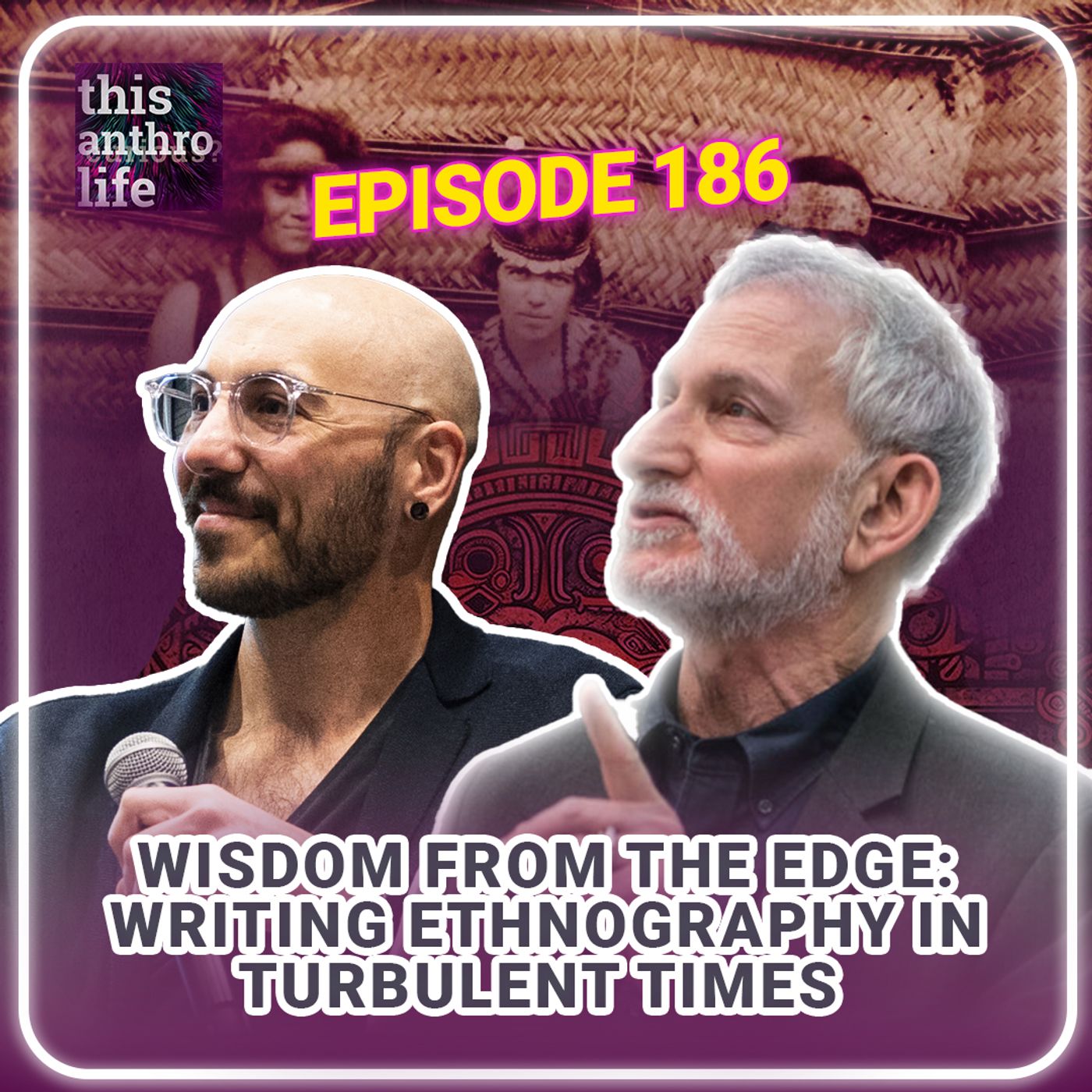
Wisdom from the Edge: Writing Ethnography in Turbulent Times With Paul Stoller
Are you curious about the untapped wisdom that exists outside of traditional academic knowledge? Do you want to learn how stories, dialogue, and sensory experiences can enhance our understanding of the world? In this episode of This Anthro Life, we dive into the fascinating world of anthropology with esteemed anthropologist and author Paul Stoller. Paul shares his fascinating experiences studying healing practices and encountering unexplainable phenomena in Niger. We delve into the importance of storytelling, deep listening, and the need for ethnography to engage all senses. Paul further emphasizes the power of evocative writing, the value of passing down knowledge through generations, and the profound wisdom we can gain from unexpected sources. Tune in to discover the transformative potential of anthropology and how it can shape our understanding of the human condition.Key takeaways:Learn how immersive fieldwork pushes boundaries of understanding and challenges preconceptions through lived experiences in other cultures.Explore how storytelling is a core way that cultures transmit knowledge, values, and traditions across generations through oral histories.Discover how "deep listening" goes beyond words to sense meanings through tone, expression, and being to understand another person truly.Immerse yourself in vivid place descriptions that evoke memory and enhance the reader's experience of ethnographic scenes.Develop your skills in bringing field research to life through techniques like constructing compelling characters and authentic dialogue.Appreciate how wisdom exists in unexpected places beyond academic frameworks through the practical knowledge of indigenous elders.Understand how long-term relationships in the field unlock hidden dimensions of cultural knowledge only revealed through deep trust over time.Key Topics of this Podcast:00:01:30 Wisdom lies beyond comprehension.00:09:18 Ethnography helps understand troubled times.00:10:11 Lack of social trust and disrespect for nature have consequences.00:17:45 Indigenous wisdom is valuable.00:21:17 Writing ethnography with vivid descriptions.00:29:39 Deep listening enhances storytelling experience.00:32:06 Storytelling connects and reveals humanity.00:36:42 Ethnography's unique value proposition.00:41:03 Ethnography preserves and passes knowledge.00:44:02 Embrace vulnerability for deeper wisdom.00:47:33. Embrace sensory approach to engage.Our incredible guest, Paul Stoller, is an anthropologist who has spent years conducting fieldwork in West Niger. Through his experiences as an apprentice to healers in the region, Stoller has conducted anthropological research in West Africa for over 30 years, focusing on Songhai religion and spirit possession. Since 1992, he has also studied West African immigrants in New York City, exploring informal economies and immigration politics. Stoller has published 11 books, including ethnographies, biographies, memoirs, and novels. As a custodian of wisdom from the edge, Stoller emphasizes the importance of listening to knowledge and learning from it. With his unique perspective, he offers invaluable insights into the human condition, social relations, and the preservation of cultural heritage.About This Anthro Life: This Anthro Life is a thought-provoking podcast that explores the human side of technology, culture, and business. Hosted by Adam Gamwell, we unravel fascinating narratives and connect them to the wider context of our lives. Tune in to https://thisanthrolife.org and subscribe to our Substack at https://thisanthrolife.substack.com for more captivating episodes and engaging content.Connect with Paul StollerLinkedin: https://www.linkedin.com/in/paul-stoller-0135a57a/ Twitter: https://twitter.com/Sohanci Facebook: https://www.facebook.com/sohanci2/New Book: Wisdom from the Edge (Get it from the TAL Affiliate Bookstore.org and support the show and independent bookstores!) Connect with This Anthro Life:Instagram: https://www.instagram.com/thisanthrolife/ Facebook: https://www.facebook.com/thisanthrolife LinkedIn: https://www.linkedin.com/company/this-anthro-life-podcast/ This Anthro Life website: https://www.thisanthrolife.org/ Substack blog: https://thisanthrolife.substack.com
48:4201/11/2023

From Automation to Revolution: Exploring the Future of Conversational AI
Did you know that conversation, one of the oldest human technologies, is reshaping the future of how we interact with machines? We’re not talking Siri or Alexa here, but conversational AI, interfaces anyone can create and hyper automation that links together our intentions, tools and technologies. Join us in this episode of This Anthro Life as we delve into the fascinating world of conversational AI, hyper automation and composable software systems with the brilliant mind of User Experience (UX) pioneer Robb Wilson. Discover why embracing conversation and removing the barriers of complex software interfaces might just be the key to unlocking new opportunities and improved outcomes in the digital age.In this thought-provoking conversation, we explore the potential shift away from antiquated software interfaces and the exciting possibilities that conversational AI brings. From the potential of no-code approaches and decentralized business models to the interconnectedness of user experience, customer experience, and employee experience, we provide fresh insights on how automation can evolve how we work, interact with technology, elevate customer service, and foster creativity.Key takeaways:Learn how to create your own skills ecosystem and embrace a no-code approach to building AI interfaces.Understand the potential of conversational UI to revolutionize how we interact with technology.Explore the impact of hyper automation on customer service experiences and employee creativity.Conversational AI and hyper-automation could transform jobs by automating routine tasks and freeing up humans for more creative work.Decentralized organizations and composable UIs that allow access to all software through natural language could reshape business models.Total experience design must consider both customer and employee experiences to be effective.Responsible development of conversational AI could help create more empowering technologies.Automation provides the opportunity for humans to engage in more meaningful social interactions.The future of work and business will likely involve a blend of human creativity and machine automation.Our insightful guest, Robb Wilson, brings a wealth of expertise on hyper automation and composable systems. As the founder of OneReach.ai, a company specializing in creating tools for companies to build their own Alexa-like ecosystems, Robb understands the power and potential of AI in transforming industries. Get ready to be inspired and informed by his insights!Key Topics of this Podcast:00:00:23 The future of technology is conversational.00:06:06 Relaxation and space foster creativity.00:09:42 Humans can adapt and find value in automation.00:14:58 Decentralization is the future.00:22:26 Automation creates space for connection.00:27:30 Total experience is transformative.00:30:26 Employee-first approach in business.00:35:15 Revolutionizing technology through conversational interfaces.00:41:00 The future of software interfaces.00:44:36 Explainability is crucial for trust.00:55:06 Machines should make human-like mistakes.01:01:11 Unlocking software through conversational UI.01:06:37 Automation enhances customer experiences.About This Anthro Life This Anthro Life is a thought-provoking podcast that explores the human side of technology, culture, and business. Hosted by Adam Gamwell, we unravel fascinating narratives and connect them to the wider context of our lives. Tune in to https://thisanthrolife.org and subscribe to our Substack at https://thisanthrolife.substack.com for more captivating episodes and engaging content.Connect with Robb.WilsonLinkedin: https://www.linkedin.com/in/invisiblemachines/ Website: https://onereach.ai/ Connect with This Anthro Life:Instagram: https://www.instagram.com/thisanthrolife/ Facebook: https://www.facebook.com/thisanthrolife LinkedIn: https://www.linkedin.com/company/this-anthro-life-podcast/ This Anthro Life website: https://www.thisanthrolife.org/ Substack blog: https://thisanthrolife.substack.com
01:08:2625/10/2023
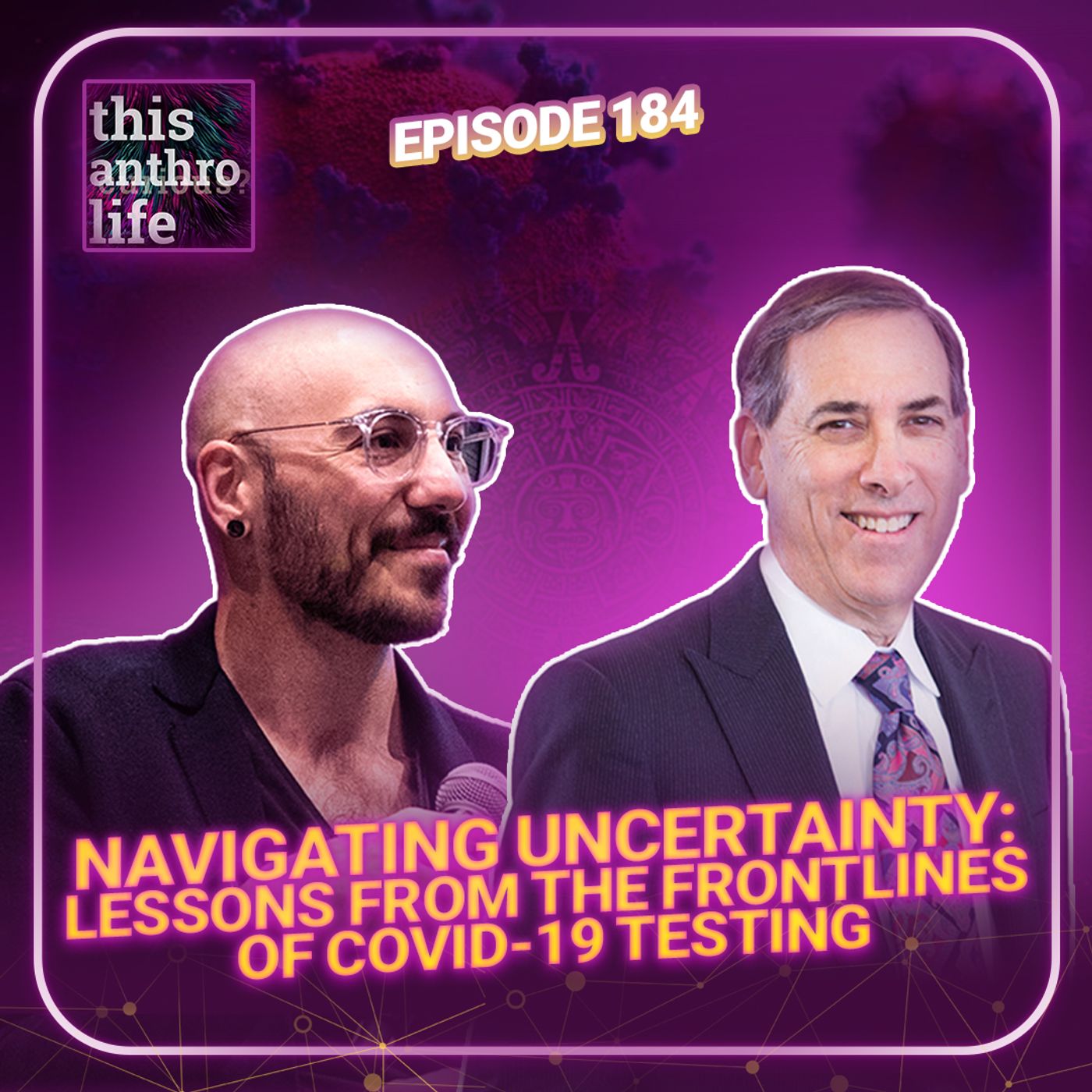
Navigating Uncertainty: Lessons from the Frontlines of COVID-19 Testing
What can we learn from our handling of the COVID-19 pandemic to better prepare for future crises? Why is it crucial to build a diagnostic infrastructure for future crises? And what lessons can we learn from the collaboration between healthcare providers and the sports industry during the COVID-19 pandemic? In this fascinating episode of This Anthro Life podcast, surgeon-turned-CEO Jon Cohen shares the story of how he and his team led the nation in the creation of diagnostics testing for COVID-19. Jon has been at the forefront of the COVID-19 testing efforts, working tirelessly to build a diagnostic infrastructure and tackle the challenges posed by the pandemic. From setting up drive-through testing centers to providing testing for the NFL and the NBA, Jon has been involved in a wide range of testing initiatives. Join us as we explore the critical importance of testing during a crisis, the logistics involved, and the leadership lessons learned along the way.Bringing us to today, Jon highlights the immense need for mental health support and the limitations of traditional therapy methods, such as in-person appointments. He mentions that with the rise of telemedicine, individuals can now access mental health services through online platforms, including texting and video calls, at any time and from anywhere. With mental health struggles increasing, he advocates for expanded telemedicine to provide more accessible care. Dr. Jon R. Cohen is a leading healthcare executive with over 30 years of experience growing successful medical companies. As former CEO of BioReference Laboratories, he guided the firm to become a top COVID-19 testing provider during the pandemic. Renowned for his strategic vision and expertise in healthcare policy and technology, Dr. Cohen is currently CEO of Talkspace, a prominent telehealth platform expanding access to mental health services. Based in New York, he continues to drive meaningful improvements in patient care and the digital transformation of healthcare.Key Takeaways:The diagnostic industry is often overlooked and misunderstood, but it plays a crucial role in healthcare, especially during a pandemic.There is a need for better diagnostic infrastructure and coordination at the federal level to prepare for future crises, including dedicated testing centers.Trusting your inner voice and intuition is important in making critical decisions during a crisis. Prioritizing healthcare workers and frontline responders for testing is crucial, but determining who should be tested beyond that can be challenging without clear guidance. Leadership during crises requires making difficult decisions with incomplete information, owning up to mistakes, and prioritizing based on evolving situations.Key Topics of this Podcast:00:02:26 The podcast explores diagnostic laboratories.00:04:39 Unprecedented coordination in COVID response.00:09:22 Drive-thrus revolutionized COVID testing.00:13:29 Public-private partnerships are crucial.00:20:48 Listen to your inner voice.00:23:10 Trusting instincts in decision-making.00:28:08 Prioritizing testing for essential workers.00:36:48 Honesty and transparency in crises.00:41:45 Build a diagnostic infrastructure for future crises.00:47:00 Create a non-permission culture.00:47:56 Non-permission culture fosters effective organizations.About This Anthro Life This Anthro Life is a podcast that explores the ways in which humans interact, adapt, and create meaning within the different cultural contexts they find themselves in. Join host Adam Gamwell and his diverse array of guests as they dive deep into the fascinating world of anthropology, uncovering the hidden stories that shape our lives.Tune in now and find out more about how the lessons learned during the COVID can change the future of diagnostic laboratories. Don’t miss out on this transformative episode of This Anthro Life!Connect with Jon R. CohenLinkedin: https://www.linkedin.com/in/jon-cohen-md/ Website: https://www.talkspace.com/ Connect with This Anthro Life:Instagram: https://www.instagram.com/thisanthrolife/ Facebook: https://www.facebook.com/thisanthrolife LinkedIn: https://www.linkedin.com/company/this-anthro-life-podcast/ This Anthro Life website: https://www.thisanthrolife.org/ Substack blog: https://thisanthrolife.substack.com
53:3918/10/2023

Navigating the Labyrinth of Perception: Wisdom, Language, and Post-Trauma Growth
How does language shape our understanding of experiences? How do we navigate trauma and find growth amidst adversity? Join us in this thought-provoking episode of This Anthro Life as we delve into the power of perception, the importance of emotional intelligence, and the role of our internal GPS in making sense of the world. Our guest, Amrita Subramanian, an esteemed expert in cultural contexts and relationships, sheds light on how language, trauma, and resilience intertwine in our everyday lives. Get ready to challenge conventional wisdom, uncover the hidden depths of grief, and embark on a journey of self-reflection. Amrita SubramanianAmrita Subramanian is a renowned expert in cultural contexts, relationships, and emotional intelligence. With a deep understanding of the complexities of language and identity, Amrita brings a fresh perspective to the podcast, challenging our assumptions and inviting us to explore the depths of our own experiences. As a seasoned speaker, consultant, and teacher, her insights into the human condition are sure to leave a lasting impact.Key Takeaways:Explore the concept of an internal GPS and how it shapes our perception of self, others, and the world.Understand the impact of language in expressing experiences and how it reveals our capabilities and limitations.Navigate the challenges of processing trauma and grief during the ongoing pandemic and learn how to find resilience and growth within.Recognize the importance of cultural contexts and relationships in shaping our understanding of ourselves and the world around us.Uncover the significance of emotional intelligence and self-reflection for mental health and personal development.Key Topics of this Podcast:00:05:34 - The concept of trauma and how it can be both positive and negative.00:13:04 - Language is essential for understanding and exploring the limits of our experiences.00:16:34 - Upgrade your internal GPS.00:23:03 - Gentle self-reflection is essential.00:29:42. - Observe yourself without judgment.00:31:09 - Navigating the complexities of self-reflection.00:39:21 - Trauma can lead to growth.00:41:18 - Resilience leads to post-traumatic growth.00:50:38 - Reflect and question for growth.00:53:21 - Psychological safety is key.00:57:27 - Importance of honoring elders.01:02:12 - Elders should be respected and included.01:09:01 - Importance of self-reflection and self-care.01:12:08 - Language shapes our perception.About This Anthro Life This Anthro Life is a podcast that explores the ways in which humans interact, adapt, and create meaning within the different cultural contexts they find themselves in. Join host Adam Gamwell and his diverse array of guests as they dive deep into the fascinating world of anthropology, uncovering the hidden stories that shape our lives.Tune in now to unlock the secrets of wisdom, language, trauma, and growth in a rapidly changing world. Don’t miss out on this transformative episode of This Anthro Life!Connect with Amrita SubramanianLinkedin: https://www.linkedin.com/in/amrita-v-subramanian-a8687057/ Website: https://growbeyondpain.com/ Connect with This Anthro Life:Instagram: https://www.instagram.com/thisanthrolife/ Facebook: https://www.facebook.com/thisanthrolife LinkedIn: https://www.linkedin.com/company/this-anthro-life-podcast/ This Anthro Life website: https://www.thisanthrolife.org/ Substack blog: https://thisanthrolife.substack.com
01:13:2610/10/2023





